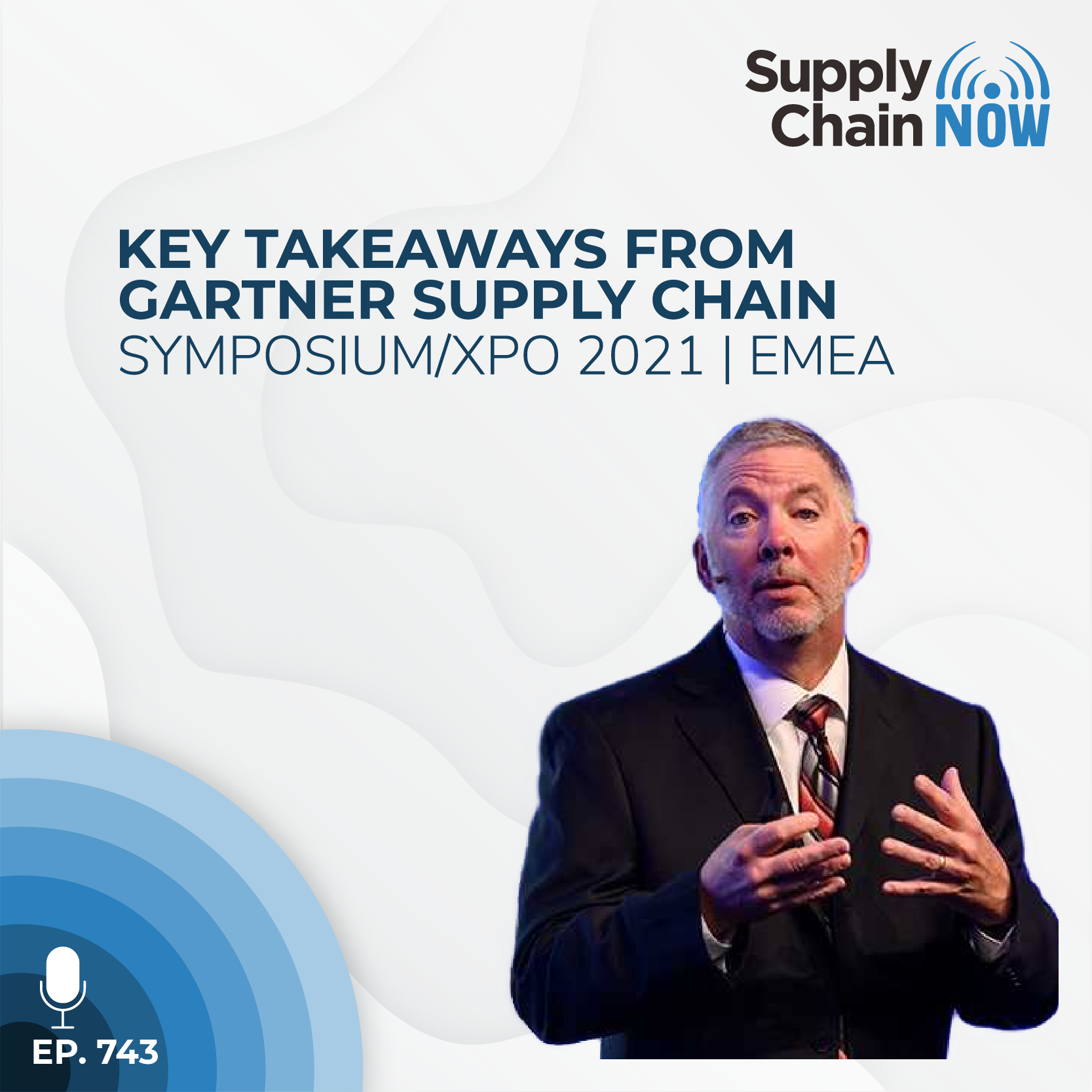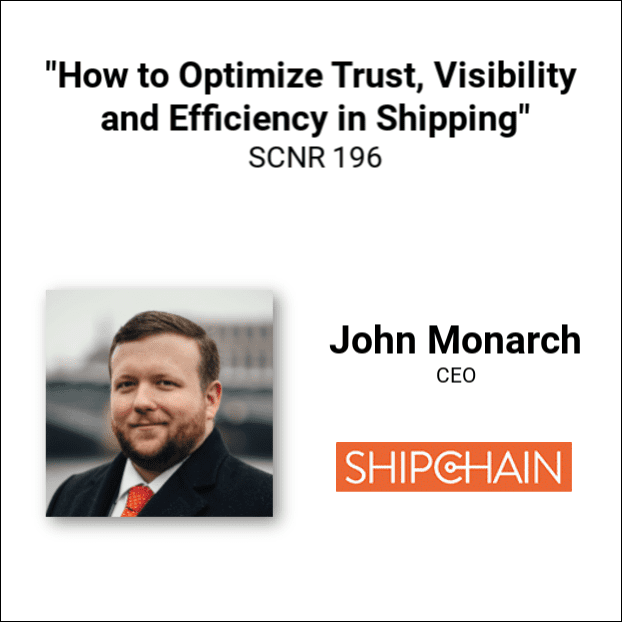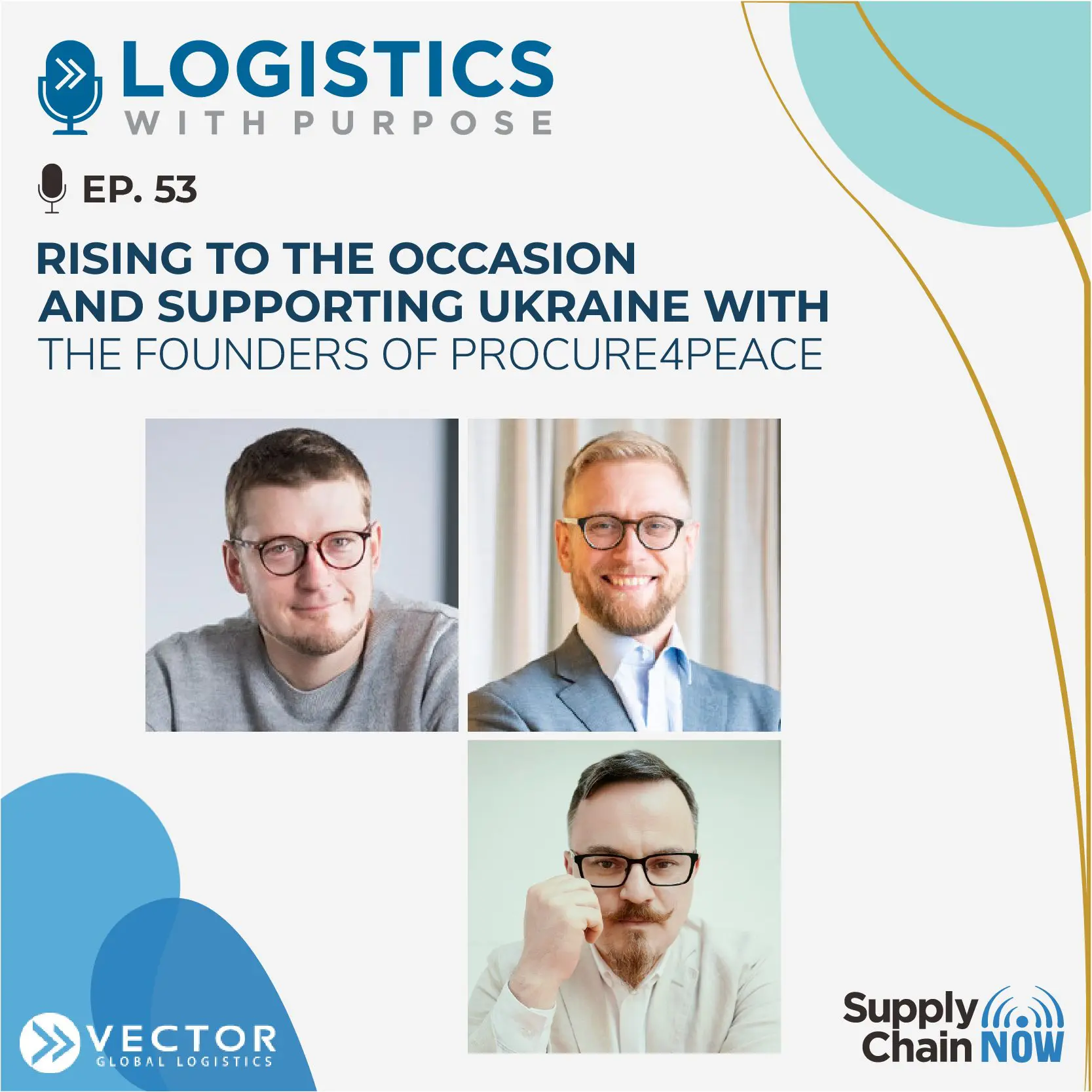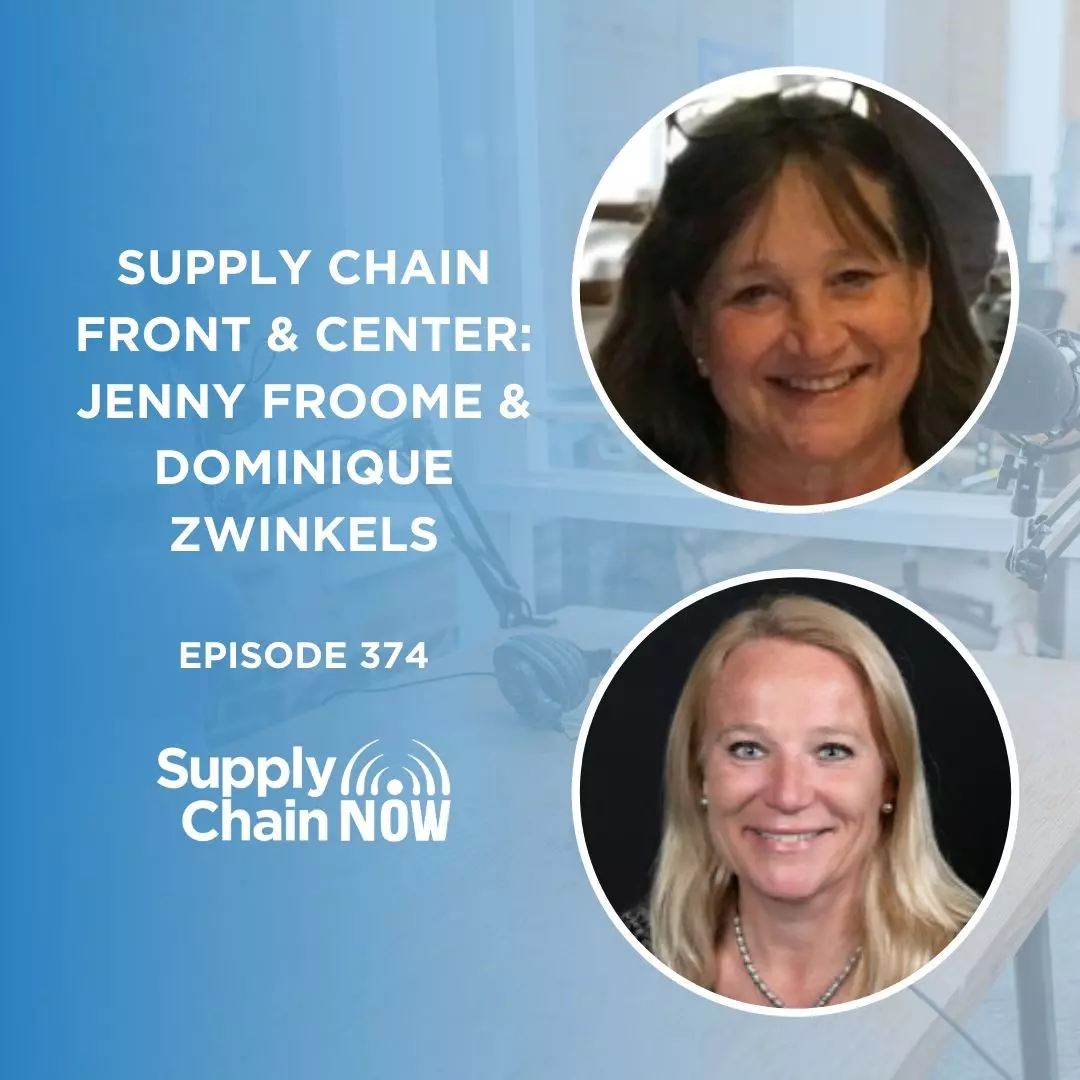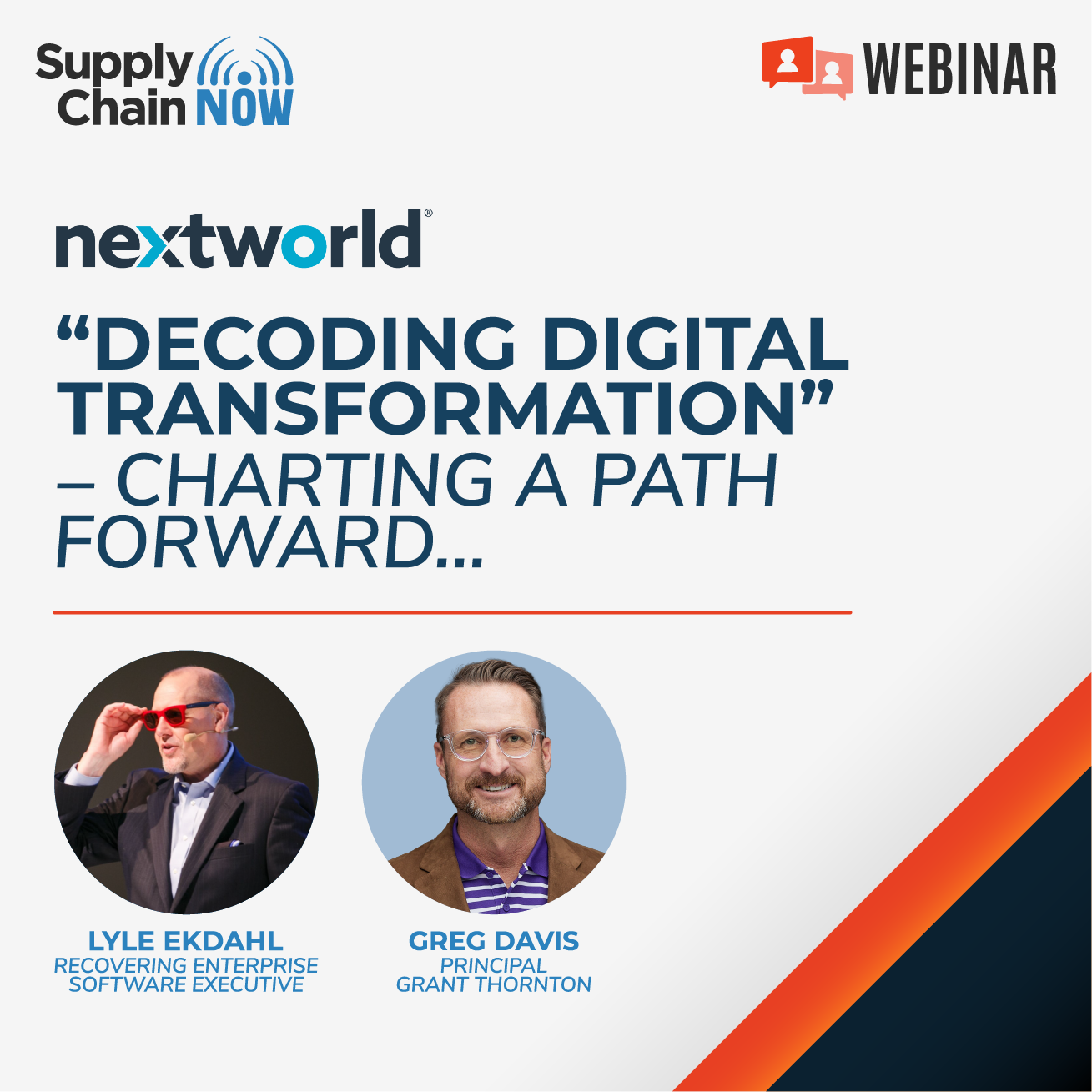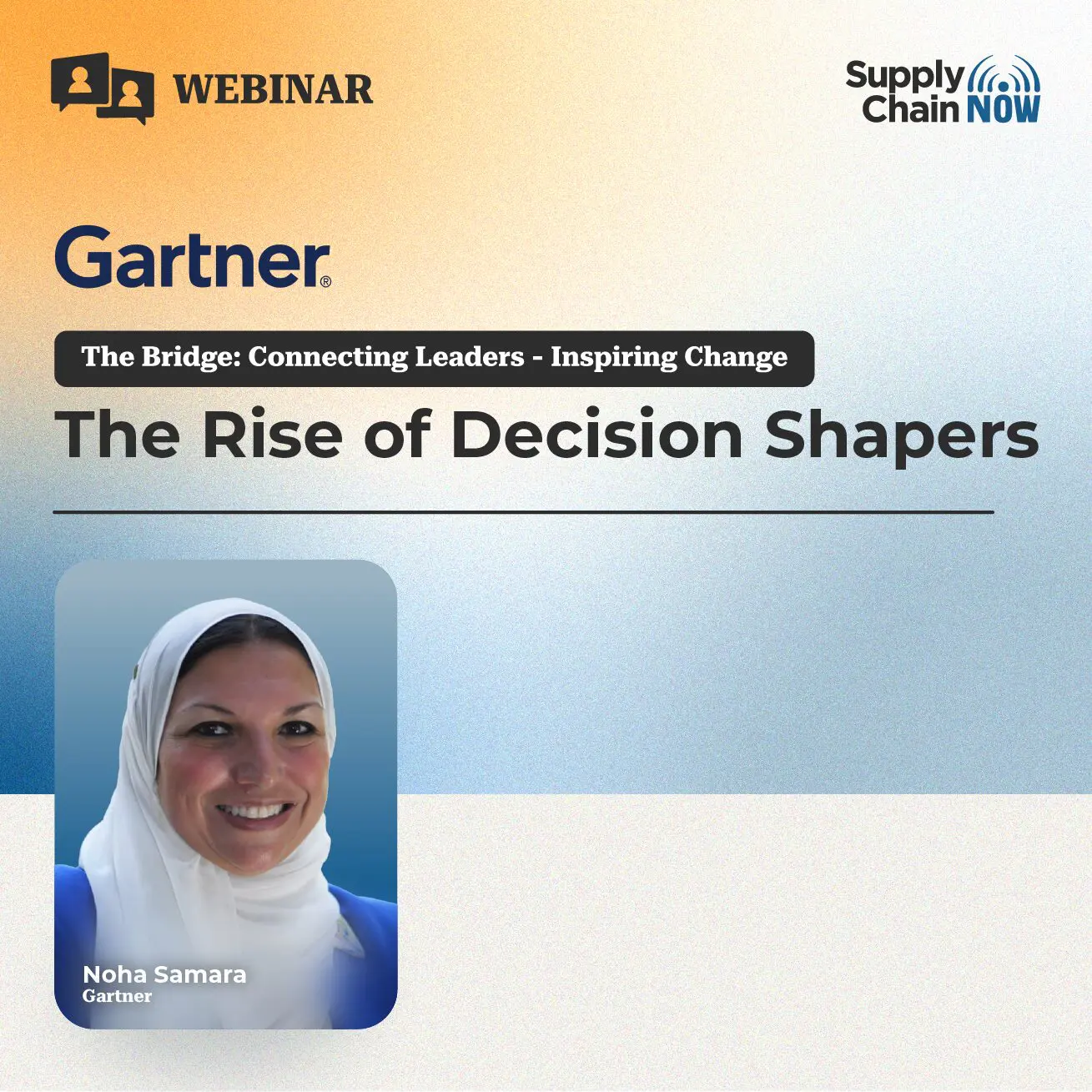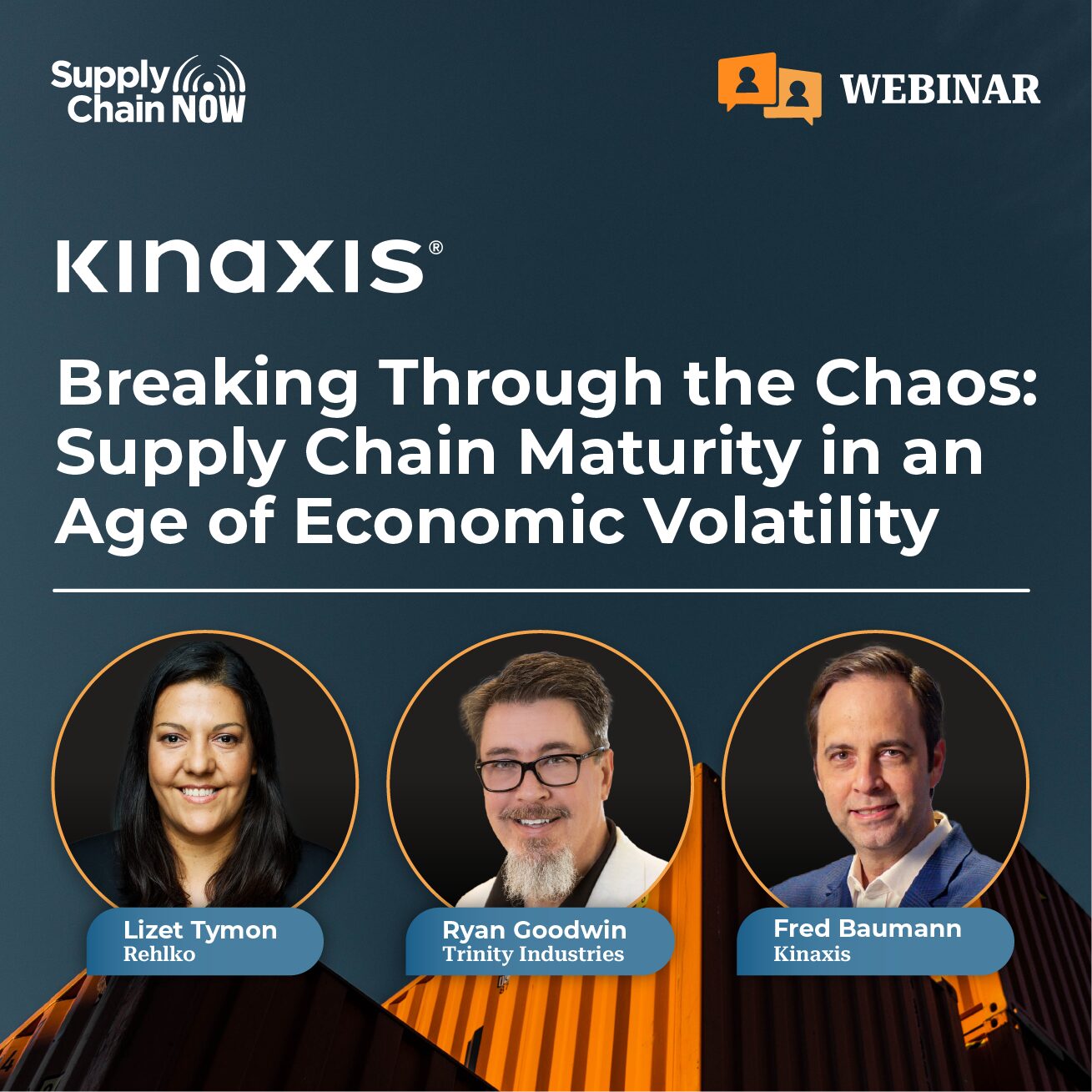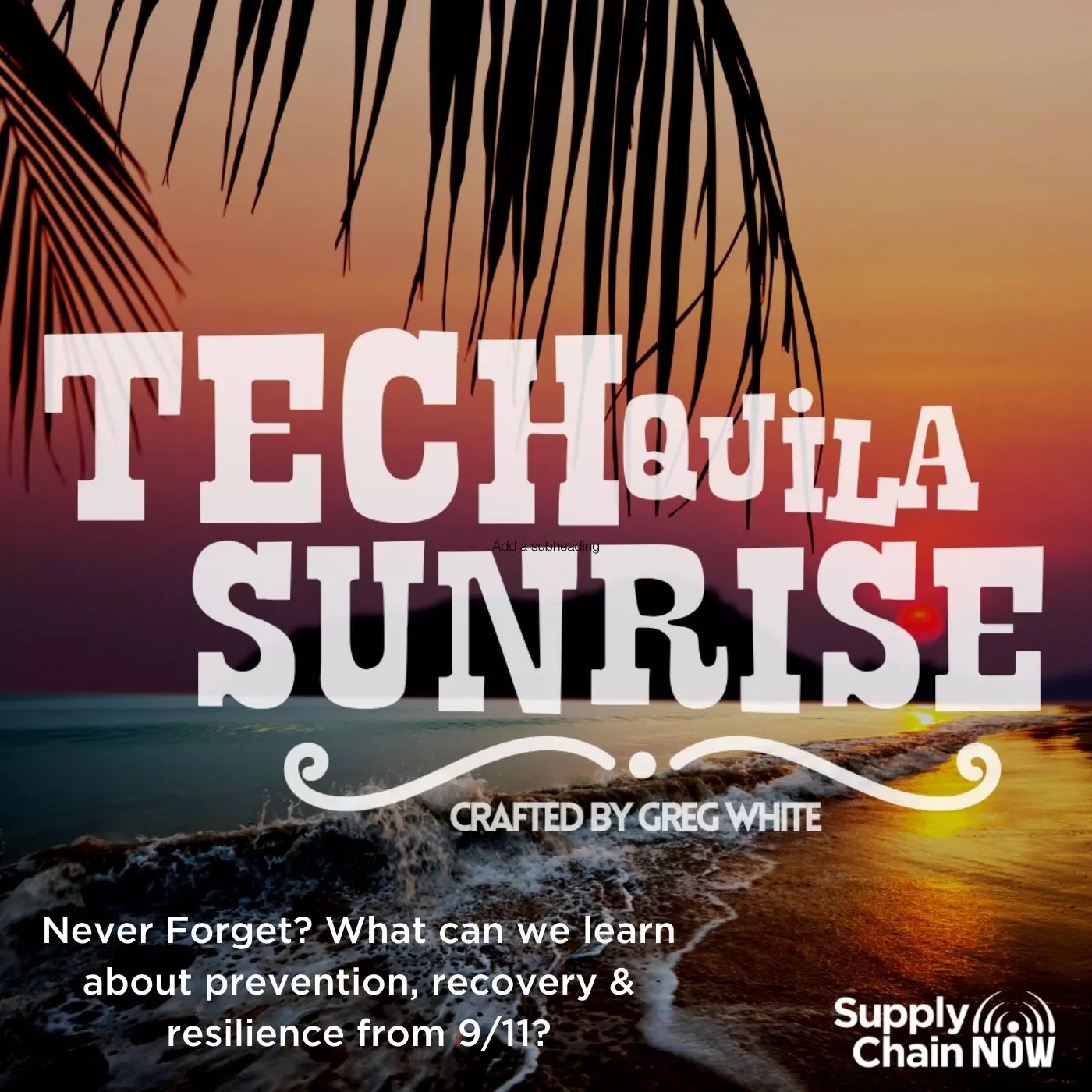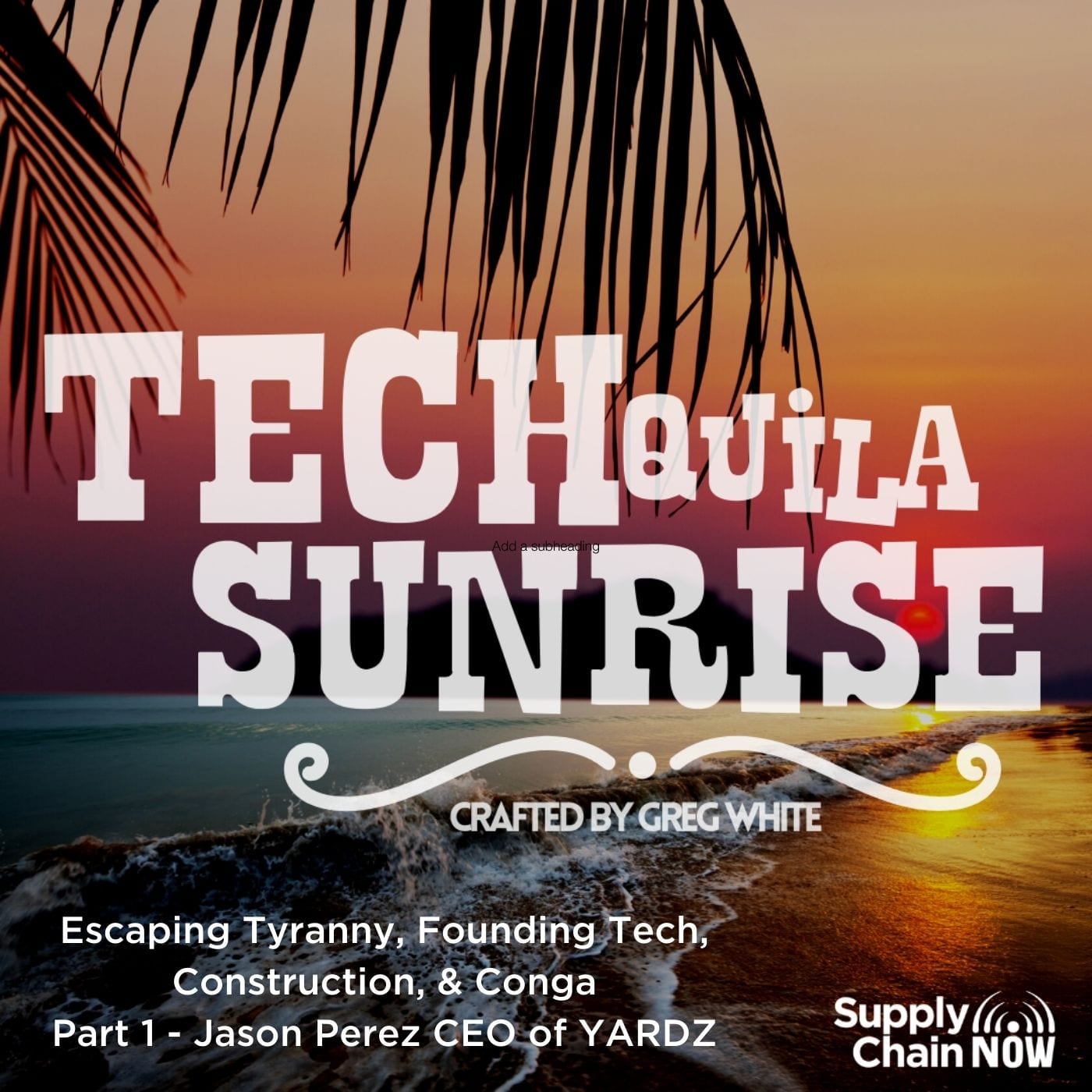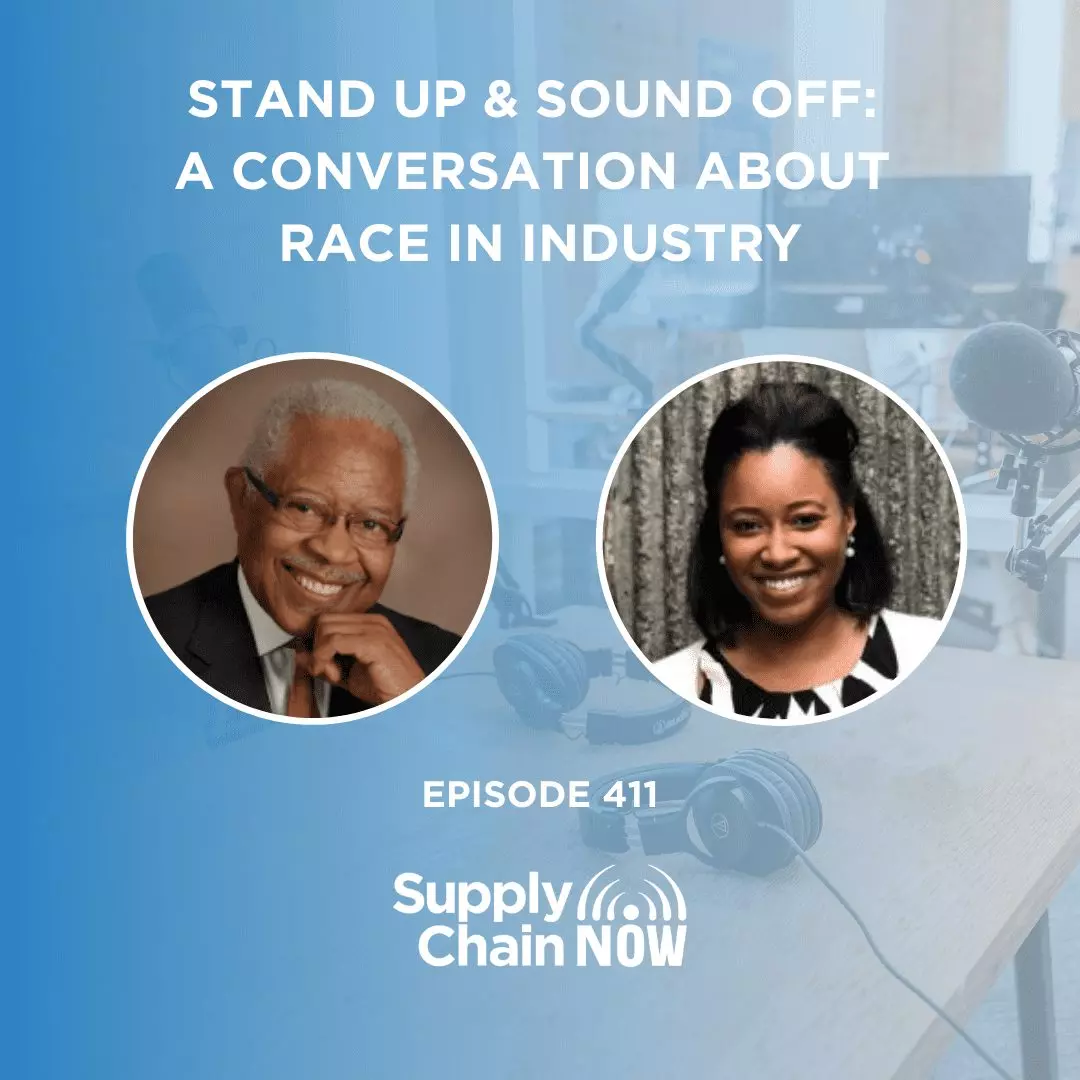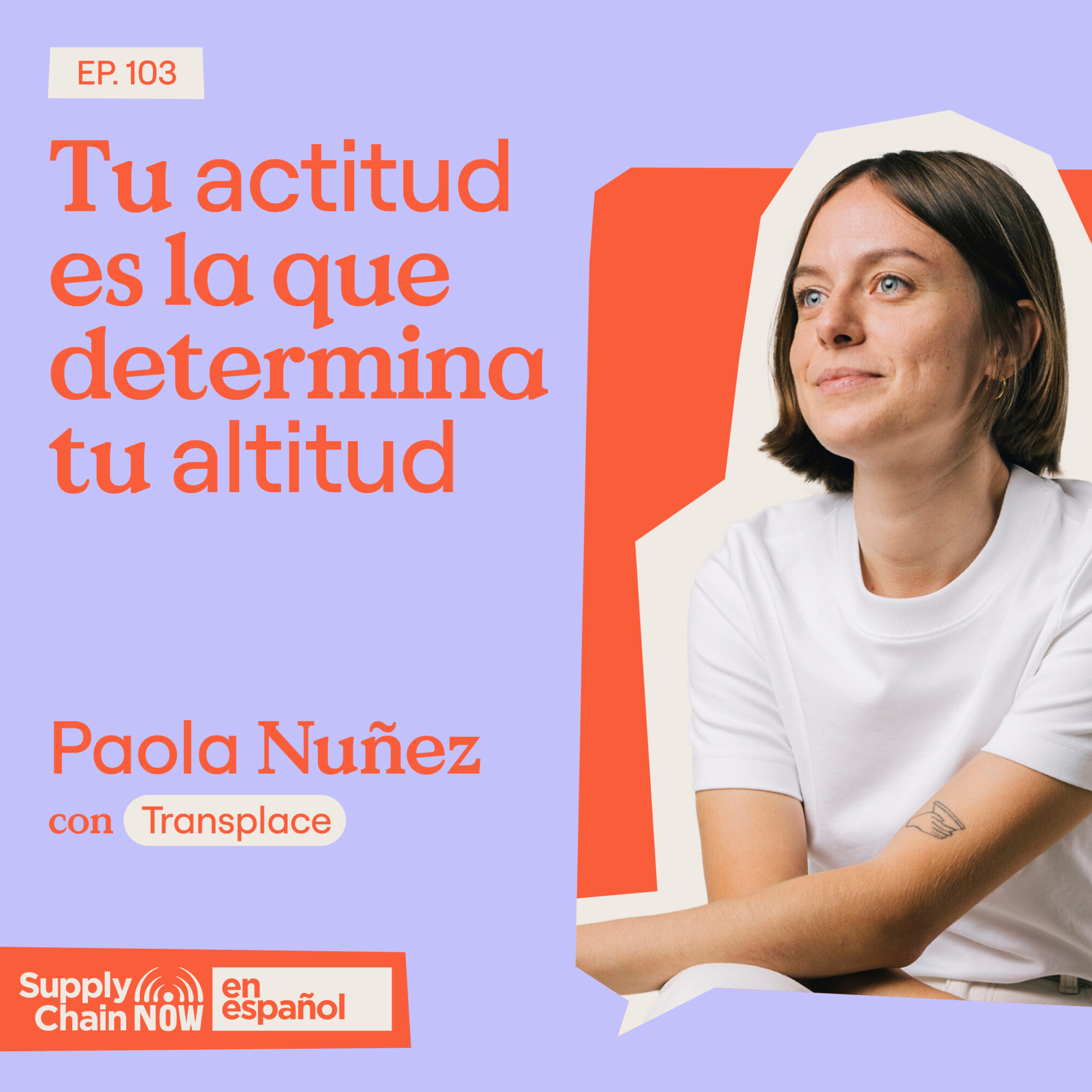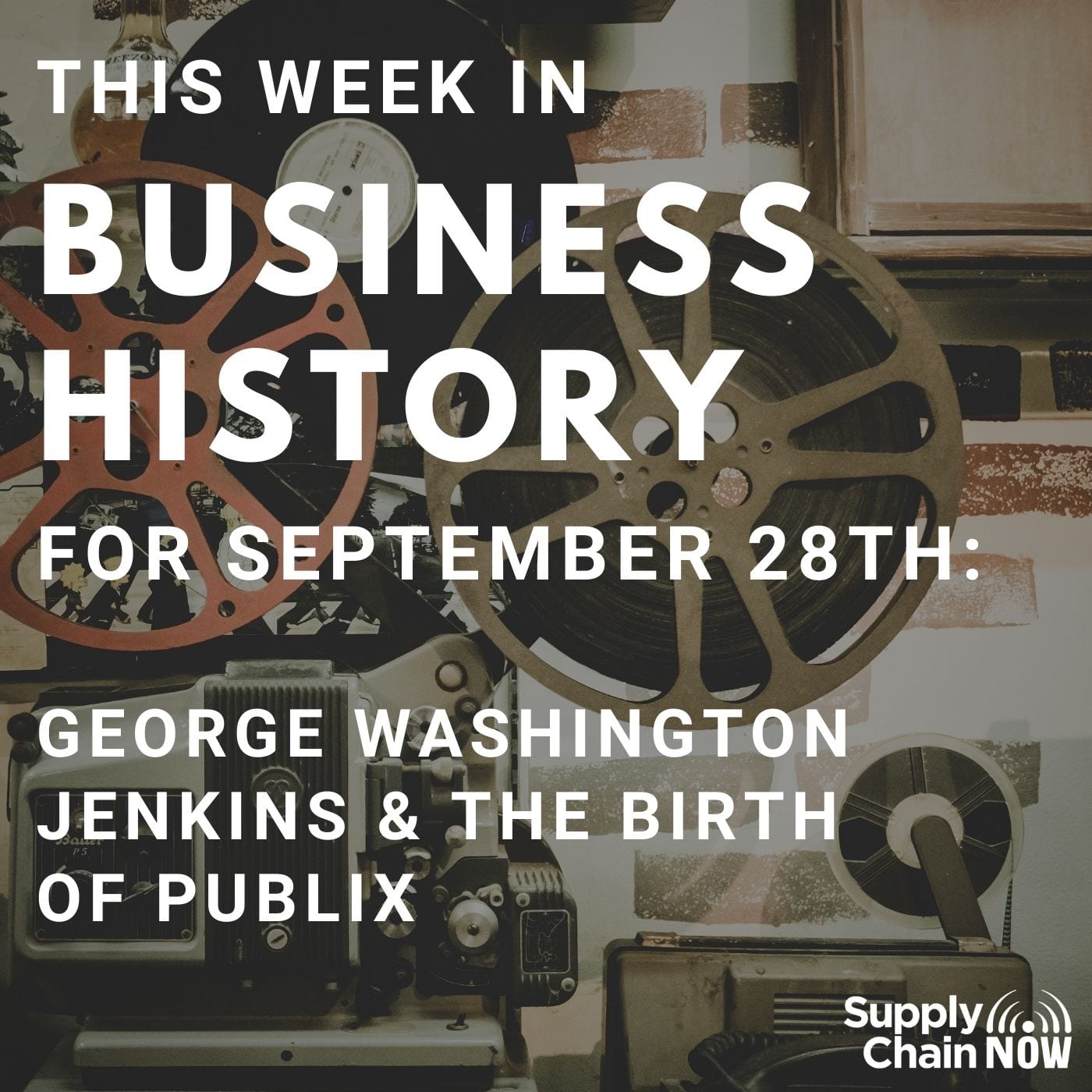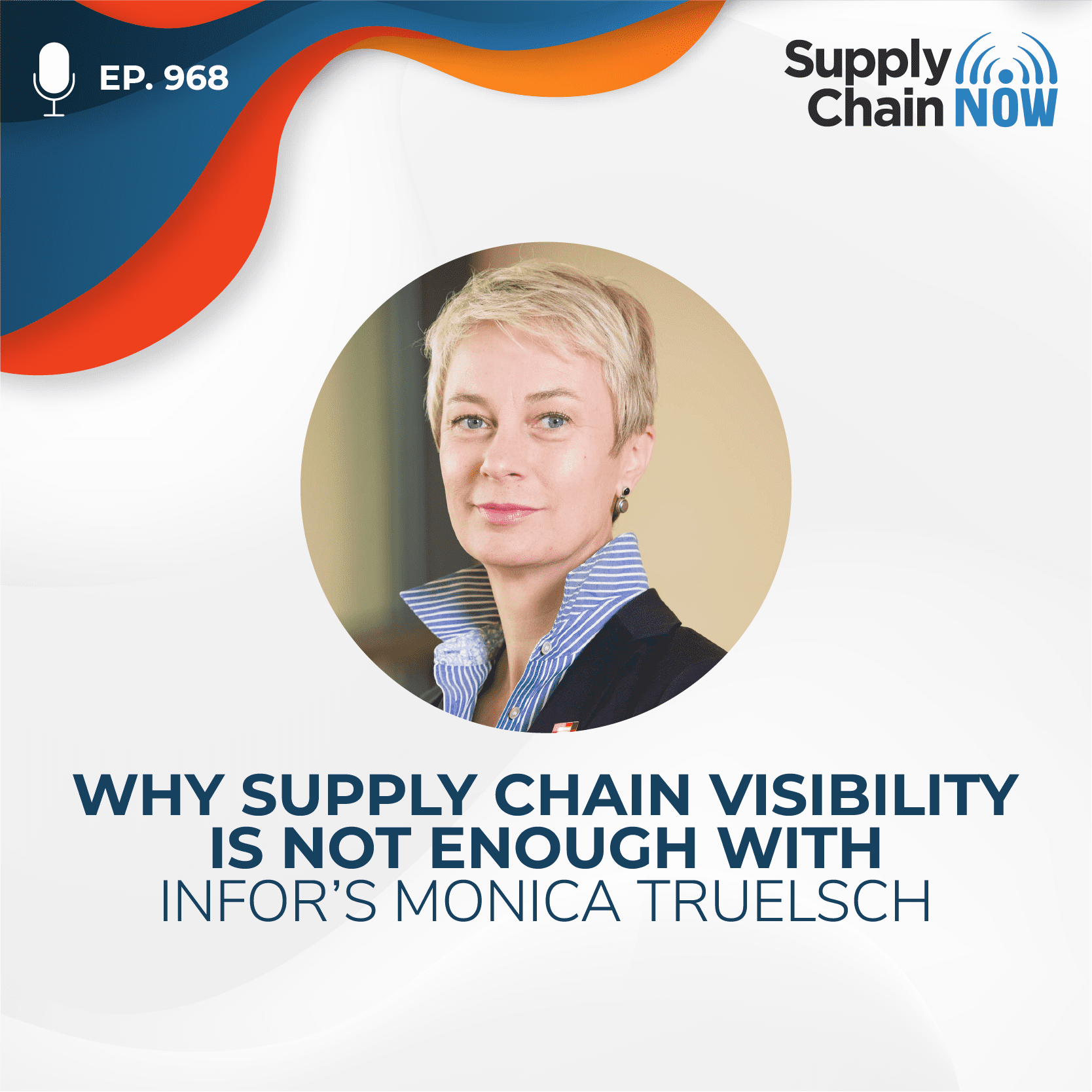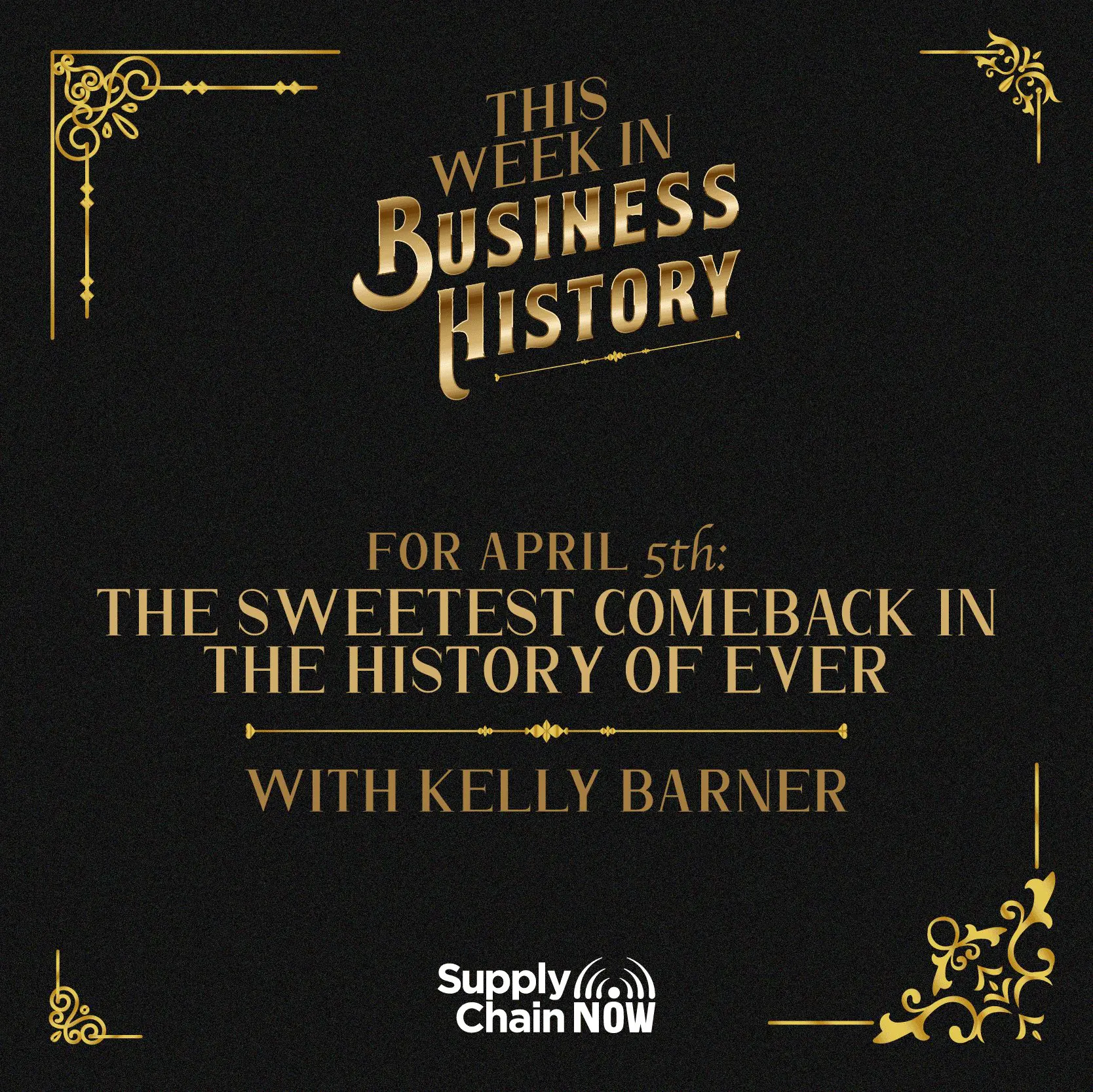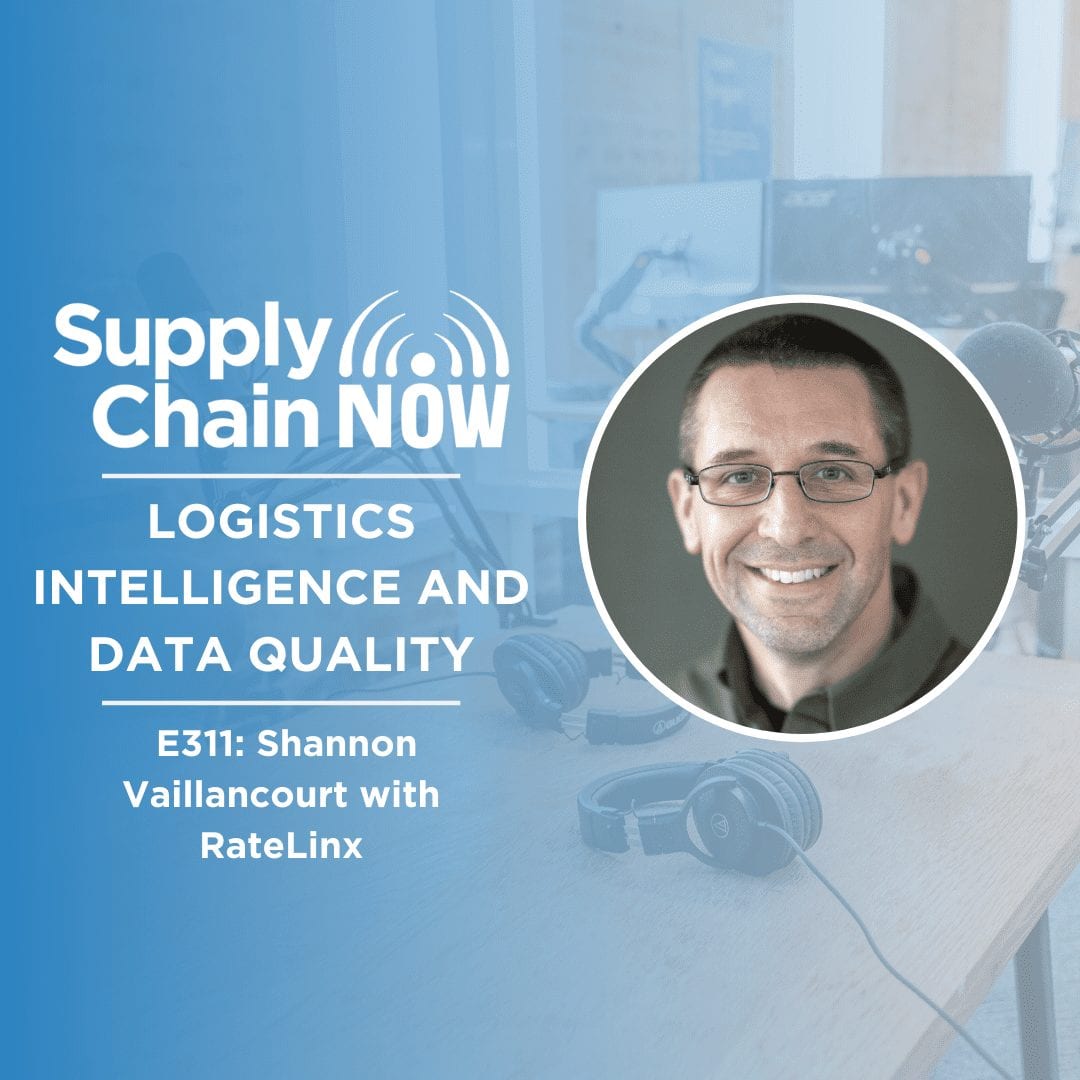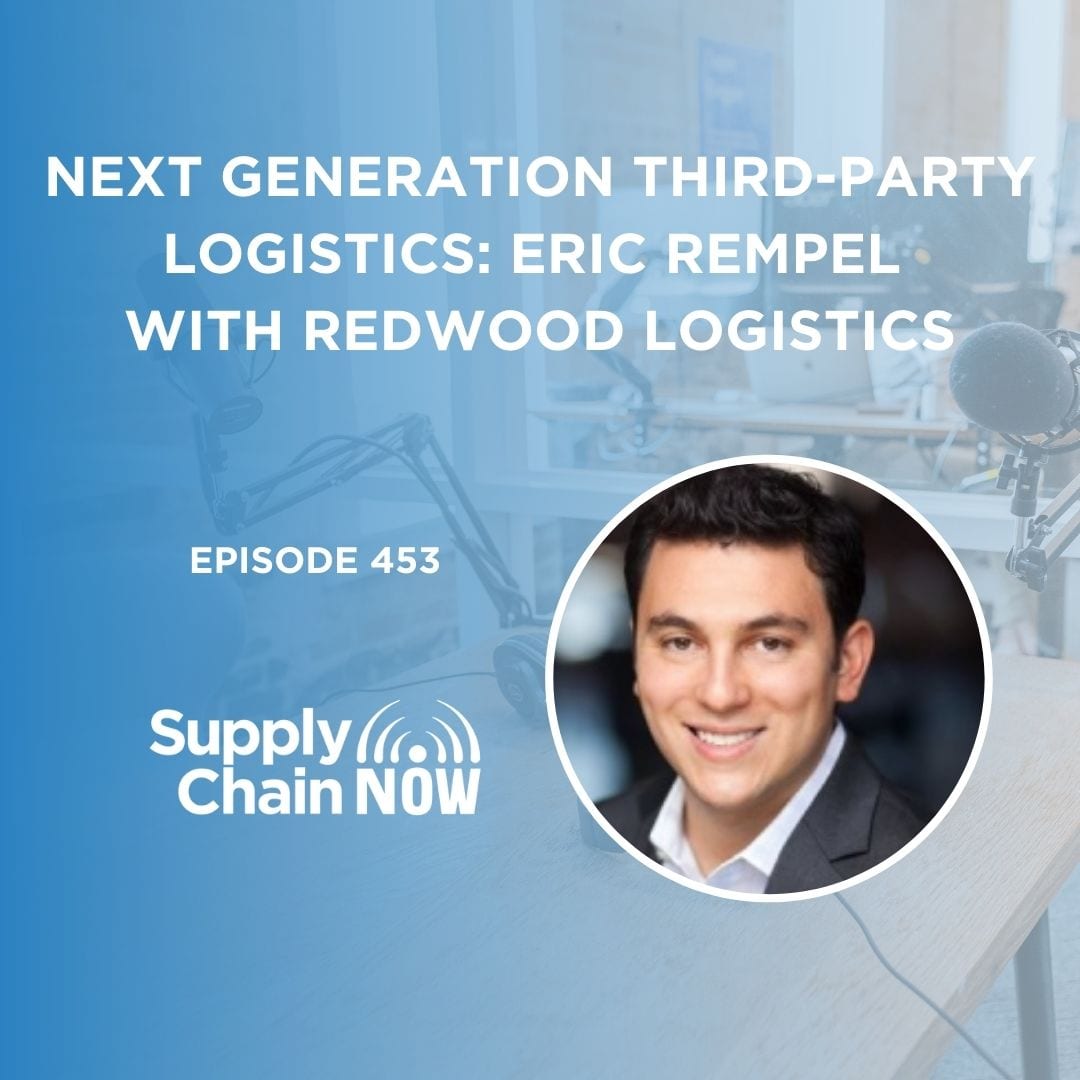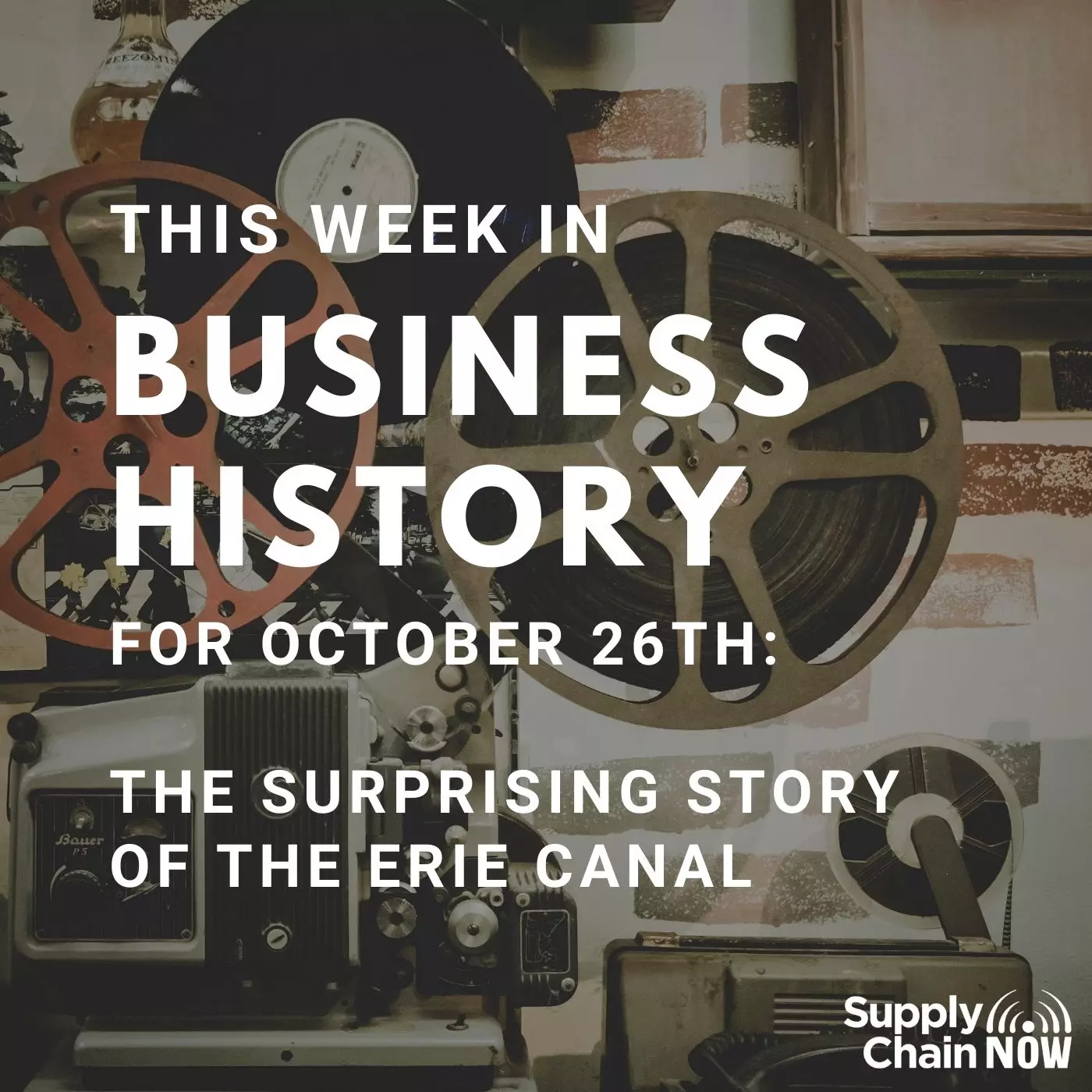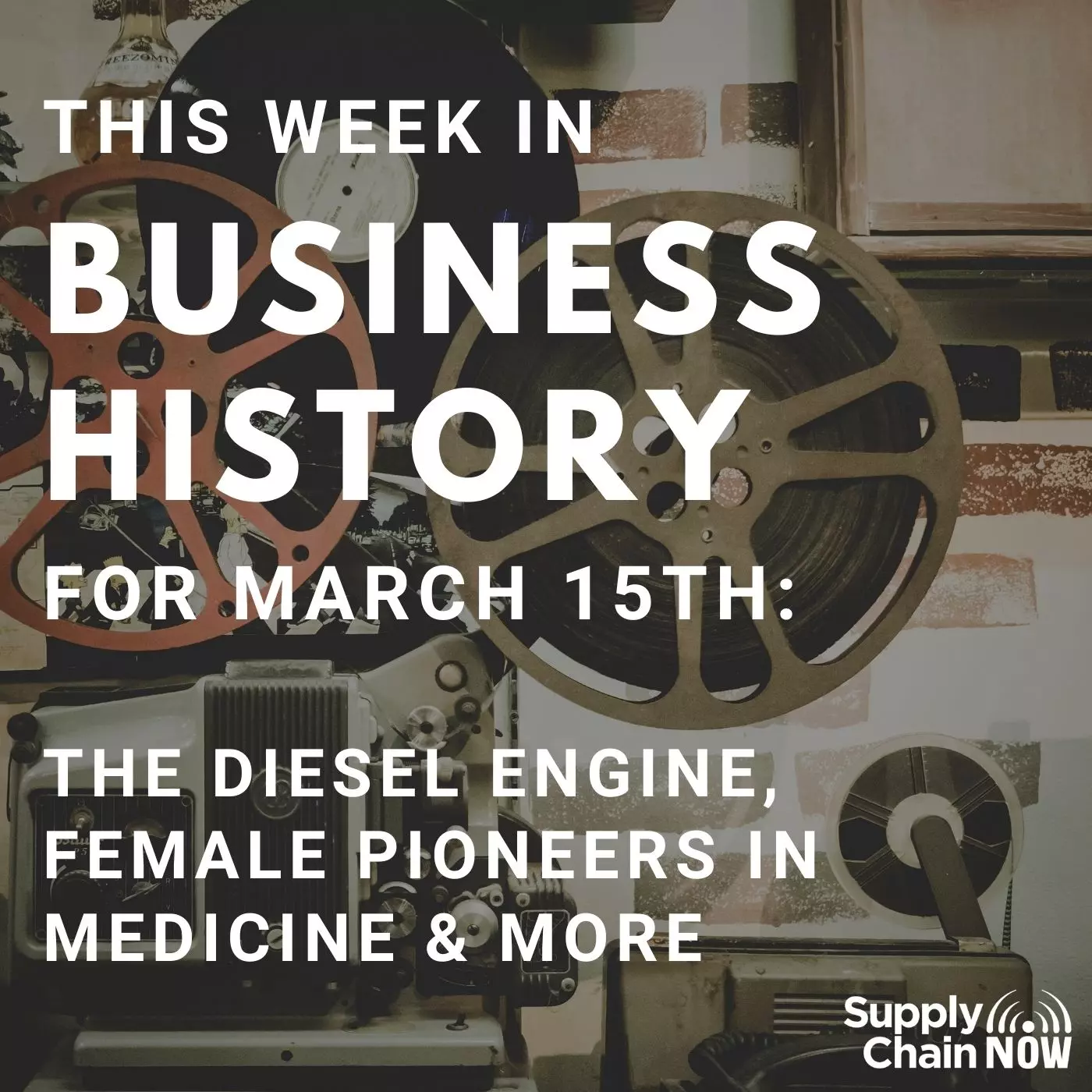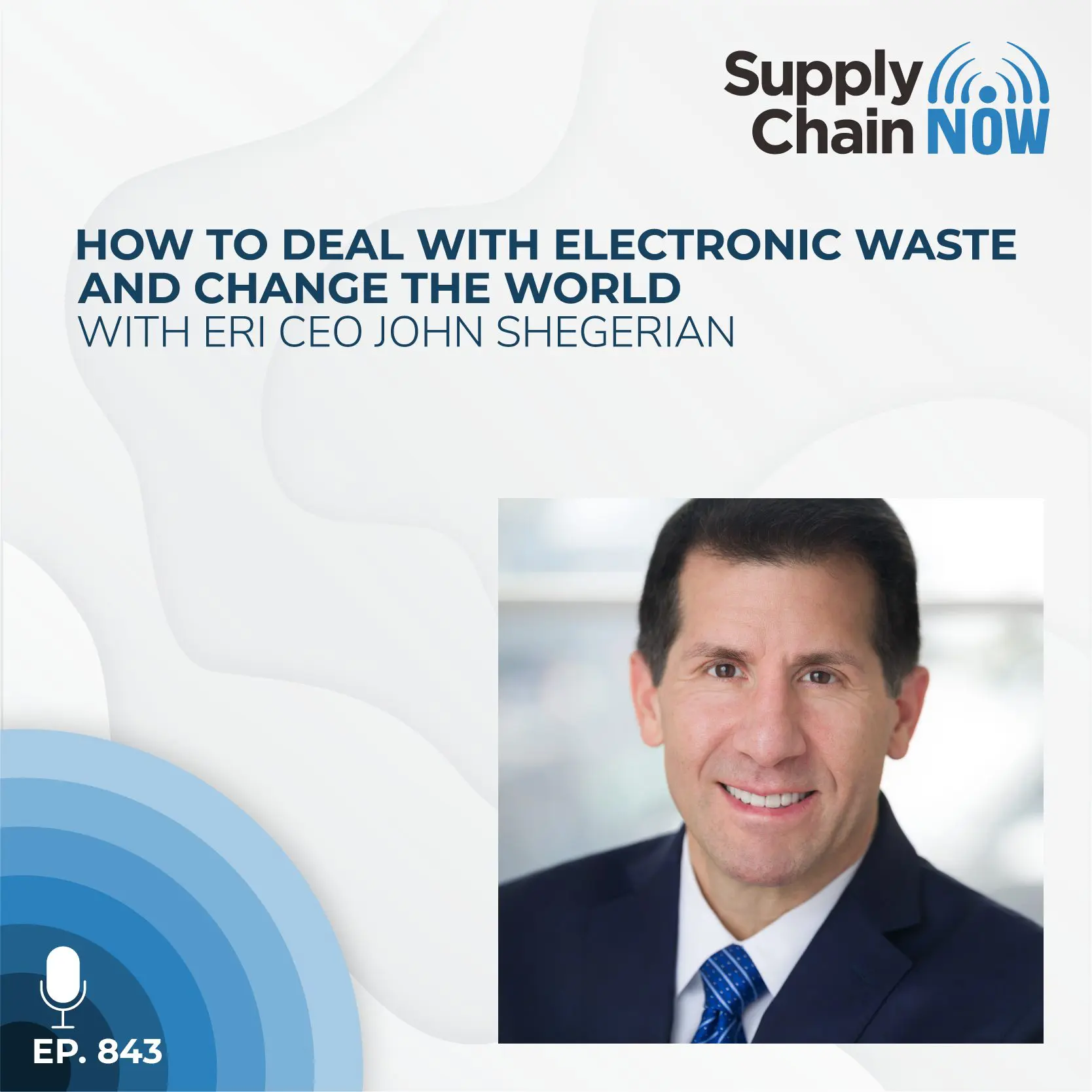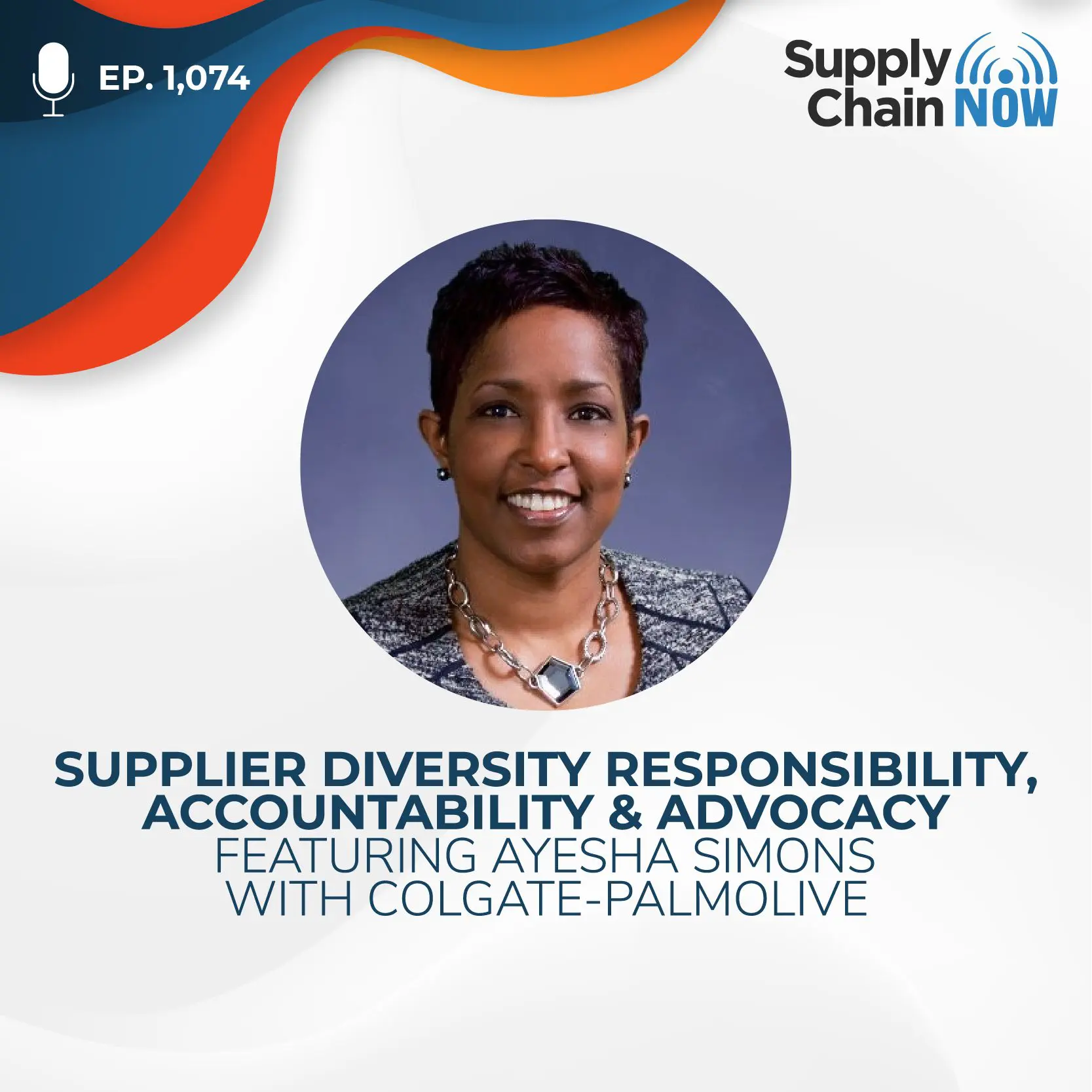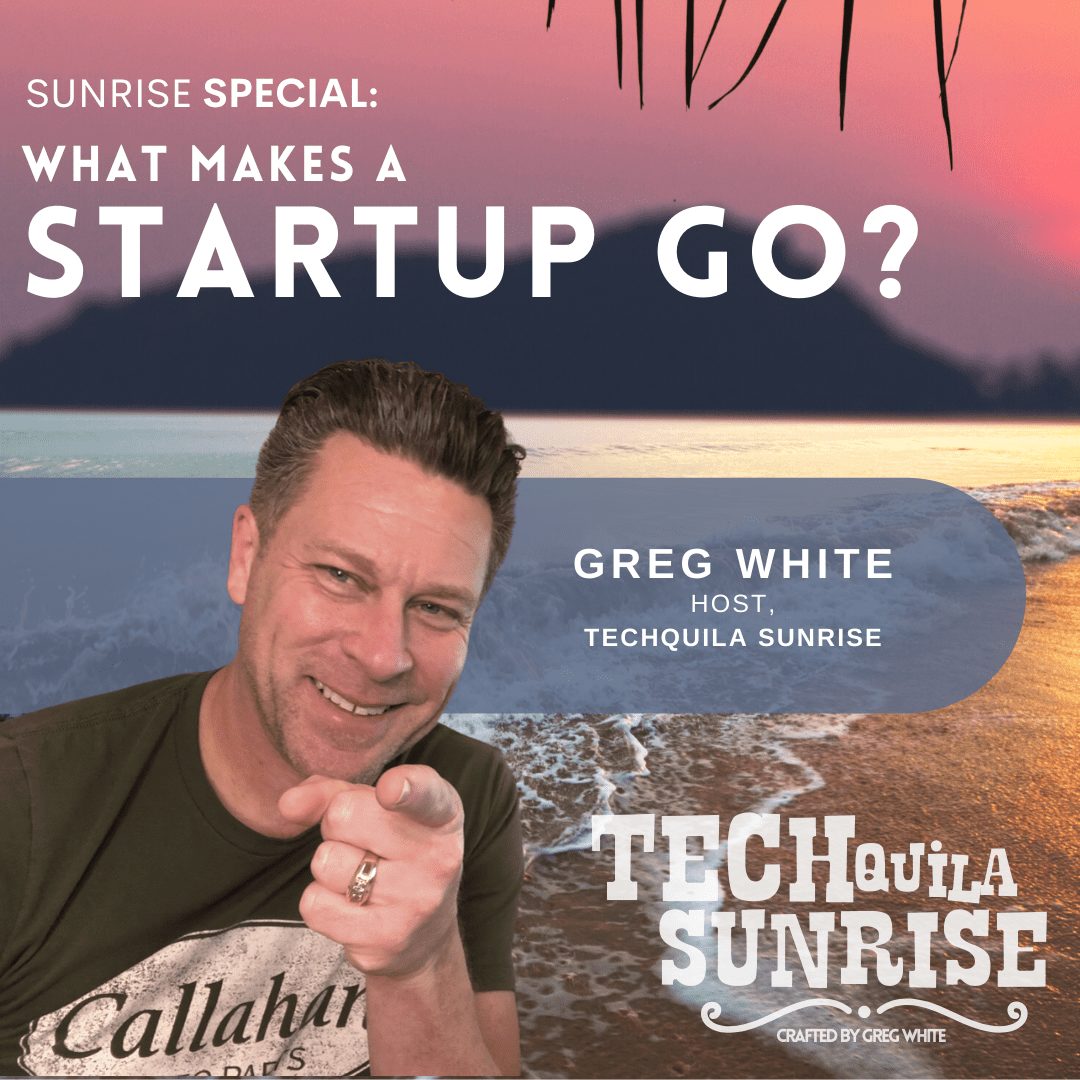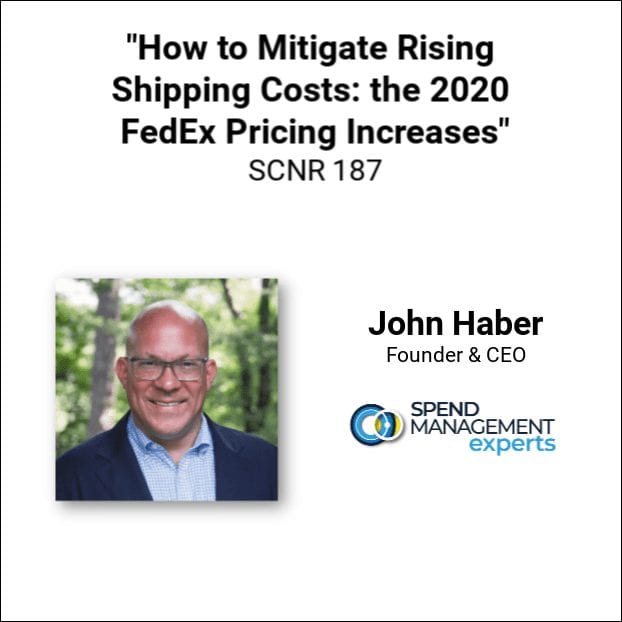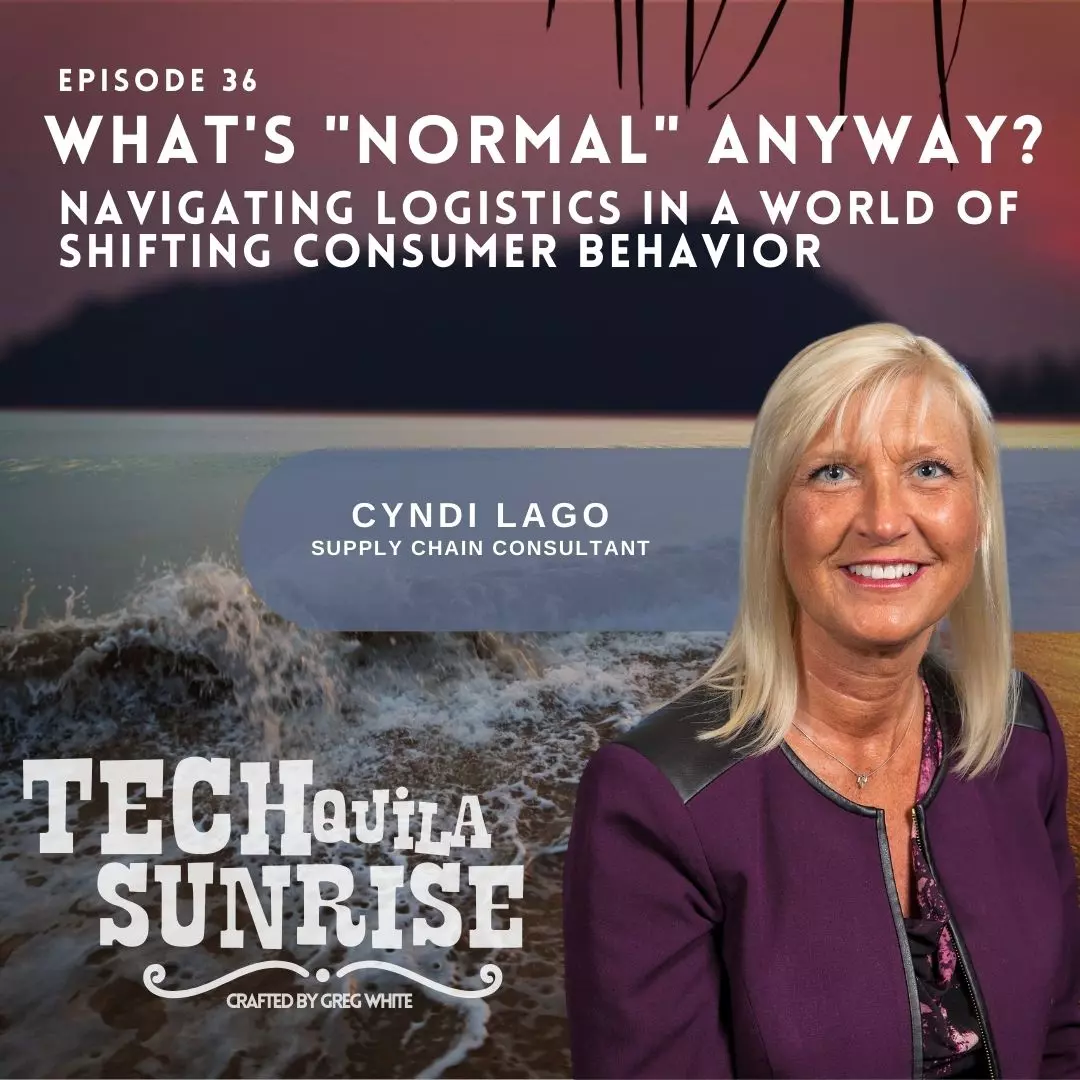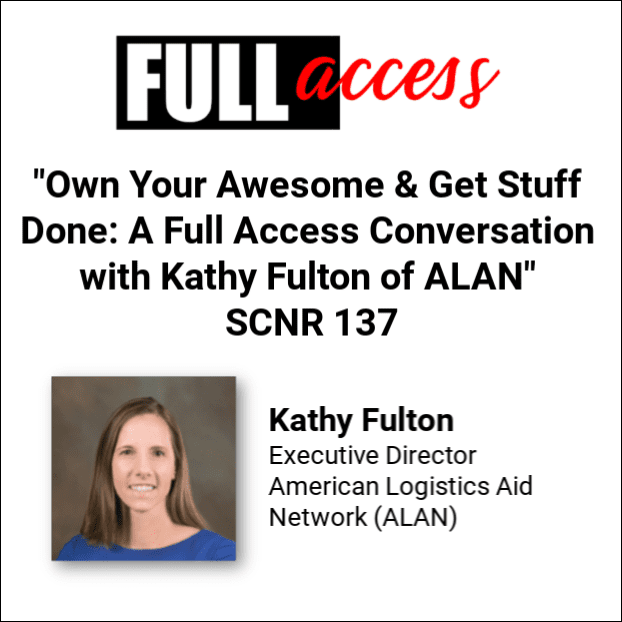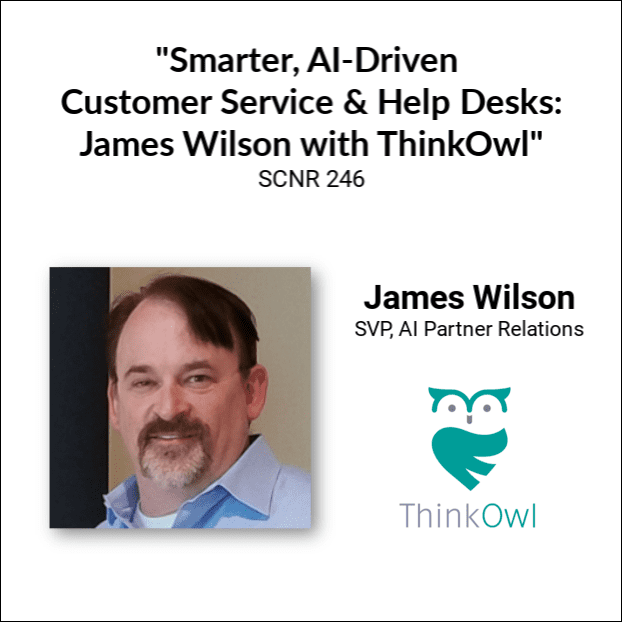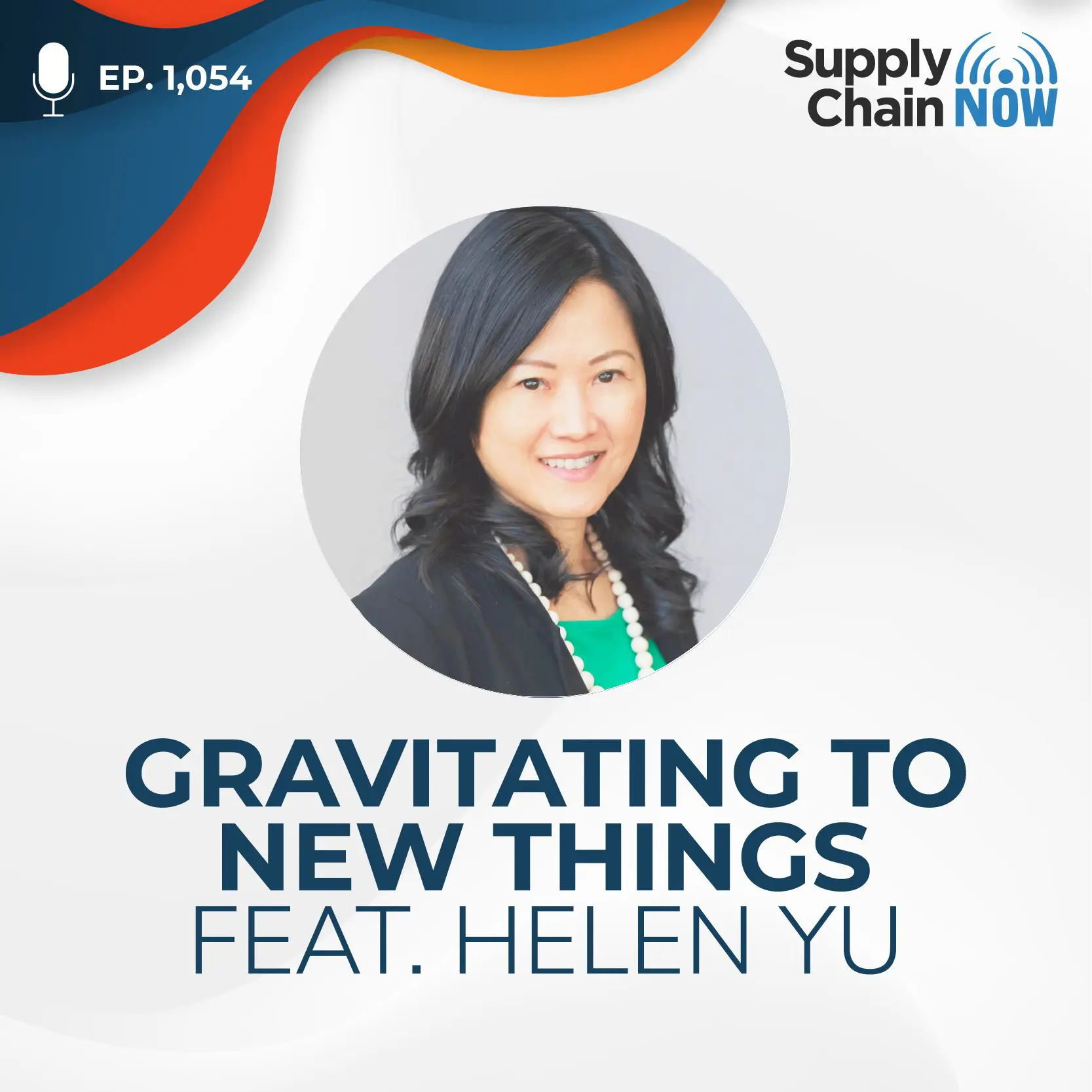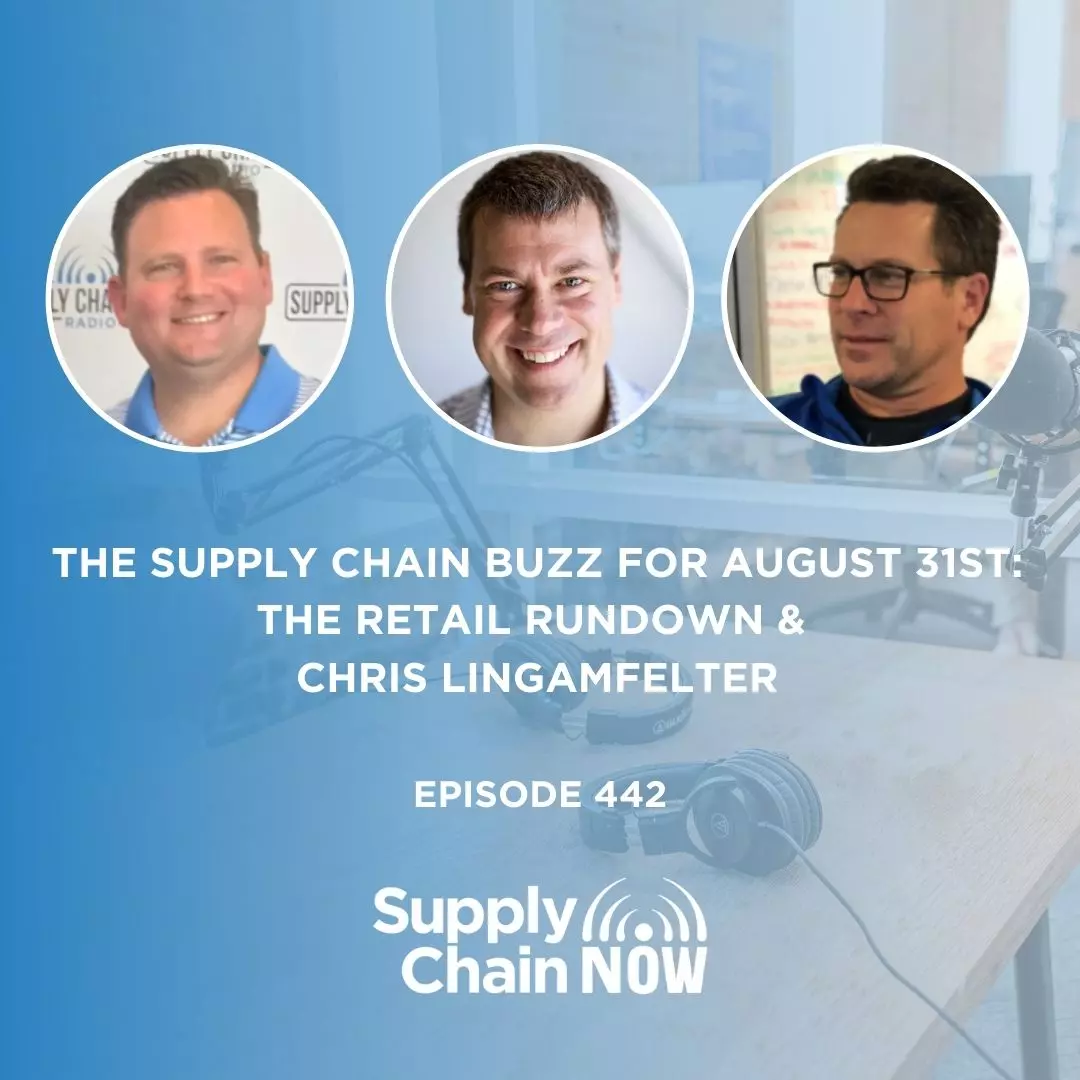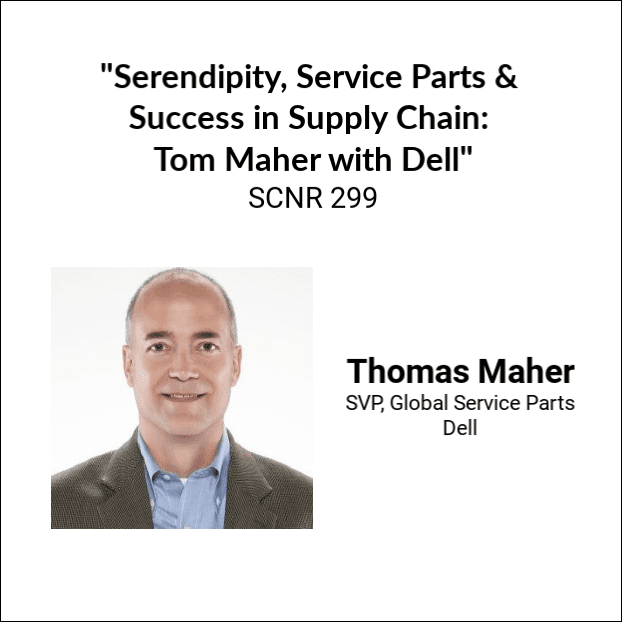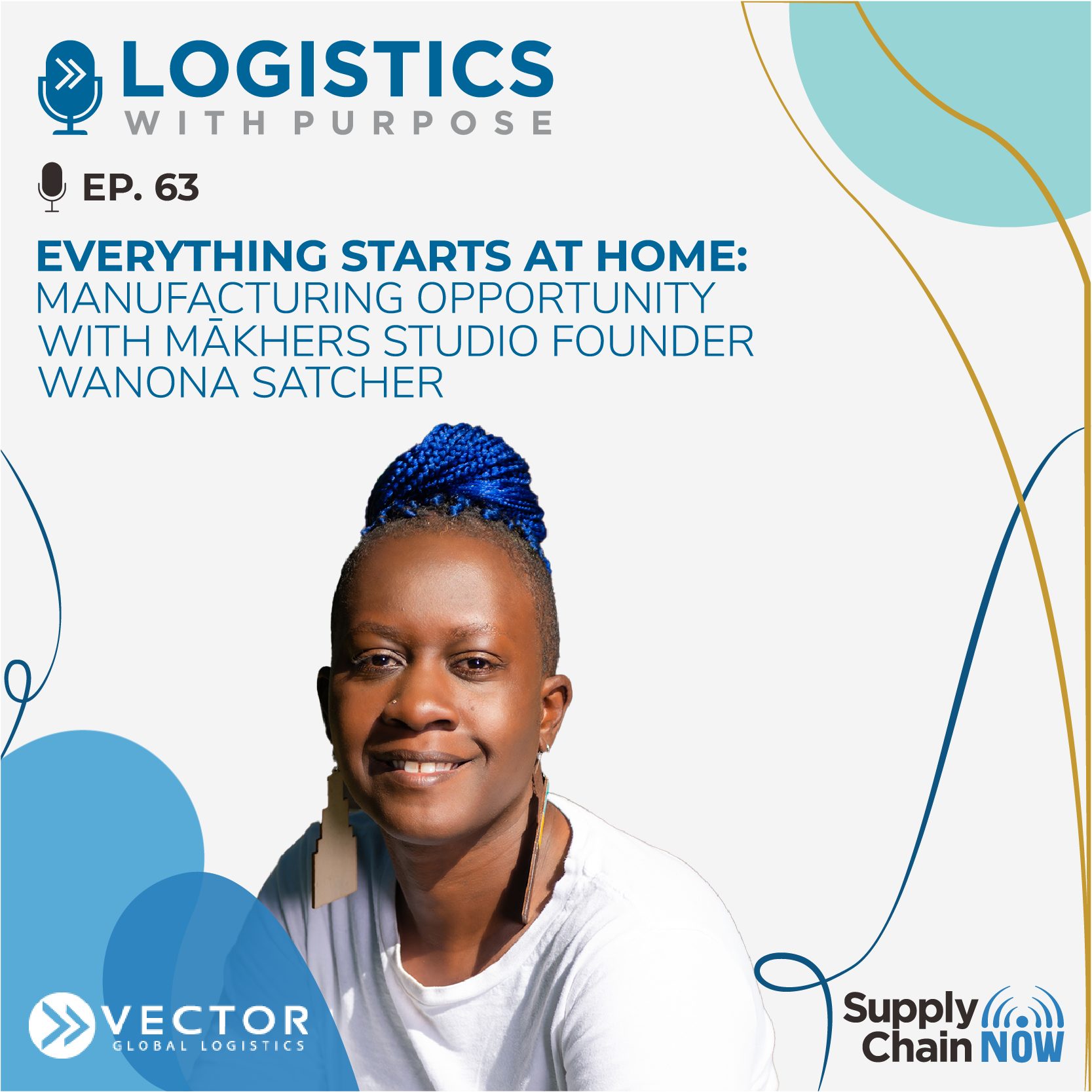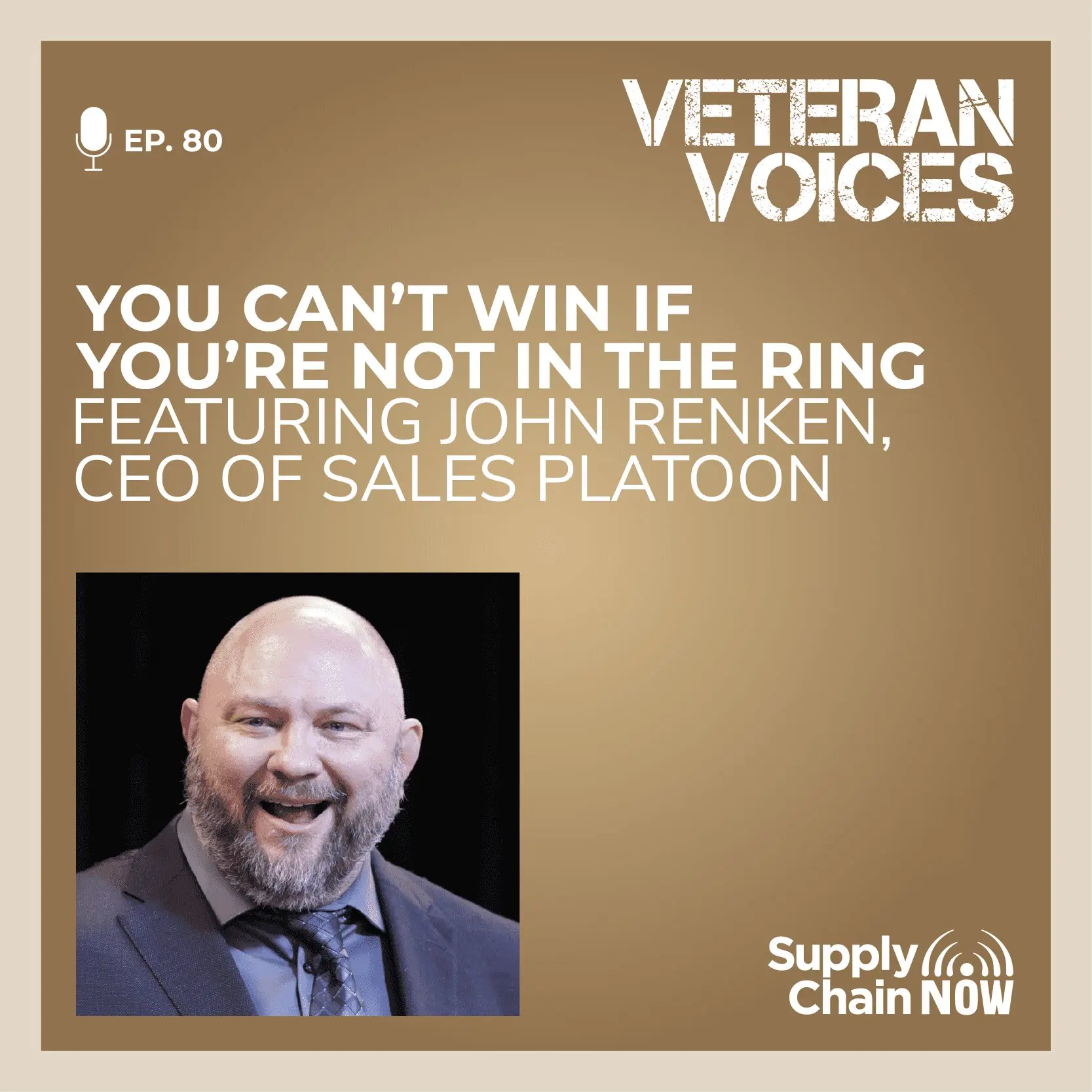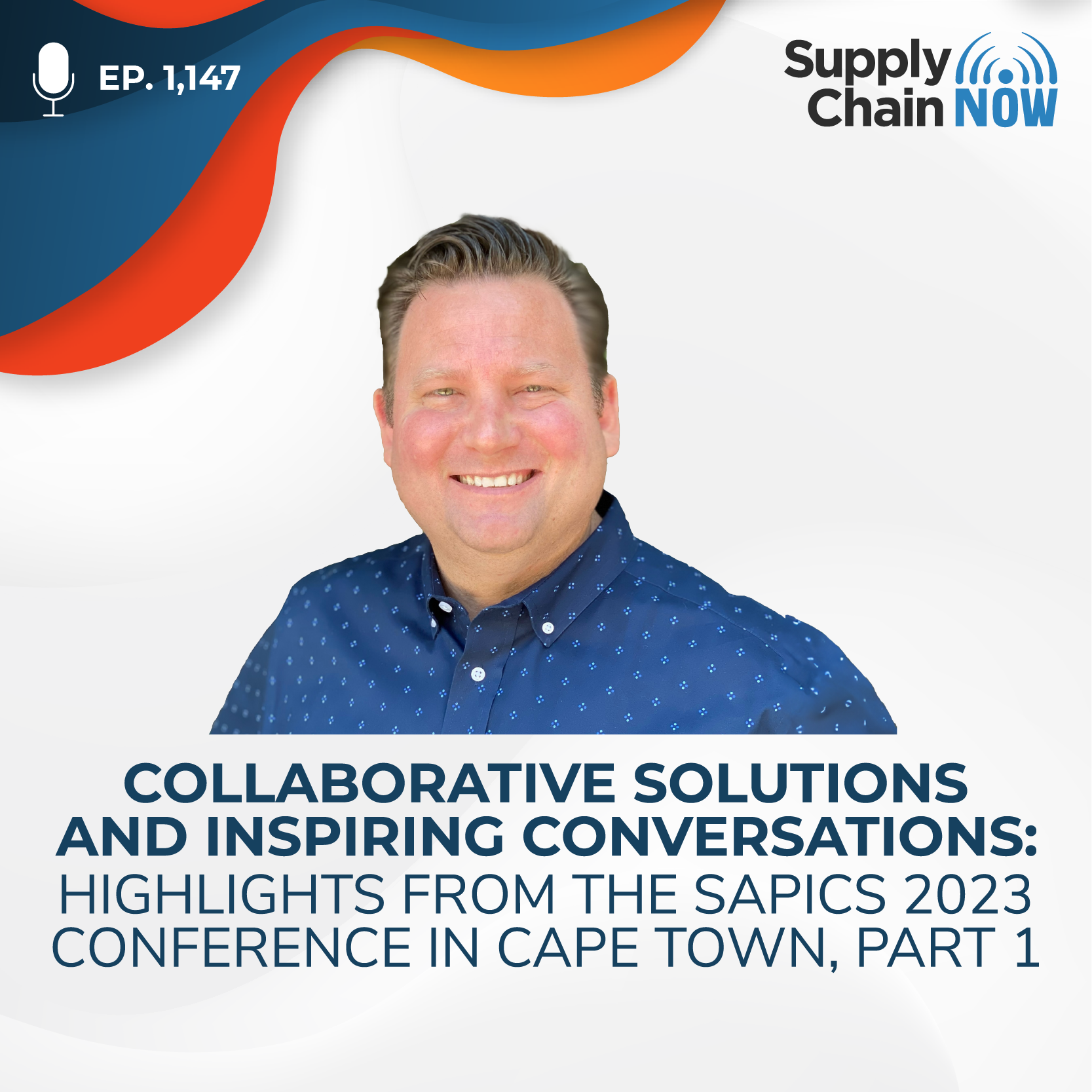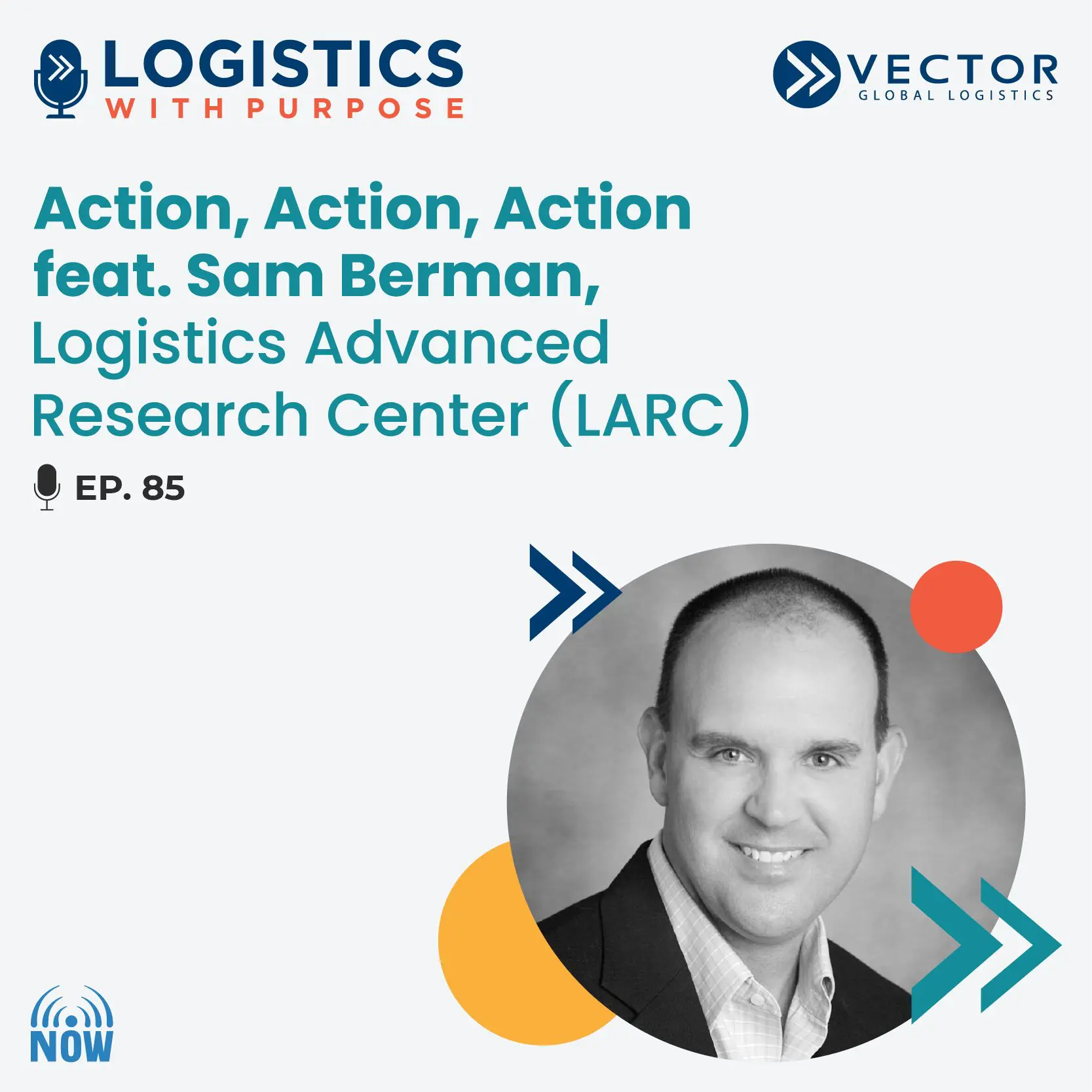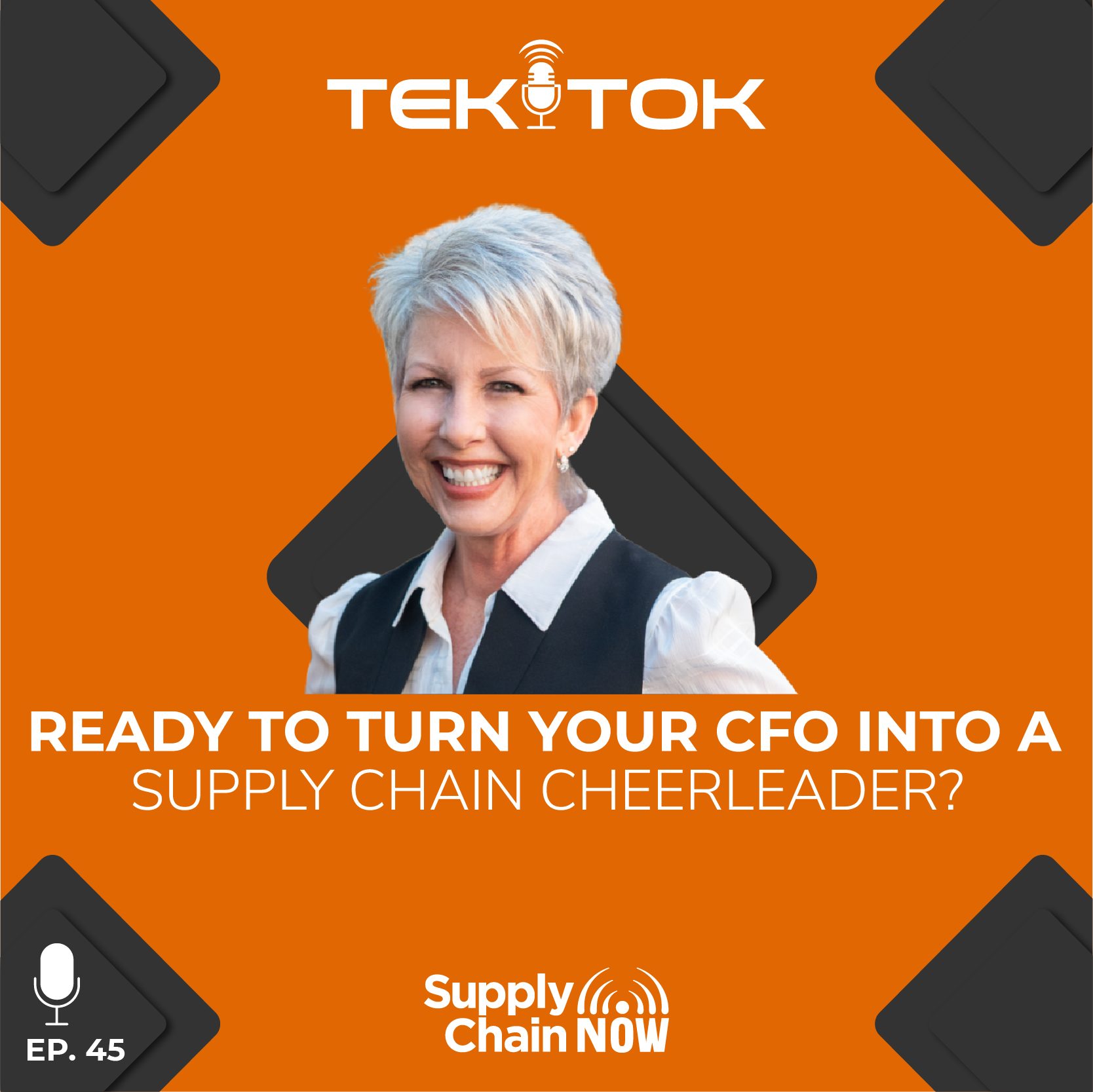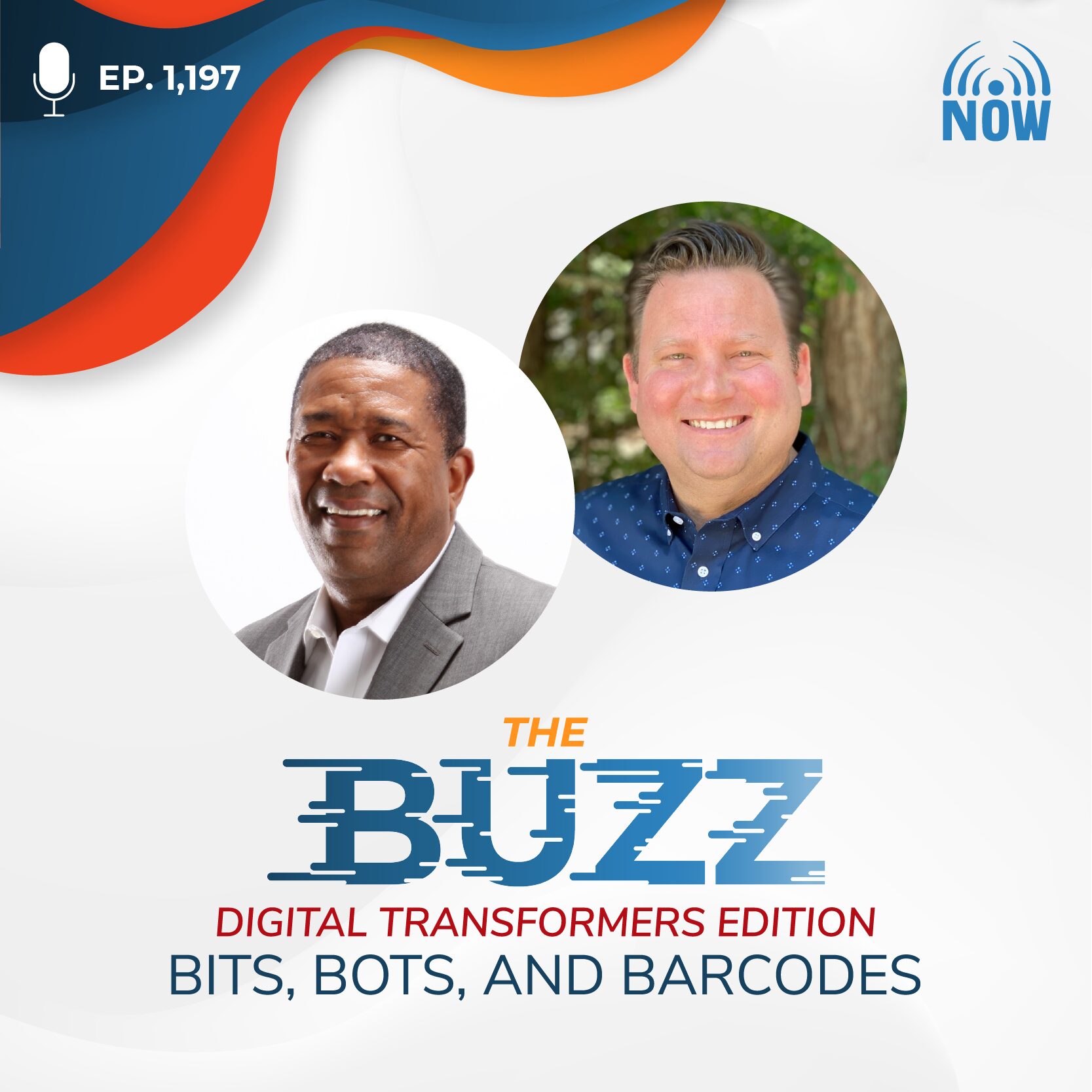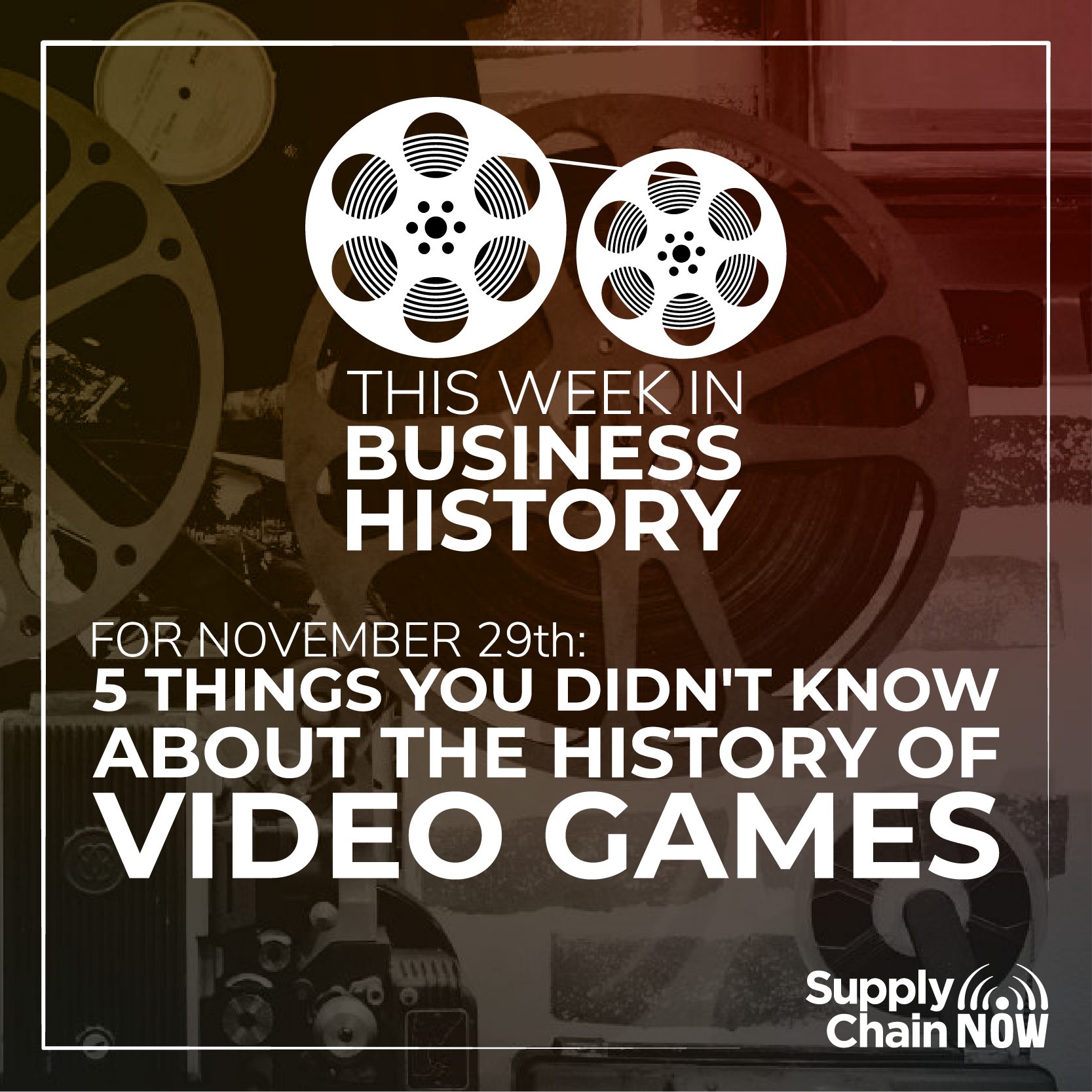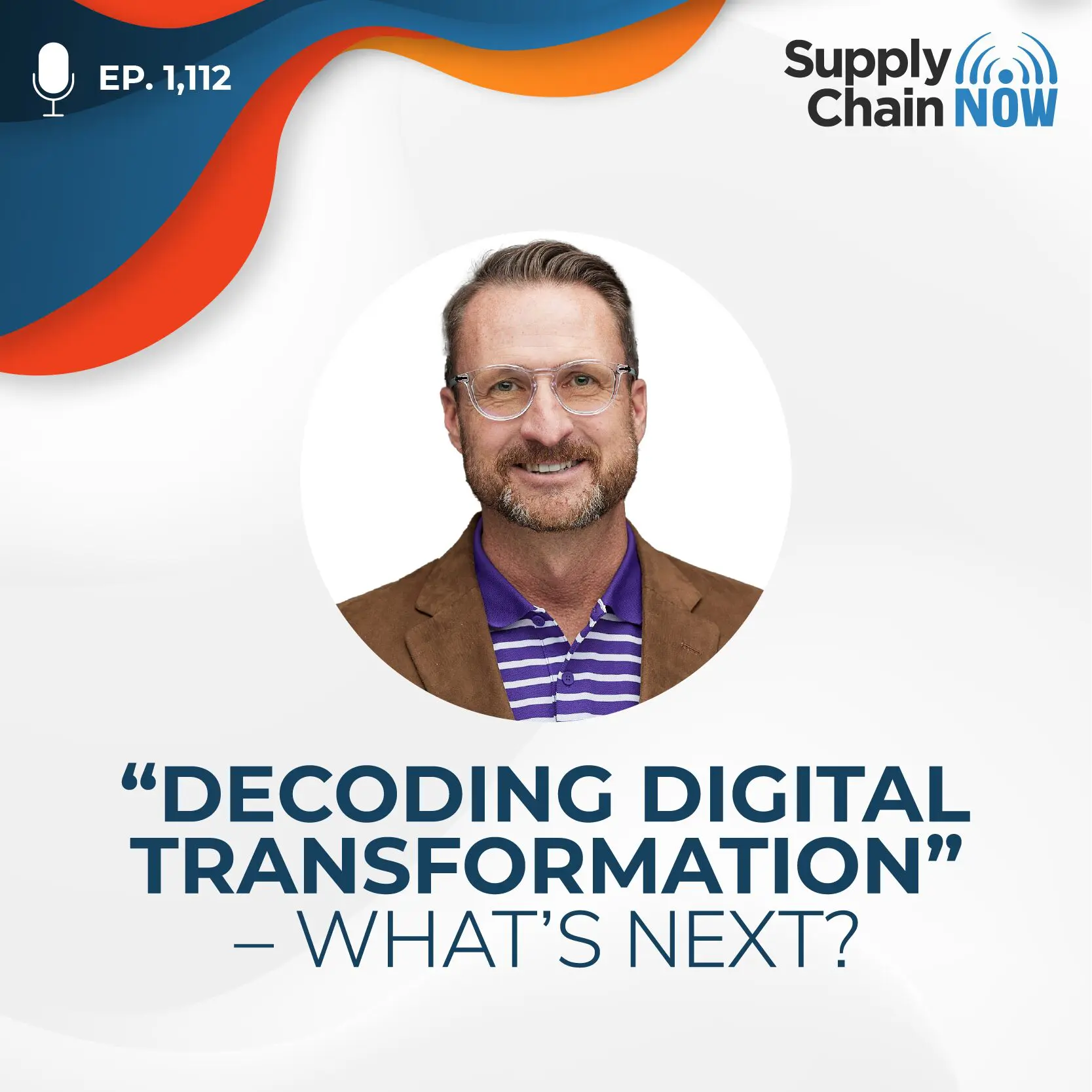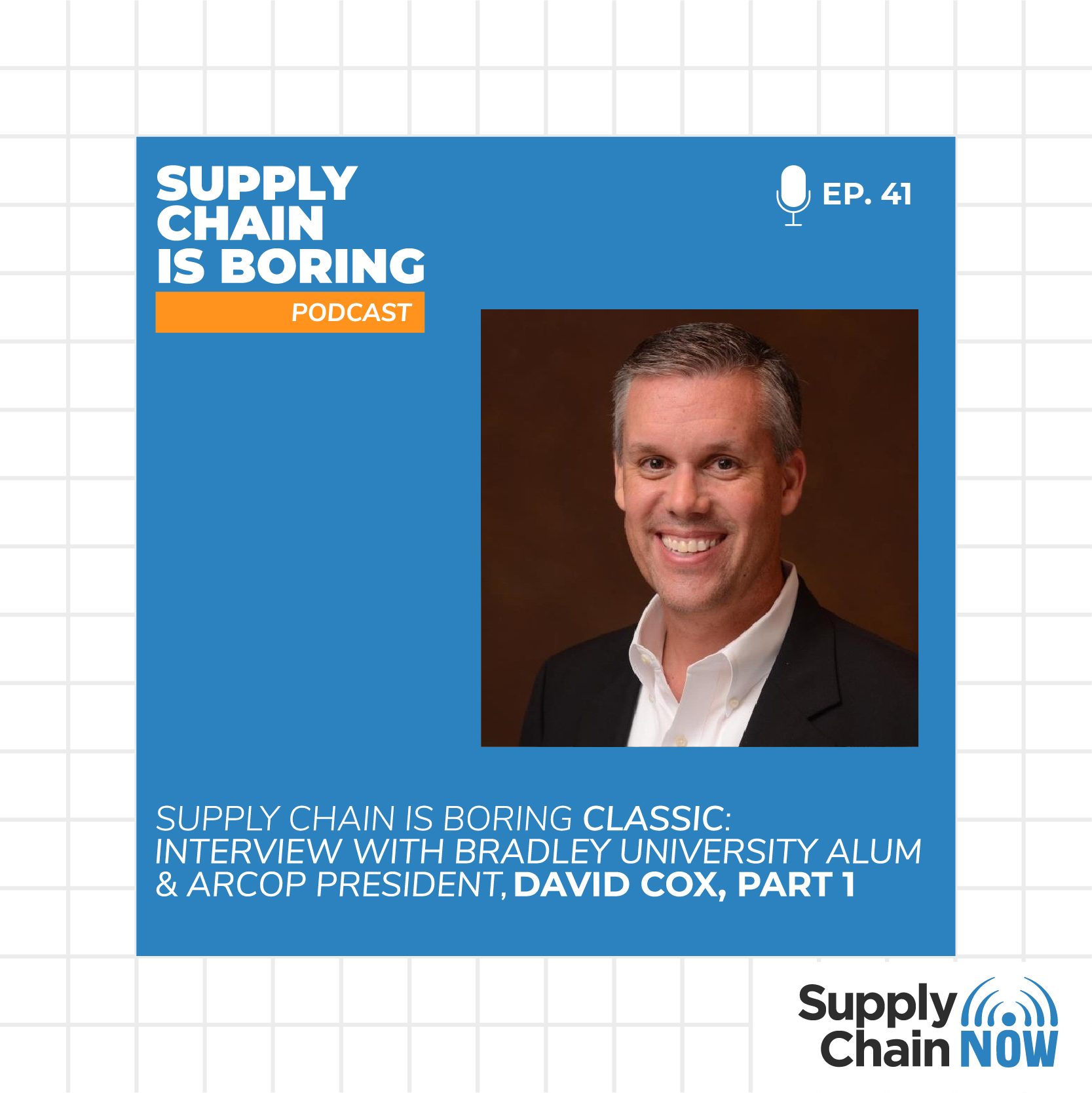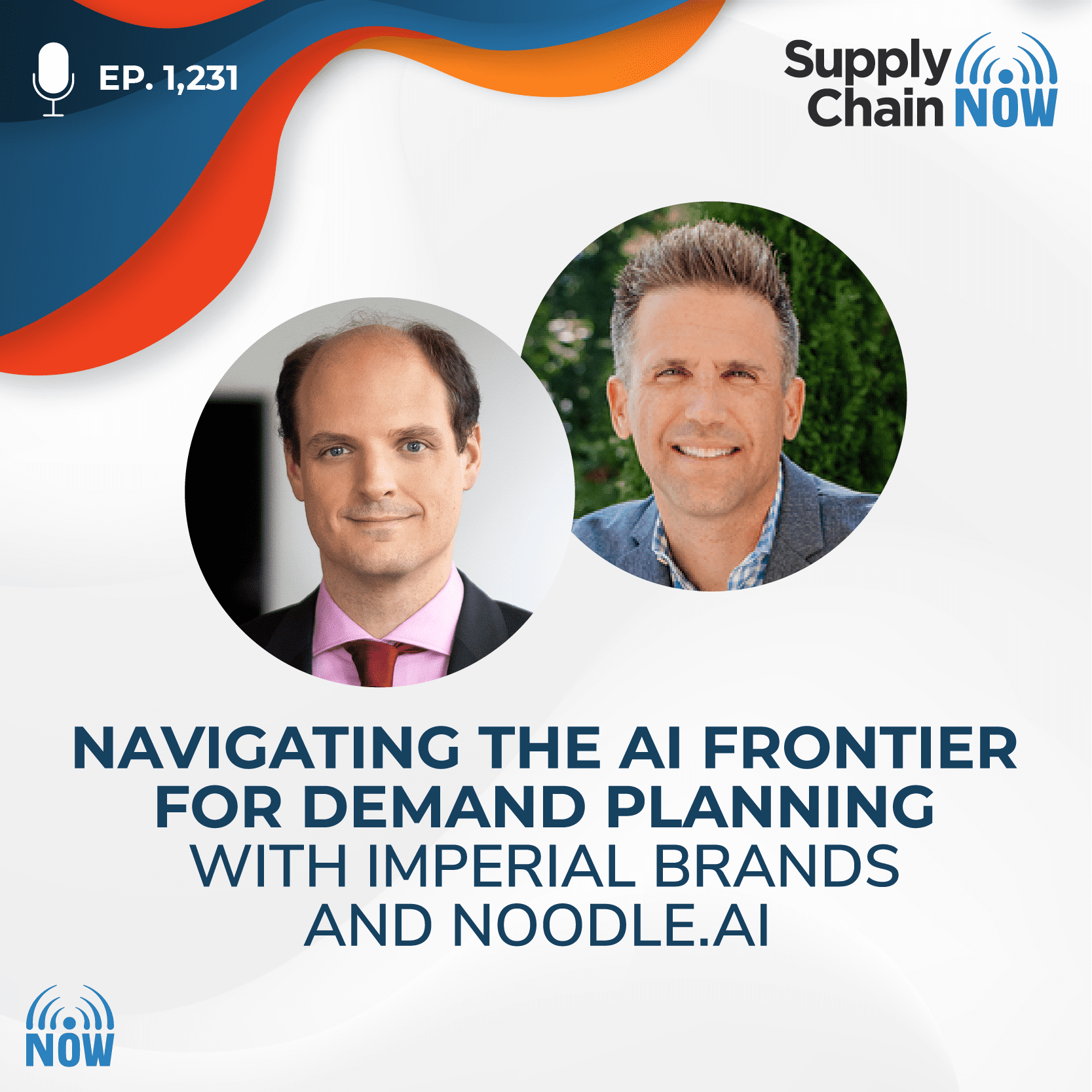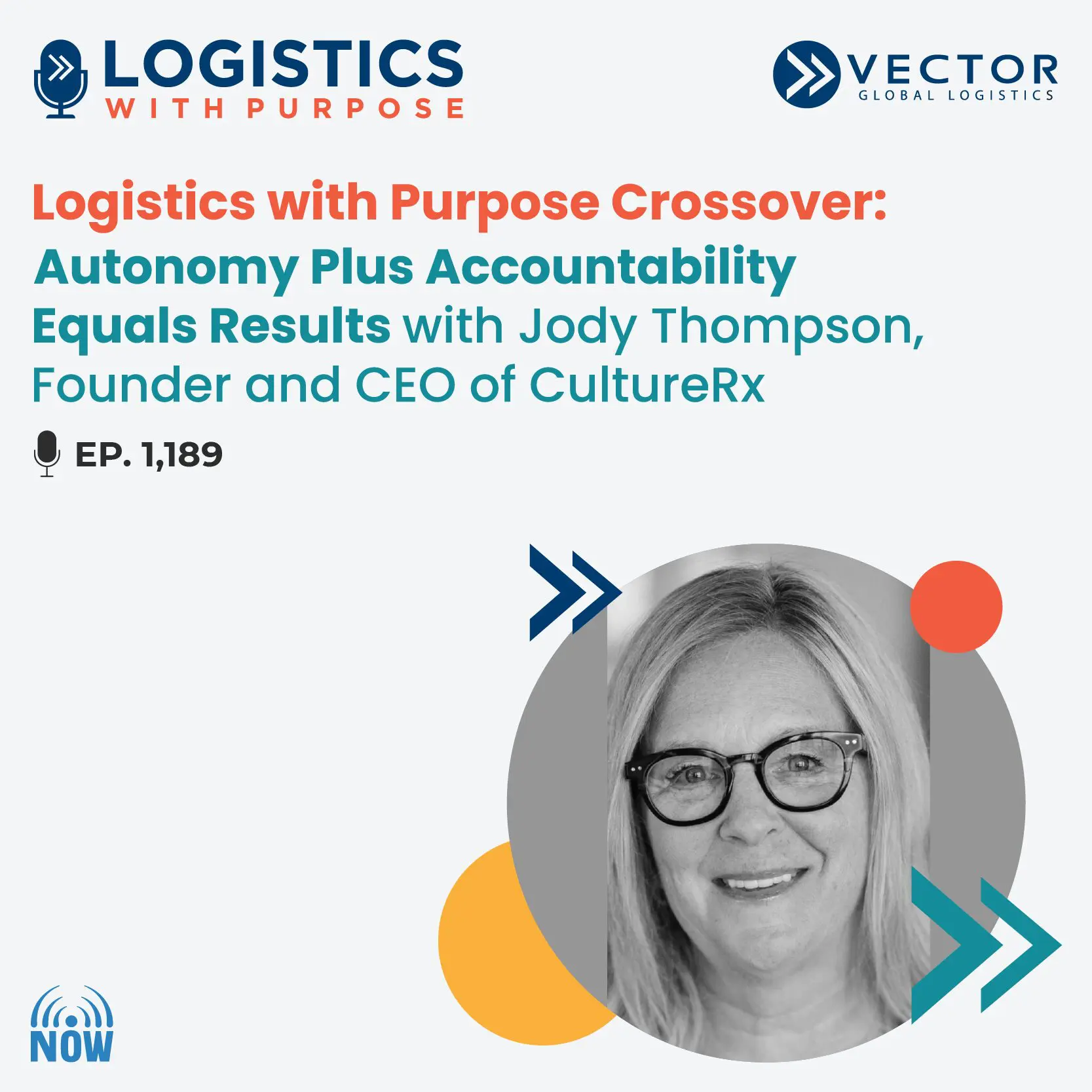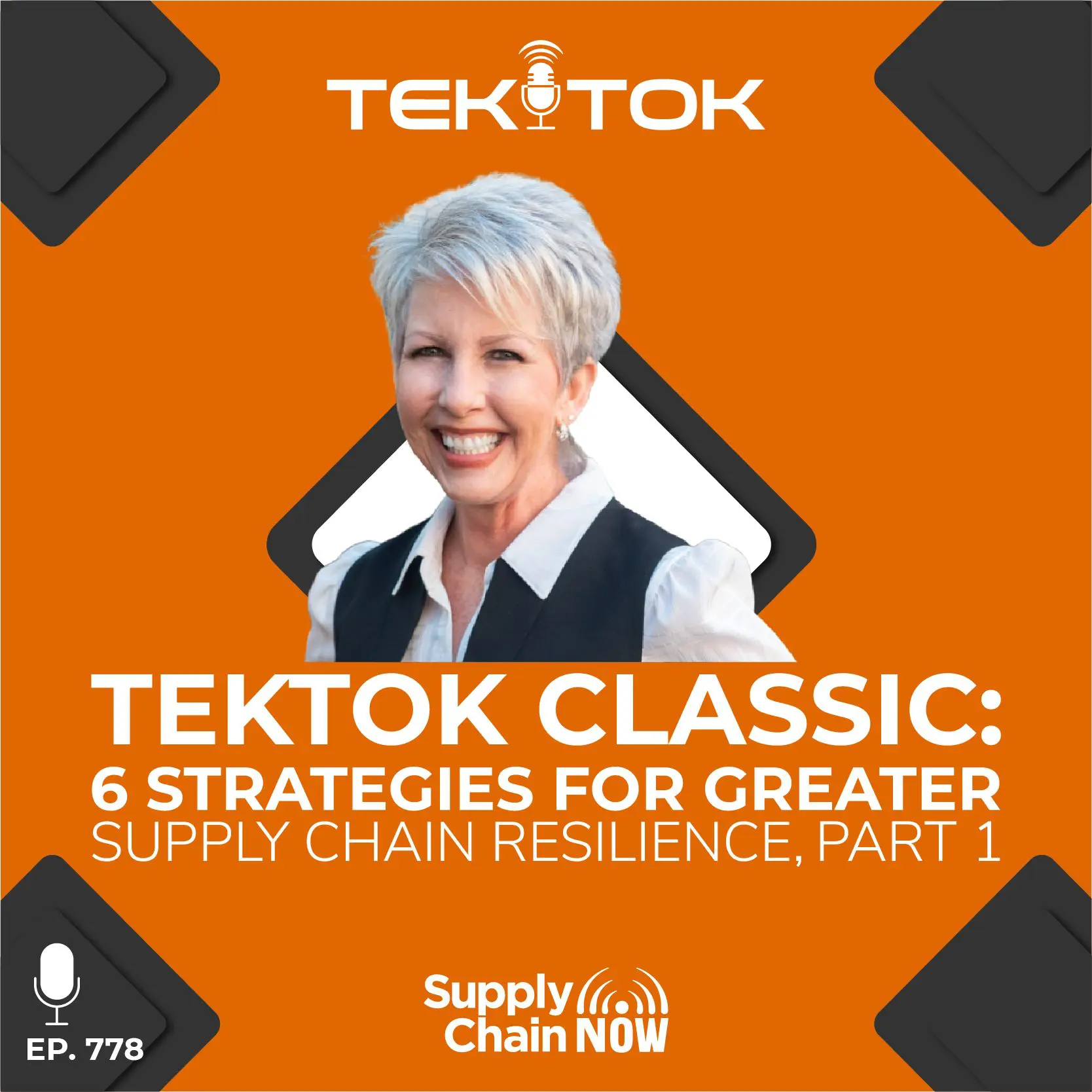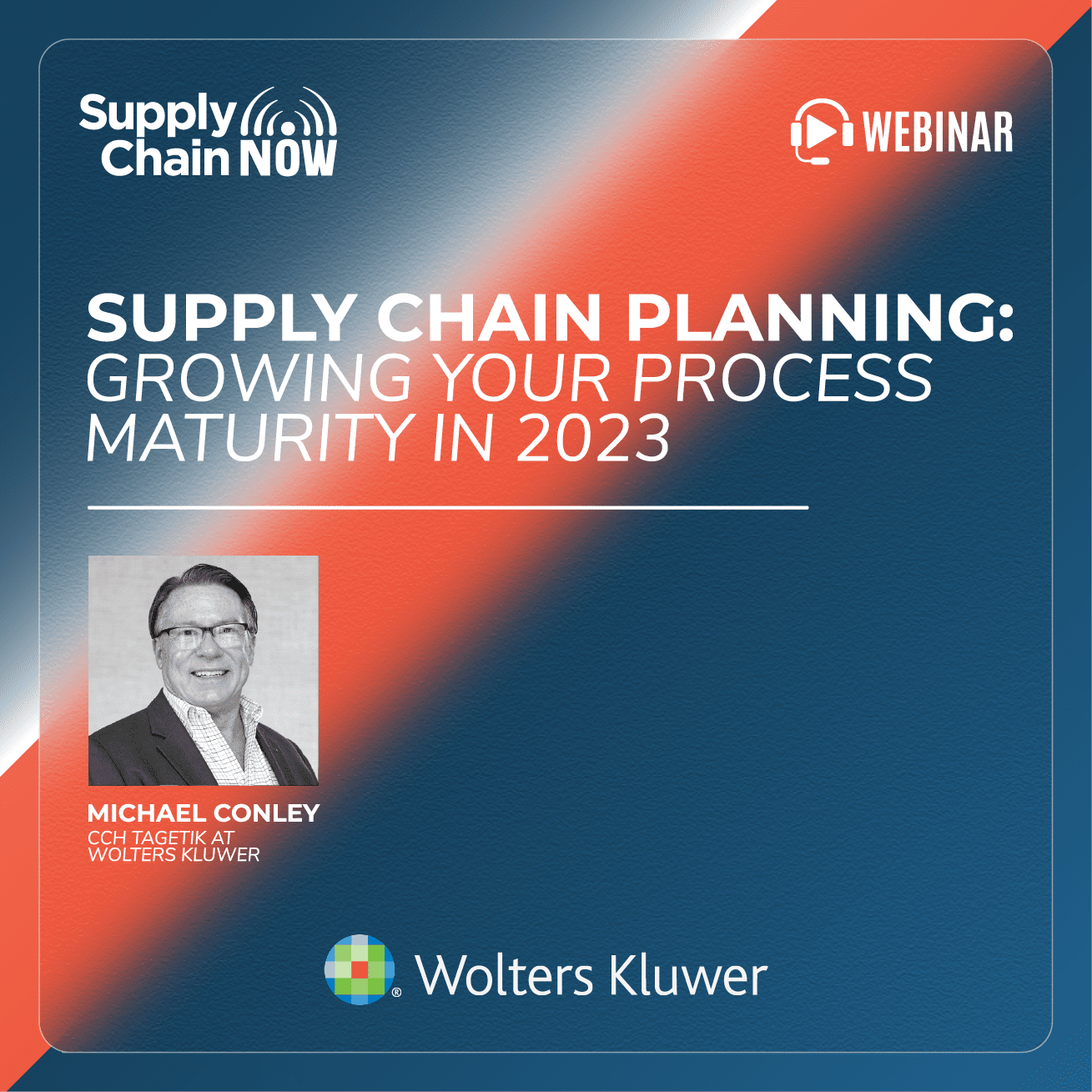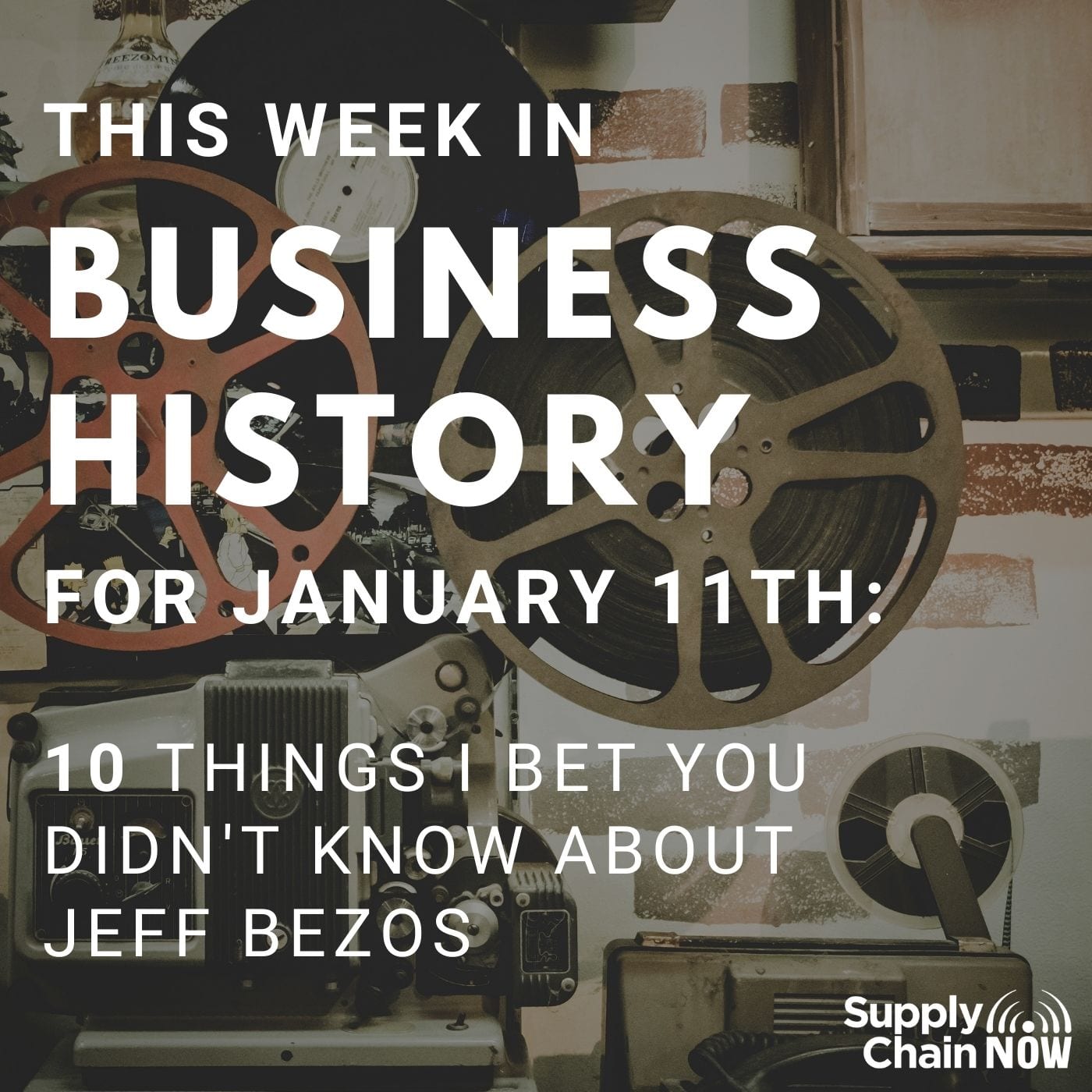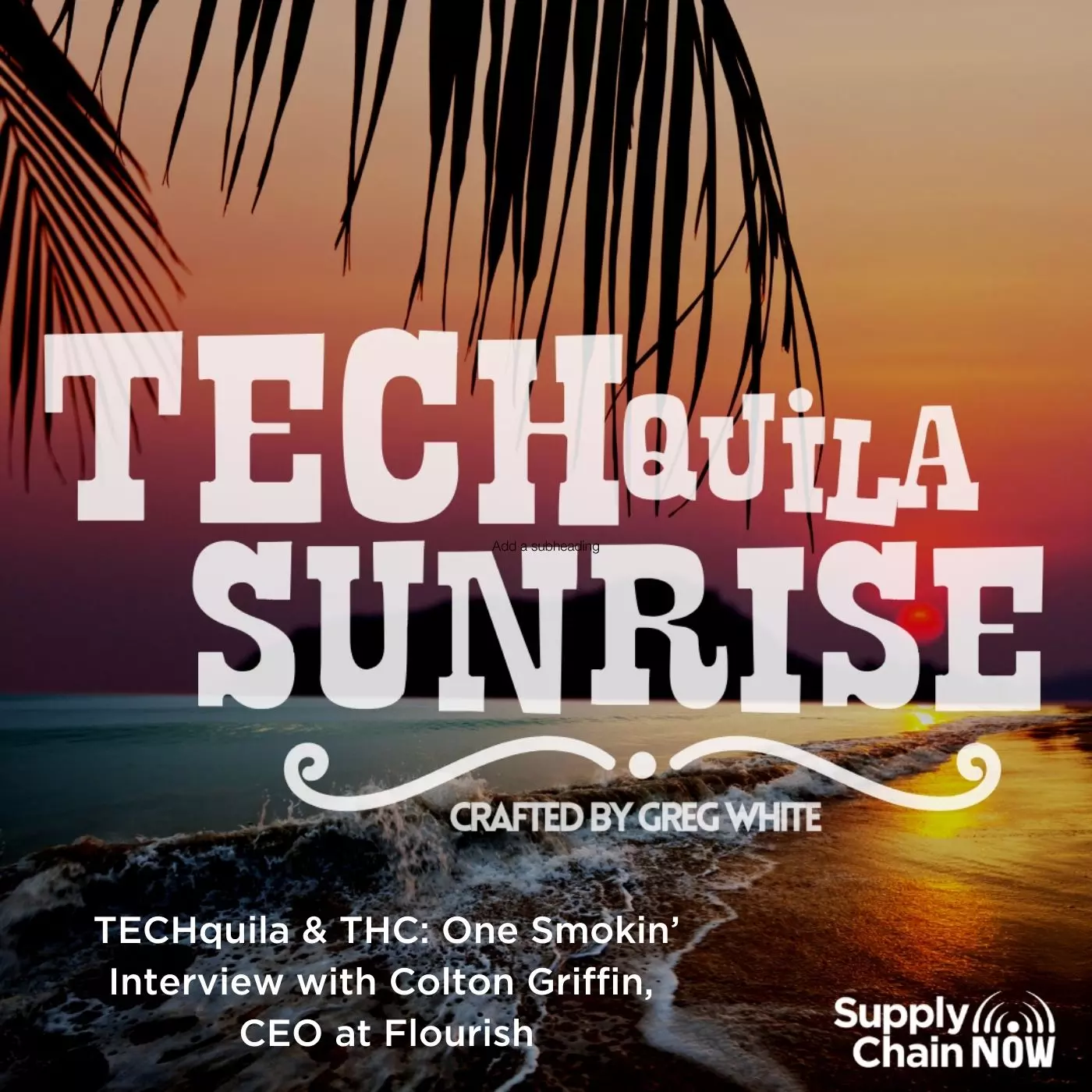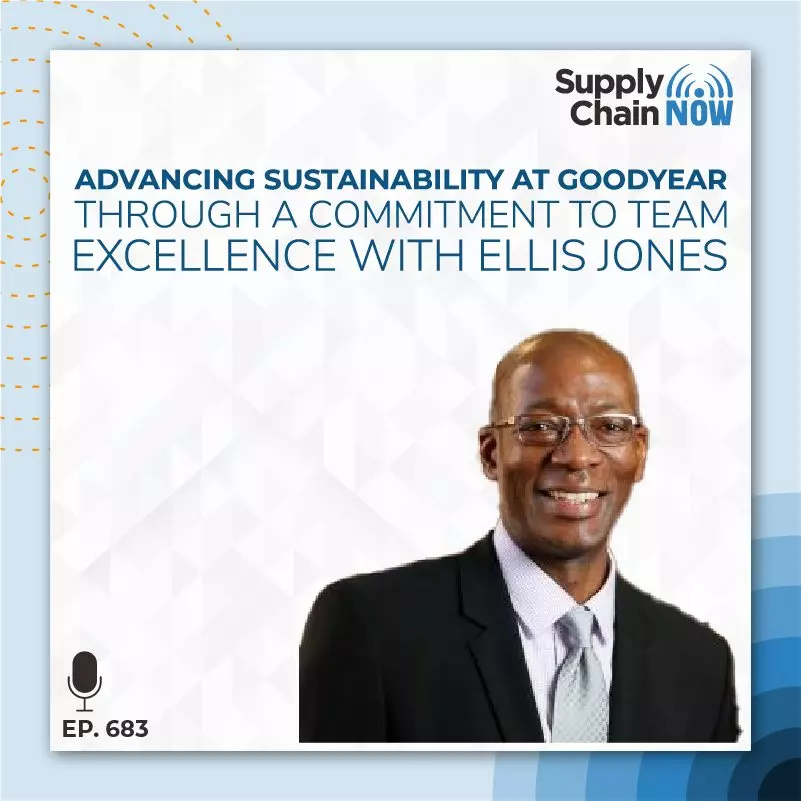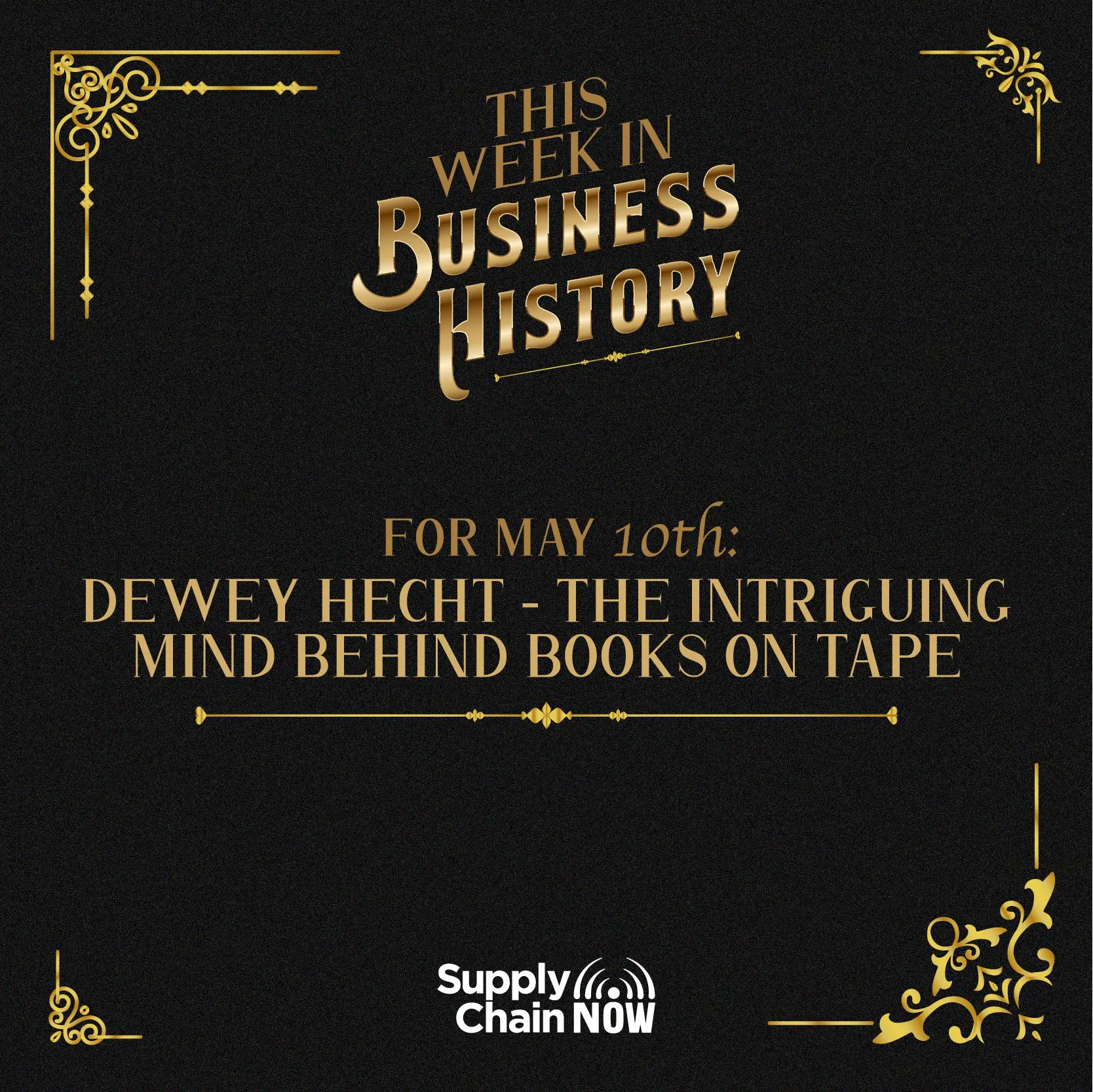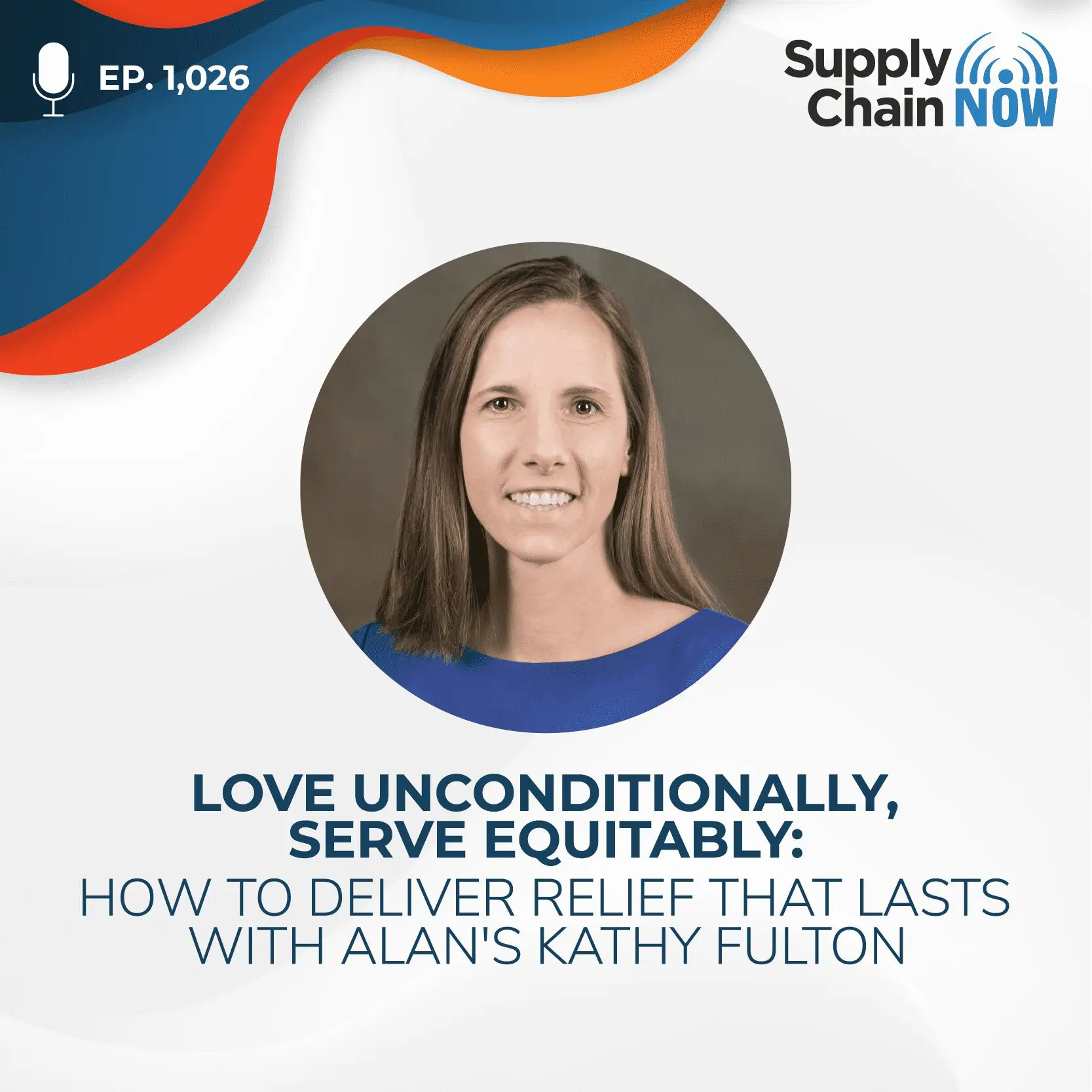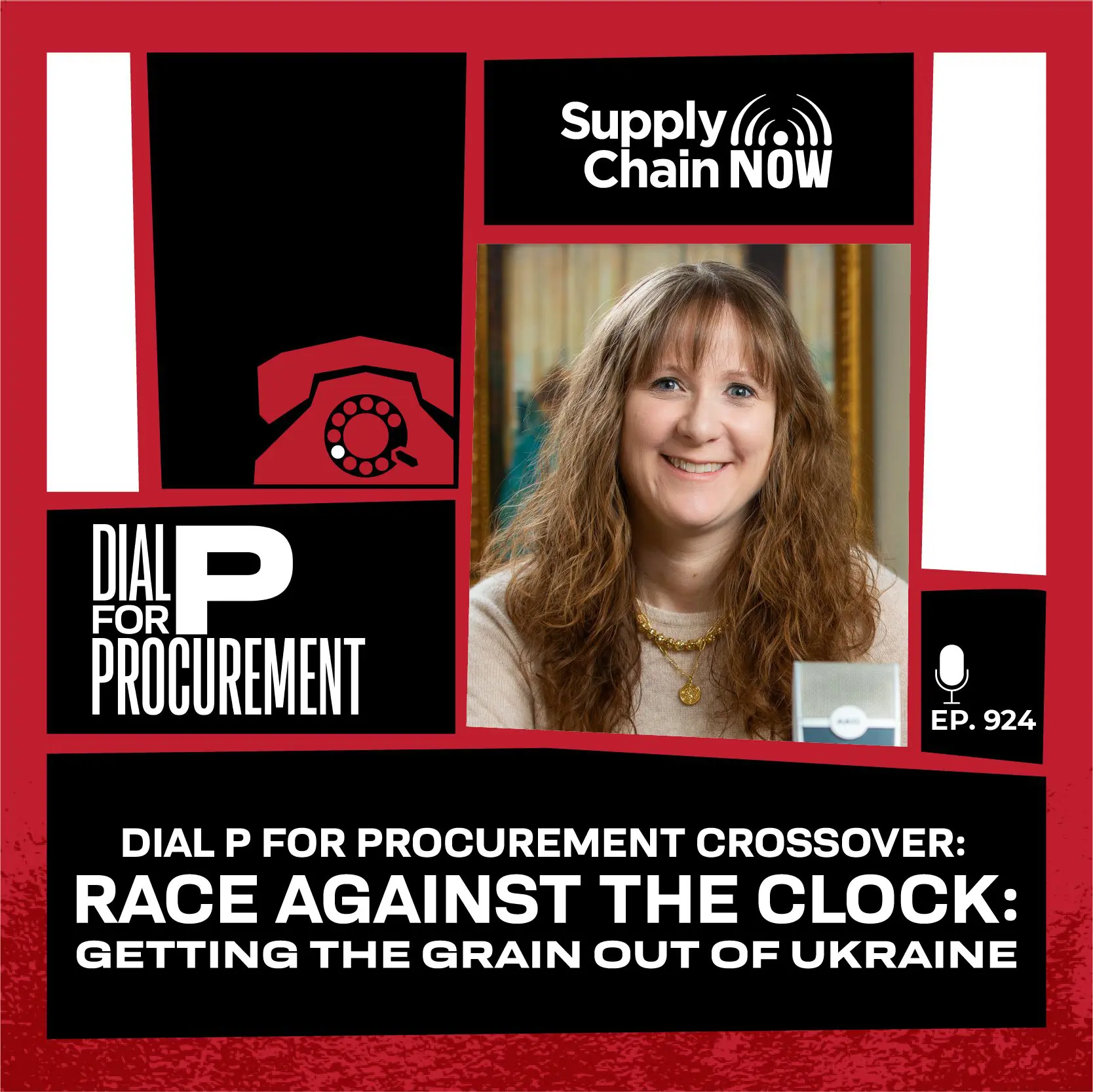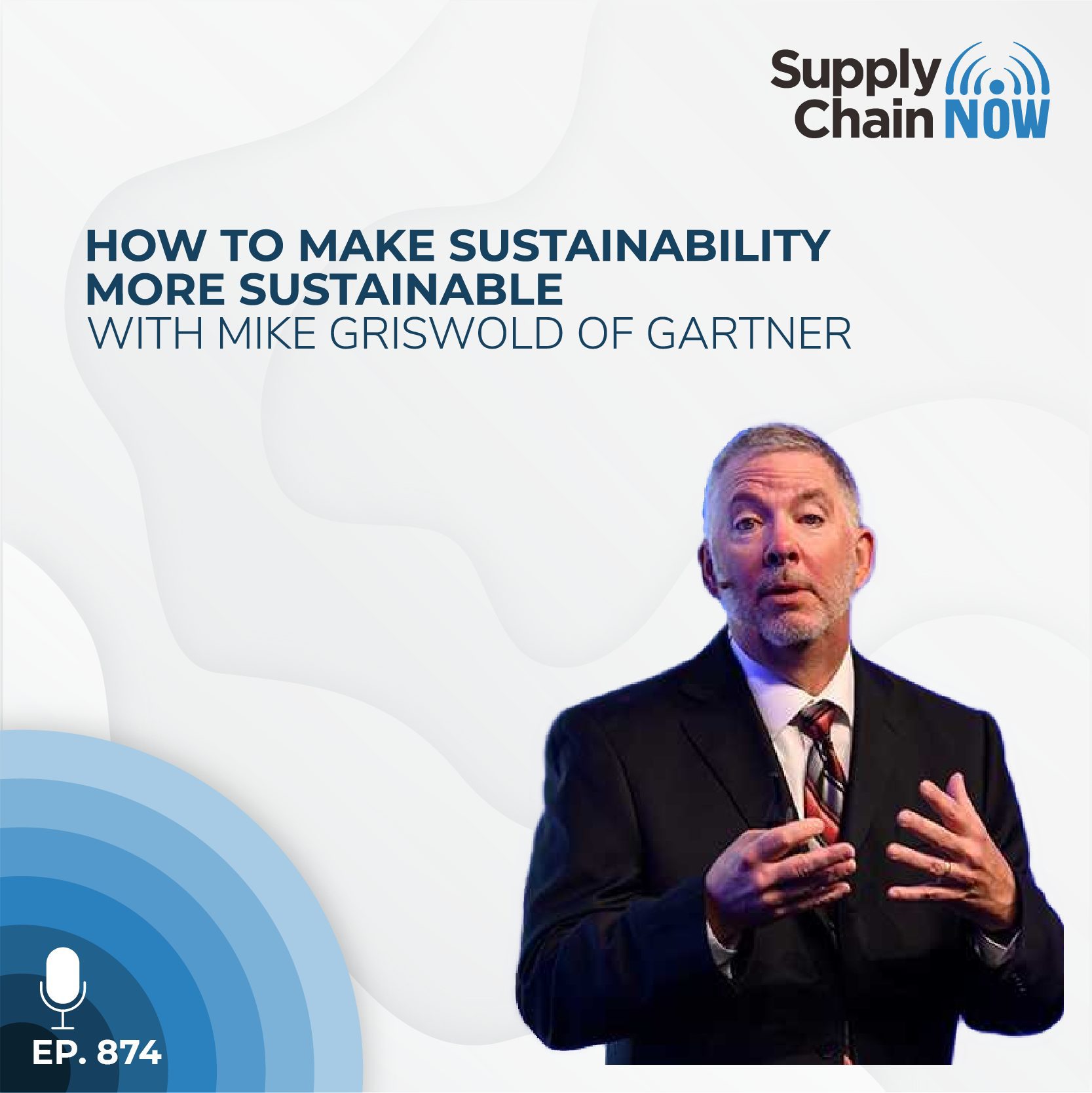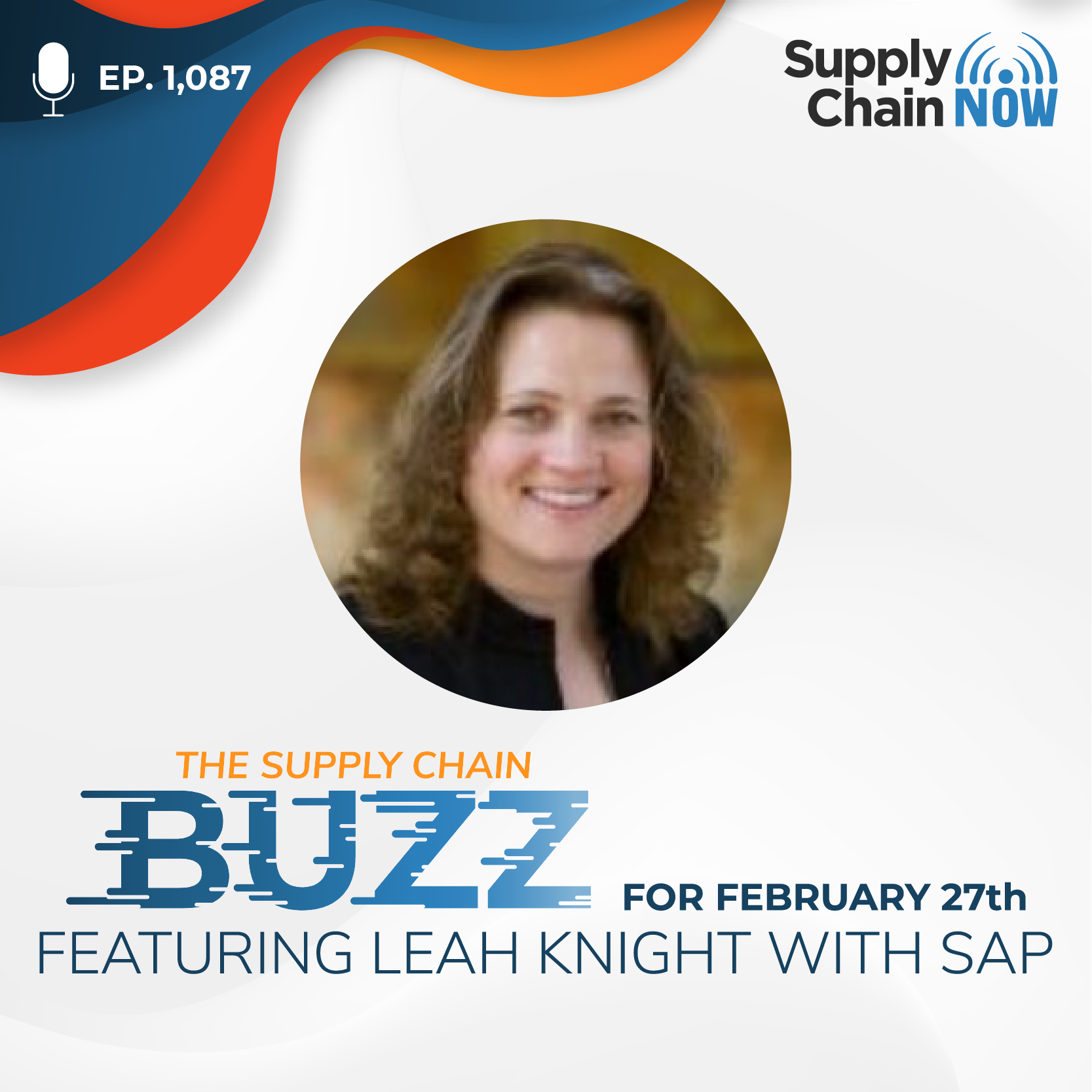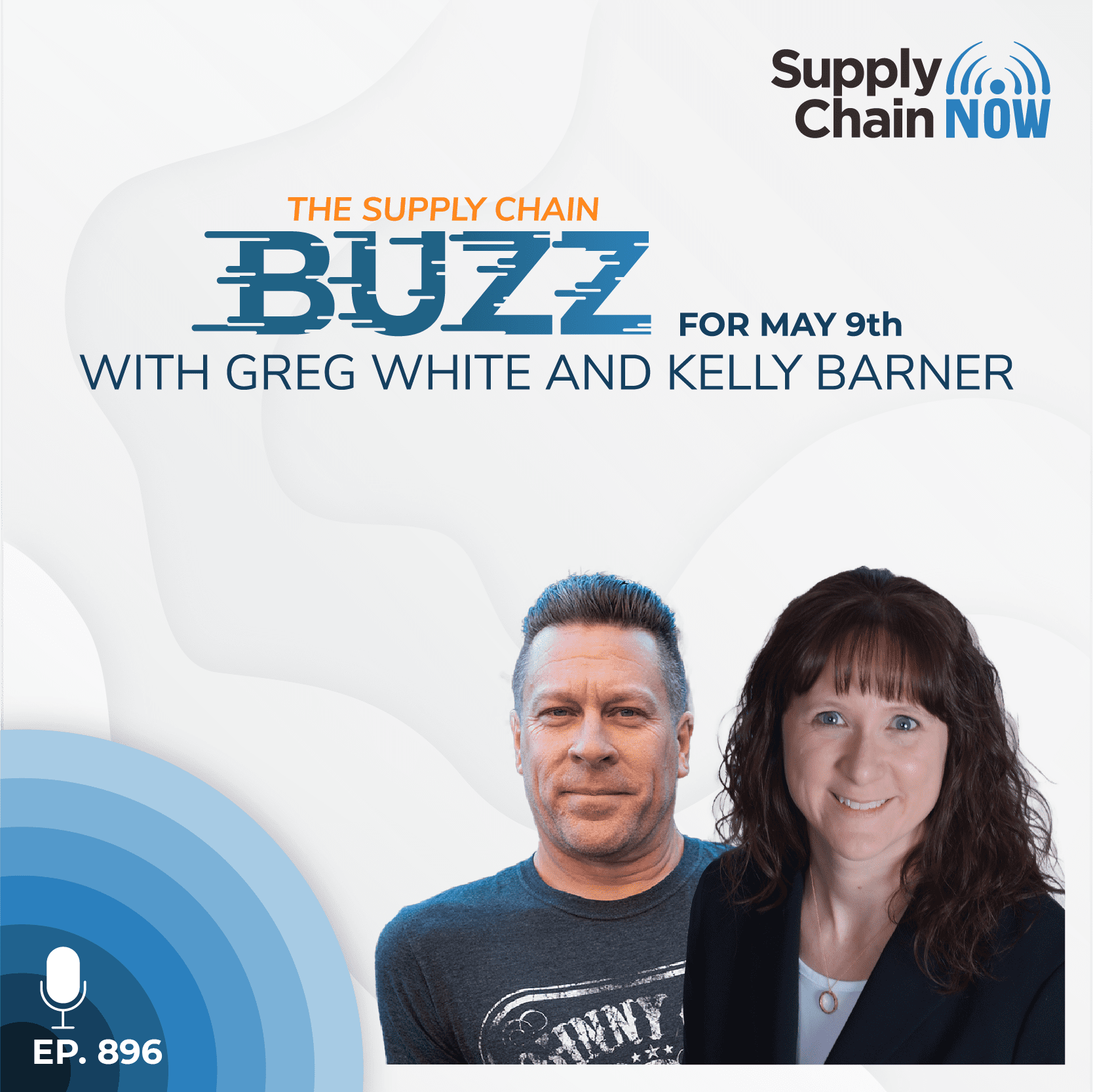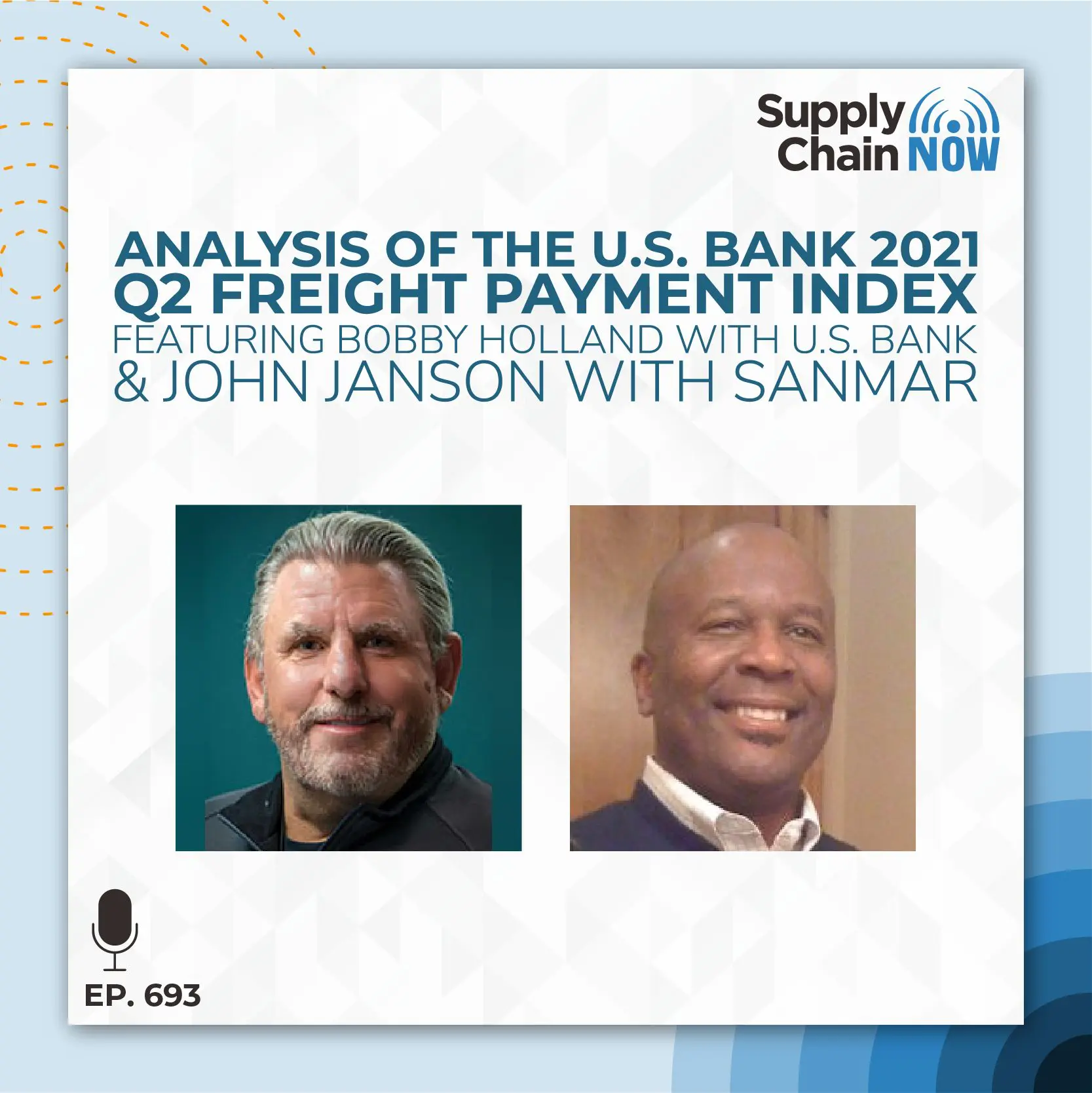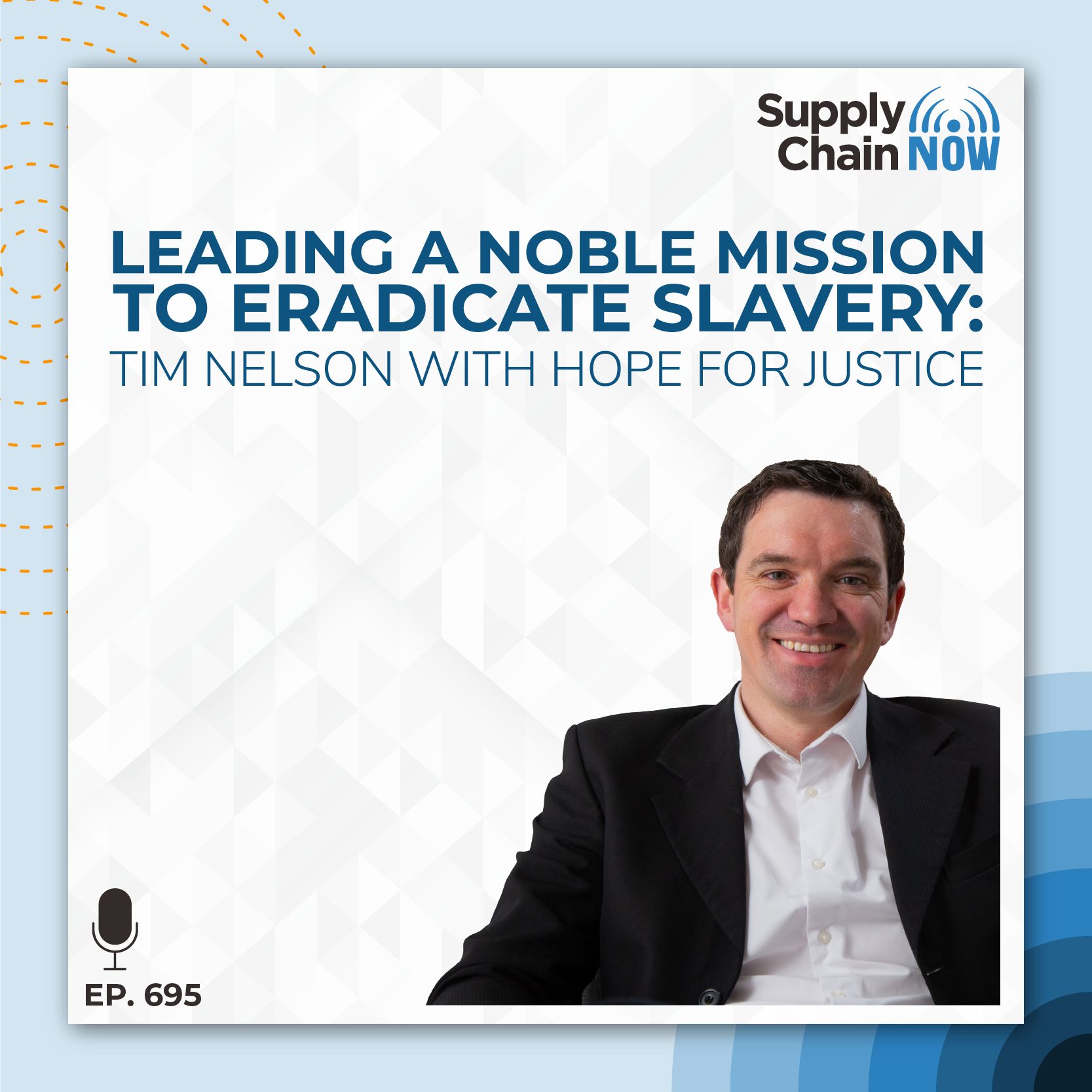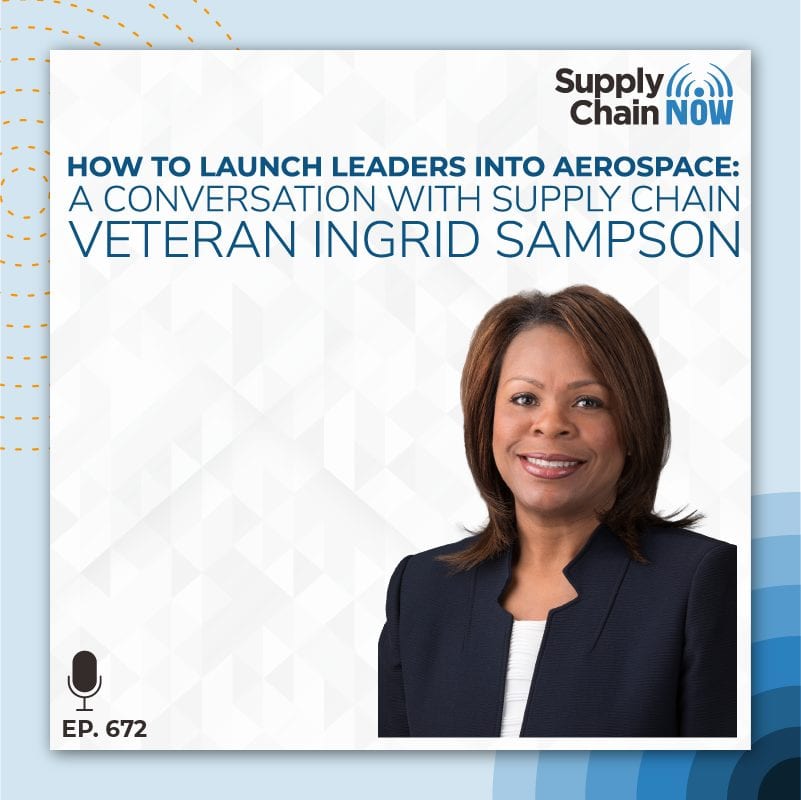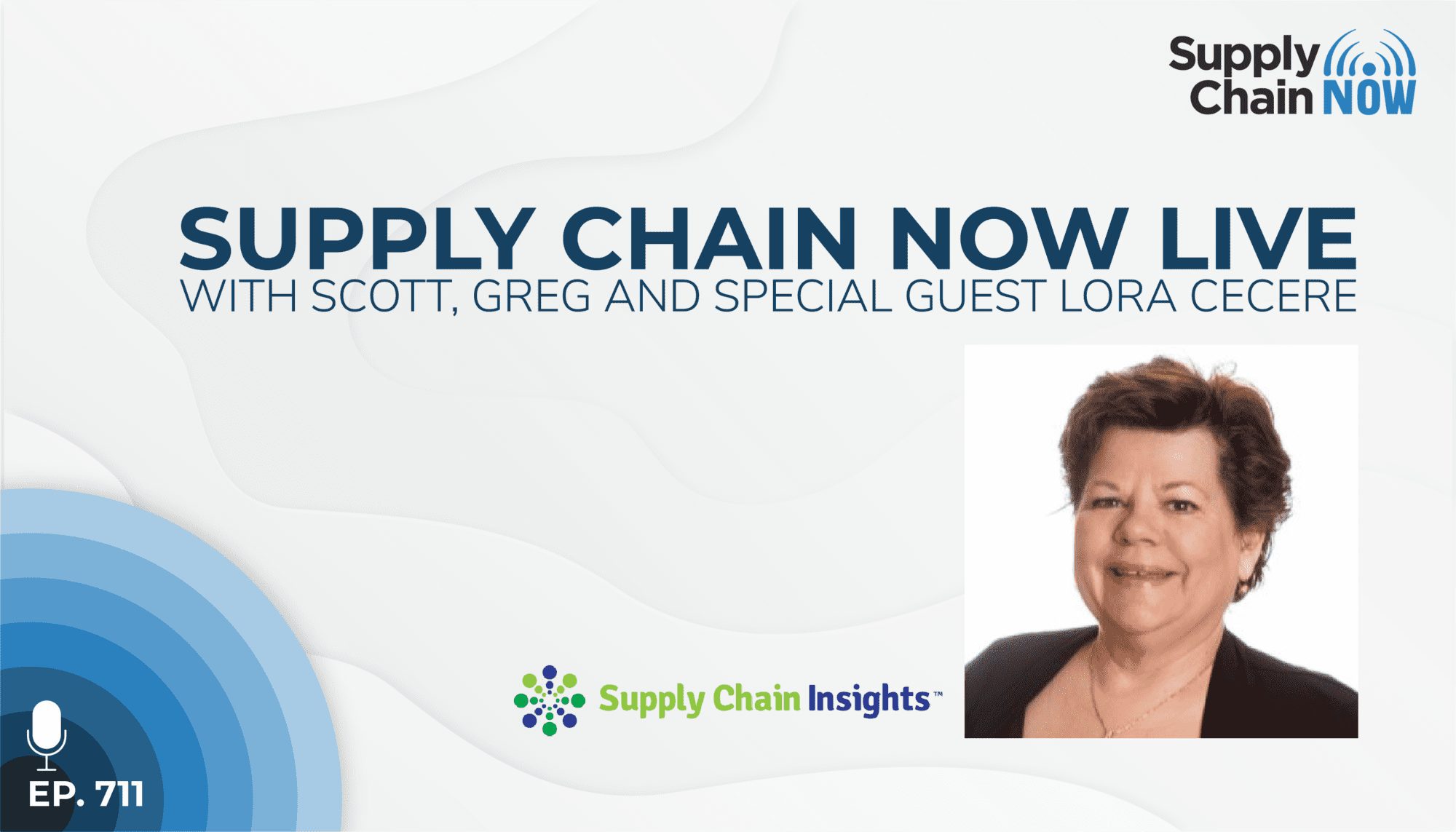
How do we treat people that are so critical to the supply chain, whether they're a distribution worker or a trucker, and why can we not change our practices to be better shippers and recognize the needs of what it takes to deliver goods?
-Lora Cecere, Supply Chain Insights
Episode Summary
In this episode, Scott and Greg join Supply Chain Insights Founder Lora Cecere to take stock of supply chain past and present. We celebrate the life and contributions of one of the greats,“The Great Connector,” to be exact. And in honor of Roddy Martin’s life and many contributions to the field, we also move forward by looking forward – to new industry events like the Supply Chain Insights Global Summit, strategies for coping with global events like COVID-19, and solutions like automation that can create a more ethical, equitable supply chain everywhere – including the United States.
Episode Transcript
Intro/Outro (00:00:03):
Welcome to supply chain. Now the voice of global supply chain supply chain now focuses on the best in the business for our worldwide audience, the people, the technologies, the best practices, and today’s critical issues. The challenges and opportunities stay tuned to hear from those making global business happen right here on supply chain now.
Scott Luton (00:00:32):
Hey, good afternoon, Scott Luton and Greg White with you right here on supply chain. Now. Welcome to today’s live stream, Gregory. How are we doing?
Greg White (00:00:42):
I’m doing good, Scott, how are you? I was just making sure we were on the proper side. So Gary is not, uh, put out by, although we’ve flipped again. Haven’t we? So, oh,
Scott Luton (00:00:53):
Greg always look at it as if we’re on the same side. My friend always on the same side.
Greg White (00:00:58):
I like that. And I think Gary would prefer that we’re always on the same side.
Scott Luton (00:01:03):
Well, we enjoyed our pre-show conversation with our featured guests and the rest of the team here today. Lora Cecere will be joining us the one and only Lora Cecere. So huge opportunity to enhance your supply chain IQ. It’s great to have her back on the show, right?
Greg White (00:01:18):
Every single time. Yes. Yeah. How can you, how can you listen to Lora and not get smarter or not? You know, I really really thought through that statement. I mean, that’s, it’s true. You, you better get smarter.
Scott Luton (00:01:34):
I liked listening to some of the COVID discussion on the front end and, and lots of good, good comments made, but one of them in particular, and I think this is a universal and I think is very related to business and supply chain is you gotta be able to have an honest Frank conversation. Yeah. And that is lacking in so many different areas, including with conversations own related to COVID-19. So to folks that is hopefully one of your key takeaways, whatever you do to rest of the day, make sure
Greg White (00:02:02):
That’s all you need to know. Thanks for coming everybody.
Scott Luton (00:02:05):
But Hey, don’t miss our, uh, Lora Cecere latest appearance right here, own supply chain now. And we’ll get to Lora in just a minute.
Greg White (00:02:13):
So when we get to wait before we get to everybody else and the rest of the lead in, can you give us an idea, Scott? Because I think it’s becoming a matter of interest of interest among the community. What are the items that are on your shirt? What is being represented, represented on your shirt
Scott Luton (00:02:31):
Today? These are sailboats and they
Greg White (00:02:33):
Are okay. It’s hard for me to see. You’re kind of small.
Scott Luton (00:02:36):
It’s a tribute to my dear friend, our dear friend Kelly Barner, who is at the Cape again this week. And I always think of selling. Yeah.
Greg White (00:02:46):
When does she work?
Scott Luton (00:02:48):
Well, you know what? Interestingly enough, I’ve gotten emails and slacks from Kelly. So she, she stays
Greg White (00:02:53):
True. Is when does she not work? Right. She just does it from everywhere. Right?
Scott Luton (00:02:58):
That is right. And man, we got some favorites tuned in already. I look forward to St. Lo, but yeah, Kelly safe travels wherever you are. If you’re listening in, uh, we are wearing today’s shirt full of sailboats just for you. So always starting with the hard hitting news. Thanks so much, Greg. Um, let’s, let’s
Greg White (00:03:15):
Talk about, it’s become part of the narrative, hasn’t it? I mean, we’ve got to, we’ve got to discover what new and interesting shapes you have on your shirt.
Scott Luton (00:03:23):
Well, I’m just trying to wear a shirt as colorful as your personality, Greg. That’s all I’m trying to do here, but always a pleasure. All right. So folks, we’re going to knock out some announcements really quick. You’re not going to miss that. We’re going to tackle three things really quick, not quick but quick August 18. Next week we have our upcoming webinar Quip. Greg, I’ve been doing some homework, you know, on our friends from equip. My wife, Amanda has known about Quip for far longer than I have. She’s a raving fan, but as I’ve been doing some homework, there’s lots and lots of raving fans, one company, I think Buzzfeed called Quip, the iPhone of toothbrushes. So looking forward to this one, huh?
Greg White (00:04:01):
Yeah. Uh, it’s. It is a smart device. I mean, it, I think it makes sure that you brush certain sections a certain amount of time and not too hard and all of that stuff, which is good because the, for those of you who don’t know, worst thing you can do is brush your teeth really hard because it curls the bristles back and then they don’t do their job. It’s actually much better to have them just lightly against your teeth.
Scott Luton (00:04:26):
That’s the closest I’ve been tried sometime in years, Greg,
Greg White (00:04:29):
Try it sometimes God, and you’ll, you’ll notice a difference.
Scott Luton (00:04:33):
So check, we’re going to get the business lesson behind Quip. We’re gonna learn about their omni-channel journey and evolution, and we’re gonna learn how they got into thousands of retail locations, including Walmart and target. So join us August 18th, 12 noon for that link to join is in the comments. Of course, we’ve got Lora Cecere here. One of the most trusted voices in global business and each year she has, she hosts the supply chain insights global summit. Now, Greg, we’re excited about being the exclusive virtual partner for the, the, the digital version of this event. But
Greg White (00:05:02):
You got register, right? Yeah. This right here. First of all, is the best graphic in the history of supply chain. I just love this graphic, but I mean, it does kind of represent exactly what we’re doing here. And you know, in our virtual and physical world, this is a great opportunity for you or someone you love or someone you care about in supply chain to learn from the very, very best and every year, Lora herself. But also those she brings to talk to practitioners are hugely valuable in bringing a ton of knowledge, pony up the bucks, put a crowbar in your wallet, pry the money out and get here.
Scott Luton (00:05:45):
You can learn more at the link in the show notes or supply chain insights, global summit.com. And finally a we’re going to celebrate a lot of good news while doing good work, uh, December 8th of this year, the first. So it’s a reincarnation of an event we’ve hosted last couple of years, but it’s the 2021 global supply chain and procurement awards. You can learn more at that URL or in the link and just know this. Not only are we gonna, we gonna be celebrating lots of good news, successes, wins challenges, come back, stores, you name it really across global supply chain, but we’re going to be supporting financially and via uplifting the message of hope for justice, which is a nonprofit that has laid out its mission to eradicate global slavery. So talk about some Frank conversations. We need to have Greg plenty in that regard, but y’all join us. Register nominate sponsor. And we look forward to seeing you in December. Okay, Greg, let’s say let’s do a few folks and then we’re going to be switching in the one only Lora Cecere, Peter Beaujolais all night and all day, Greg, his ear should have been burning this morning,
Greg White (00:06:47):
Right? Yeah. We were talking about him and Steve, Keaveny both in a, this top secret discussion that some of you may get to read about in the fight.
Scott Luton (00:06:57):
We’ll see. But Peter, great to have you back grub. Great to have you back via LinkedIn. Remind us again where you’re tuned in from everybody. Yeah. I’m going to
Greg White (00:07:05):
Guess that’s India. Let me see if I’m right.
Scott Luton (00:07:09):
Let’s see. Let’s definitely see if you’re right, Peter. You miss the number 700. That’s okay. You have plenty of chances to get that
Greg White (00:07:14):
Back. It’s still out there. Go back and listen. It’s worth it. Right.
Scott Luton (00:07:18):
But you are here for Laura. One of our favorite conversations. Sure. Nevus. Hello tuned in via LinkedIn from India. I’ll tell you. He is becoming Mr. Consistency. Uh, sure. Nevus is always here. Looking forward to hearing your thoughts here.
Greg White (00:07:32):
Yeah, boy. And he must be a night owl because it’s 10:38 PM. Depending on what part of the country he’s in India.
Scott Luton (00:07:42):
Really? Yeah. Well, yeah, confirm that time. Sure. Name is let us know. But looking forward to your POV here today, Marlowe from Dallas, Texas. Thanks, Marla. You nailed it in one message. All tuned in via LinkedIn here, Joseph, Maretta hope this finds you. And he’s up in the New York area, I think, or at least the Northeast. And he’s got a new podcast, relatively new podcast. So share information about that. Joe Jose. Hello from Southern California where I bet it’s a
Greg White (00:08:12):
Wonder what the weather’s like. I’m as gorgeous, easiest job in the world is meteorologist in San Diego, California. Let me guess. It’s sunny and 73. I bet you’re within a degree or two. Yeah. As
Scott Luton (00:08:28):
Leah is back now, Greg, you may have caught our live stream yesterday with Transplace and I think Azalia may have stumped a data scientist with a couple of great questions. What are you serious? Oh yeah. I’m kind of
Greg White (00:08:42):
Halfway question. I did not see that. It
Scott Luton (00:08:44):
Was basically, she was asking, you know, so as lay, as a data analyst that maybe a data scientists of her own, she’s also a biomedical engineer graduate, but she was talking about of the outliers and some of the really non signals that you’ve got to call out as you’re analyzing toggle waves of data. So you don’t read into the wrong things. Aren’t true signals. And, and I butchered that question as a layer, but you asked it a lot better than I did, but really enjoyed. Maybe she
Greg White (00:09:11):
Can post it here today. Maybe not that we’ll do any better with it.
Scott Luton (00:09:16):
Uh, and then finally, hello. Peush great to see here via LinkedIn, let us know where you’re tuned in from. Look forward to your comments. All right. So Greg, are you ready? We have got to introduce really just not introduce her by knows Laura says Siri, but I want to share a couple of things before we switch her in. Are you ready? Yeah. Wonderful. Wonderful. It looks like Jim Maretta is dropping the links to supply chain briefs in the comments. You’ll check that out. All right. So our guest today is founder
Greg White (00:09:45):
Of that’s what’s on the show, not what he’s doing the show in. So
Scott Luton (00:09:51):
That’s a good call-out Greg. I think I’ve made that mistake before. So our guest today is founder of supply chain insights. She’s author of the popular blog supply chain, Sharman hosted a long running podcast. She was podcasting before it really became cool straight talk with supply chain insights. She’s host and partner, as we mentioned for September’s big supply chain insights global summit. And I love this mission. We love genuine noble missions and this is a good one is simple to help supply chain make the world a better place. So with all that said, let’s welcome in Lora Cecere, Lora. Good afternoon. How are you doing
Lora Cecere (00:10:28):
Awesome. It’s just always good to be switched. Yes.
Greg White (00:10:35):
Well, how much you appreciate it? In particular, many people remain amazed and somehow confounded by it. But you have embraced the swoosh
Lora Cecere (00:10:46):
Old lady being swished. Yeah.
Greg White (00:10:49):
Well I, what I think I love the consistency also of your chrysanthemum there. So when can we expect to see, am I seeing some color on that right behind you there yet? Or when do we expect to see some color on that thing? It’s
Lora Cecere (00:11:02):
A poinsettia and Zetas or holiday, right? Greg, you know, Christmas in August. Nah, not happening. Right. We got a little time and hopefully we’re going to be talking even in the holidays and we can unveil it.
Greg White (00:11:19):
Okay. I’m just trying to see if there’s a preview that we can get. No,
Lora Cecere (00:11:24):
No, no plant blooms before its time. Then getting a poinsettia to turn red as a whole process.
Greg White (00:11:32):
I presume that you have that process under control.
Lora Cecere (00:11:36):
Well, see, you know, we’ll check back into the holidays right now. It’s just enjoying the summer. Yes.
Scott Luton (00:11:44):
Yes. Gardening’s gardeners to admire new lists published about Lora Cecere perhaps in the future, but we’ll get some points he updates for sure. I want close out one loop. Lora, you may have seen us talking about Southern California before you joined us. Jose’s confirming. Greg’s take, if you’ve ever wondered what paradise looks like. Weather-wise at least Southern California is the close version of it. I love it. Ziggy. Ziggy say, come on Greg, he’s critiquing your garden. I don’t
Greg White (00:12:12):
Know why I always confuse those two. You know, we have chrysanthemums in our yard, which look, nothing like a poinsettia, but poinsettia.
Scott Luton (00:12:21):
And then one final comment here I love is that he’s got a nice sense of humor. The new podcast is not relate to the clothing choice, although perhaps the supply chain behind the clothing briefs would be a good topic. So we’ll see jokes
Greg White (00:12:34):
Great still in, still in good supply, I believe, but unlike the great toilet paper shortage of 2020, uh, well, Lora,
Scott Luton (00:12:42):
We’ve heard plenty about toilet paper this year and computer chips and many other things we’re going to start this conversation. And a lot of times we have a lot of fun on the front end. As we get to know Lora, a little better, we’re gonna start on a, on a more somber note. But before we talk about the late great Roddy Martin, I’d like to, you made a great point that you and Greg were as y’all were exchanging perspectives around the pandemic and, and really from a data and scientific standpoint, I believe it was you that made the point about having the, you know, the value of a really Frank genuine data centric conversation. And that’s not arguably maybe not as common as it used to be. Can you, would you elaborate a little bit more on that and then we’ll switch gears and talk about,
Lora Cecere (00:13:21):
Well, I think that many supply chain folks, but you know, vaccine in the arm, COVID behind us pandemic behind us, you know, new normal, but that’s not going to be what happened. Right? Traditional supply chain risk management was always, we would have an event, a hurricane, you know, big fire earthquake, and we’d all rally and we would have recovery and then we’d reach a new normal that what’s happened in a pandemic is disruption after disruption, after disruption and the disruptions are local and they’re changing, right? So I was talking to people in Dallas yesterday, one ICU bed in Dallas, right. And you know, we’re opening up the Canadian border and think heaven’s India is getting to be better, but global supply chains are about, you know, how do we land to execute regionally? And how do we sense and respond? And traditional supply chains don’t sense very well.
Lora Cecere (00:14:28):
And our logistics are all screwed up. I mean, you know, whether it’s air or ocean or road, right. And we’ve always assumed that transportation’s available. We’ll just negotiate price and shippers aren’t necessarily good shippers. So the pandemic and what’s happening in COVID is really here to stay. And I, you know, we were talking about when the pandemic started, you know, the analogy was, it would be like, you know, the flu where, you know, every year we know there’s going to be a flu and it’s just a different strain of a flu and we get a different vaccine, you know, if we want to, based upon that strain and we take precautions. So question is how do we have the preparation for what’s happening in the coronavirus as part of the normal and how do we sensitive adapt more readily because supply chains don’t sense very well.
Scott Luton (00:15:27):
Um, I enjoyed that commentary, enjoy the conversation. Pretty sure. Greg, I’m gonna give you a chance to kind of follow up and then we’re gonna move into talking about industry Titan. Any additional thoughts
Greg White (00:15:37):
On that, Greg? Yeah, I think we’re numbers people a lot in, in supply chain, right? We, we trust the data. We believe the data. I mean, obviously we don’t trust it without scrutiny, but you know, there was a time when, just as Laura was saying that doctors recognized and published. And now that I’ve said that, I’m sure somebody’s going to want to see the article, which I have kept, but I’d have to dig it up. They said that this was not a deadly enough virus for it to kill enough hosts to go away. So the statement that was made by this particular Harvard doctor was we’ll have to accept that there will be cold flu and COVID season. And that has clearly born out to be true with all of these variants, Delta and Lambda, just being two of the latest and most prominent. But we kind of lost track of that, which by the way, is not a bad analogy for supply chain because there are also rules and norms and science that go into supply chain that we get emotional about in supply chain and lose track of.
Greg White (00:16:40):
And, you know, there’s, there is a lot of alignment there and I think we’re starting to come around now to where we can have an intellectually honest discussion discussion. We’re starting to see more scientists and more doctors actually come back to that message, the message that this is a more of a, a cold type, not cold, but a COVID recurring type virus rather than a, uh, tremendously deadly world vendor. And we’re starting to see people start to be able to have that conversation without being shouted down. And I think that’s when we’ll start to see some real solutions put forth, which will give us the ability to start to stabilize things a little bit. I thought, I mean, it’s probably a year away, but you know, that it’s, that it really the real impact of that hits. But I think we’re going to start having a more intellectually, honest discussion much sooner than that.
Scott Luton (00:17:40):
All right. So Laura, you’re shaking your head a little bit. You think it’s gonna be longer than a year?
Lora Cecere (00:17:44):
I do. I think that the repercussions of what we’re going through, it’s the fallout on local economies, state and local government hospitals. Um, you know, how we do business, you know, we don’t know what the new variants are going to be. Uh, I think that we’ve just really got to change supply chains to sense outside in and respond. And one of the unfortunate things that I observe as supply chains have become more political over the last decade. You know, Greg, you say that supply chain leaders, you know, center themselves in data. I wish that were true. My observation is that as we’ve become more global and we’ve become more functional that we have just horrible political discussions about what does the data mean? You know, and how do we deal with the data versus, you know, how do we work together? So
Greg White (00:18:43):
They want the data to mean Lora, to some extent, right? And
Lora Cecere (00:18:47):
The alignment between commercial and operations teams has a greater Fisher today than it did during the great recession. And I think we need to say what we’ve done in the automation of the functions because DRP models don’t match transportation, logistics, models, manufacturing, finite scheduling is typically not working on schedule adherence with the tactical plan. The single threading of planning through functions is a problem. The fact that we want to get really precise on imprecise data and forecasting is a problem because what we really need to be looking at is how do we plan in the face of variability? The increased variability and supply is an issue, right? But yet we don’t have supply chain master data where we’re looking at shifts and in transit, right? So I think we’ve got to change our mental models to be able to sense and to challenge historic practices and challenge our leaders to improve the alignment outside in with commercial teams and operational teams.
Scott Luton (00:20:03):
All right. So we are at 19 minutes in, we have already, uh, that is all that’s worth the price of admission. I wish we could dive, spend several hours continuing this segment through, but we got some other stuff I want to, I want to get you and Greg both the way on. And of course, all the folks in the, in the sky boxes, Peter makes a great point because this is part of the, part of the challenge. One of the many challenges we’re at here. So he says here in Quebec, the passport is being rolled out September 1st. You’ll need both vaccines to go to bars, restaurants, events, any place essential, non passport, no goat already. The craziness is starting because workers in those places can not be mandated to be fully vaccinated. Kyle says, never thought about that mandate. And by the way, Kyle also loved your comment there.
Scott Luton (00:20:48):
Supply chains have become more political preach, say it louder for folks in the back. Laura, excellent point there. All right, so let’s move right along. Um, in Lora Love of the stuff that we want to get to, including, you know, global business lost a leader, uh, leadership and, and really an industry Titan as well thought of globally in the late Roddy Martin now lived a full life. I’ve been reading lots of different takes on his journey. And, and various obituaries is really sought after for not just supply chain expertise, but digital transformation, expertise, change management, and so much more. It’s tough to doing justice as we’re trying to tee up the segment in a couple minutes, but one of the nicknames he earned was a great connector. And Laura and Greg Kevin Amara put together probably one of my favorite pieces about, uh, Rodney Martin. And he said, quote, Roddy was a human embodiment of what supply chain means to the world in quote, Greg, Lora, how would you like to be quoted as that when you, you pass this world into the next one, but Nope, Lora, you worked with Roddy Martin at AMR research.
Scott Luton (00:21:51):
I think for almost four years, I enjoyed your piece that you put together as well. What’s a couple of things that only you would like to have folks know about Rodney, but what do you think he and his family might, would also appreciate about who he was?
Lora Cecere (00:22:07):
Right. He was a very unique and bright individual. He had a very forward looking perspective and he loved open debate. And some of my first and most memorable thoughts about Rodey are the intense arguments we used to have on a whiteboard. I mean, w Roddy and I would go at it like brother and sister for hours drawing and racing. And, you know, I miss that. And I think Ronnie, miss that too, when he left AMR, which is why we reconnected. And we actually in the last decade had just some wonderful discussions virtually about what was happening and what could happen and what the barriers were. So the first thing is just a very bright, creative caring individual. The second thing is Rodney had many dimensions, right? He came from South Africa with suitcases, with his family. You know, he took the plunge when Bruce Richardson went to see him in South Africa to say, become an analyst.
Lora Cecere (00:23:13):
He started as a machinist and he worked in a beer manufacturing in South Africa and he came to the United States with a couple of suitcases and usually used to laugh. And he had pictures in his office about, you know, making the journey to the United States and, uh, you know, shift and citizenship and moving his family. But imagine the leap of faith to move your family from South Africa to become an analyst from a manufacturing world, starting as a machinist. And, you know, he loved horses and, you know, he worked in, you know, military around horses and horse training and he loved water sports. And one of my very favorite pictures before he died, he swam the buzzard bay, you know, as part of an events. Right, right. When he first was starting to get sick and, you know, he has this great picture with this metal on his neck and he says, Lora, we never get old.
Scott Luton (00:24:16):
Gosh, it’s so tough to do. I appreciate you sharing all of that. Again, it’s tough to do justice, to such a, um, a huge personality that had so many different complements that was so trusted, a trusted resource for leaders around the world. You know, that story that you mentioned of where he basically packed up what he had and a couple of suitcases and moved to here to the U S from South Africa. It reminds me Greg of a Hannah Kane and alum who, uh, who we have interviewed. And she had a very similar experience and she may not have had even two suitcases. She might have one. Great. If you remember that. So what, you know, Greg, I know you’ve, we both had done our research and, and kind of, you know, I never had the good fortune of meeting Roddy Martin, but I really have enjoyed kind of piecing together who he was and what he meant from all the different takes, similar to what Laura has shared here today. Anything stand out the most to you, Greg, when we talk about Rodney Martin,
Greg White (00:25:08):
Uh, I think the biggest thing is exactly, you know, what he’s known for is for connecting people for the intellectual honesty that Laura has just, you know, has just talked about his ability to his ability, to have a very distinct point of view, to communicate that point of view strongly and yet to do so in a way that is intellectual and not personal. And, and also I have to tell you, I, I would have never guessed rati this, this is, was a bit of a surprise to me. I would’ve never guessed Roddy to be subject to the sales Wiles of Bruce Richardson. I mean, I know Bruce could sell, you know, he could sell ketchup Popsicle to a woman in white gloves, but I would’ve never guessed that he could get Roddy to come to the states like that. I did not know that aspect of his life, so that’s pretty impressive. And I think it does show in a way really it does show a lot of his breadth and depth.
Lora Cecere (00:26:10):
And I, and I think also Greg, what Rodney taught me was intellectual debate. Shouldn’t be personal. And that is actually one of the key learnings of Laura she’s matured, right? I, I fight things hard and, you know, intellectual debates are something that I really love, but Rodney used to always say to me, you know, let’s go forward by going forward. Let’s agree to disagree. Let’s go forward by going forward. And I, you know, at first I didn’t understand that statement of let’s go forward by going forward. It’s just sounds simple. But really what he was communicating was let’s not let her intellectual debates, which they were really hard fought. I mean, Rodney and I were active in intellectual debaters. I mean, you can only imagine let’s let, don’t let that discourse stand in the way of our ability to work together.
Scott Luton (00:27:05):
I love that, that let’s make sure we capture that supply chain now team big, thanks to Jayda Amanda, Allie and clay behind the scenes. Let’s, let’s go forward. Let’s move forward by going forward. And it’s, so it’s such a simple lesson that seems like, maybe learn about the power of agreeing to disagree, but gosh, and this, these vitriol at times, we collectively, we’ve really lost that ability to do just that. And, and you know, whether it’s social media, whether it’s a variety of issues that are so filled with friction and, and maybe personal feelings, that’s going to be an important element to truly moving forward and get more stuff done that that industry needs next generations need and consumers need, frankly. So I appreciate you sharing that, Lora. Uh, one more question about Rodney Martin and let’s make sure also team, if we could drop, uh, Lora interviewed Rodney up, I’m sure plenty of times, but on our podcast, I want to offer that, that link in the comments, we could drop that, but w when we think of his legacy beyond what you’ve shared, anything else that you think would be important? Of course, he’s well-known and I never saw it, but this, this 80 slide PowerPoint.
Greg White (00:28:10):
Yeah. Oh my gosh. How obvious is that? I can’t believe I forgot that. Yeah. Yeah.
Lora Cecere (00:28:16):
You know, so we all told Rodney stories, right? He had the ugliest slides known to man and, you know, the decks were an 80, they were usually a hundred, 150, and he loved help cleaning them up. And I was his girl Friday for many years, cleaning up those PowerPoints. Right. And I would, I would work hard to clean up the PowerPoint and it would be like he would smash in new files and, you know, but, you know, he had lots of energy and he was well loved even though the PowerPoints were ugly. And I would say another kind of funny story about Roddy is Roddy tended to sometimes kind of after lunch, his head would not, you know, and we used to always set somebody beside Roddy, you know, vendor briefings to keep him awake, you know, like Walmart. Right. And I got to tell you when the elbow came and he came back, you know, to consciousness, it was like, he missed nothing. Right. I mean, his eyes could have been closed. And I mean, you know, you could tell that he was in sleep, but he could listen and his sleep. It was incredible. It was, it was sterile.
Scott Luton (00:29:27):
Oh gosh, uh, paint such a great picture. Uh, I really appreciate you sharing Lora w he will certainly, uh, that justice there’ll be more than missed, but he’s made a massive impact. He set the bar high for what the impact that leaders should be making and the way move the needle and how you do connect, what supply chain is doing to driving real change, meaningful change globally, um, when it comes to business and a lot more. So I appreciate the opportunity to
Lora Cecere (00:29:53):
Go ahead. I just closed with two thoughts, right? And Roddy’s LinkedIn page. He has a statement of making outside and processes easier, and we’re not good at that. Right. We don’t, we haven’t unlocked that power. And I still think that’s a wonderful thought. And then I’d also love for you to drop the link about the scholarship that is being started in Rodey’s name for Pretoria university, for others that maybe were touched by Roddy that might want to contribute to help another student South Africa find his way into supply chain, his or her.
Scott Luton (00:30:30):
Absolutely. Let’s um, we should have had that. I should have had that. Pre-show, that’s a great call out there. If we could Google that really quick and then drop that in the comments as well, team. I appreciate y’all’s flexibility and nimbleness. If that’s the right word. Um, a lot of comments here, Greg. Well, I kind of start teeing up his comments. Give us some of your, um, what, what are you thinking of as Laura shares these reflections?
Greg White (00:30:52):
Well, I think, I think it’s, um, important for us to think about the fact that leaders and opinion makers and experts in this field like Lora had at one time, a mentor who helped them get to there. And even, I mean, I think we’ve all sort of throughout our careers thought of Laura is one of the greats, but to, you know, to think about the fact that at once she was just a fledgling practitioner or analyst or intellect, like the rest of us are you have to acknowledge that no matter how great you are, someone helped get you there. Someone helped shape you help guide. You, helped you, um, you know, find your way in the industry. And I think that frankly, oughta be really, really encouraging to people. Not everyone will be Roddy Martin or Loris Siri, but if you hitch hitch your star to someone who is as intellectual and intellectually honest as Lora or Roddy, then it will undoubtedly improve your career.
Scott Luton (00:31:54):
Yep. Well said to you both. All right. I got it. We’ve got so many comments on. I wish I could get to all of them so much good stuff here, but I got to go back. Uh, this is art measure. You know, the one only came on, uh, I can’t remember exactly how we phrased his, his, his chat with Karin and I, but there’s something like, um, uh, uncontained or something, but he brought it much like Laura does he’s he says not only political when it comes to supply chain, but there’s an important woke around ESG and circular economy impacts slavery, et cetera. There’s a new social transparency that is political, but not in a bad way, in a good way. We must make it all better in what we do. I love that art. Okay.
Greg White (00:32:33):
I think all of those things that we talk about that you want, you can call them social or whatever you want, but they contribute to the stability and the predictability of the supply chain. Right. So I mean, if, if you won’t do it for the right reason, do it for selfish reasons, but do it right, right. Because if you’re not operating in a place where people are enslaved to do the work, to build your thing that that does, if you aren’t subject to that, that does accrue to the benefit of your supply chain.
Lora Cecere (00:33:04):
Excellent point. Well, and to art’s point, you know, I wish that we would stop greenwashing the supply chain and get to authoritative identifiers for true track and trace and build value networks that have interoperability. We can’t really track and trace to put our muscle behind our words for fair labor or for organic food and safe and secure supply chain should be part of our mission to be able to do what are just talking about with the circular economy and, you know, ethical supply chains. And most corporations don’t know how to do that. And arts and investor. So art, I’d love to see you put your money where your mouth is and bring those companies to bear,
Scott Luton (00:33:49):
Hey, you know what we’re going to have to get, uh, Greg, uh, Laura and art together. Gosh, that’d be like, that’d be NFL of supply chain leagues. I don’t know. I can’t come up with the right analogy there, but, uh, uh, Charles heater says excellent point, Greg, that power of mentorship and really beyond the power of mentorship, the responsibility to be a mentor of, of giving forward as, as Greg you’ve coined here, also, we have, we have found and dropped the link to the, uh, to Rodney scholarship. Y’all please, uh, click on that. Uh, if you can support it no matter, uh, Greg, I’m not stealing your phrase. What do you, what do you say when it comes to donating infant infamous?
Greg White (00:34:31):
Oh, you mean, give, give small, give simple give now, is that what you mean? That’s what I’m talking about. Yeah. Yeah. Words
Scott Luton (00:34:39):
To live by. Okay. And hello, Ron.
Greg White (00:34:41):
Start sailing to start small start simple. Okay.
Scott Luton (00:34:46):
Oh gosh. All right. So Rhonda, great to have you here as well. And Charles, thanks for that. I always a pleasure to have you in our lobby streams.
Greg White (00:34:53):
Oh, I think, uh, to Laura’s point also, I think, and, and, you know, it’s funny because we had this whole discussion about how the sec is going to compel companies to report in a formatted way on their ESG initiatives, particularly around sustainability, but there are also those initiatives around human slavery and trafficking and that sort of thing. I think we have to acknowledge as consumers, that every time we buy something from someone who is a bad actor, we are voting for that bad act. We are voting with our dollars with that bad act and we need to, and there is the ability to, and in that post, I wish I could pull it up right now. But in that post, there is the ability to, and the links for places where can go to see you as a bad actor. I have hammered ADI DAS for their participation in gin, Jong Nike, and H and M and ADI DAS have made a very significant effort to get out.
Greg White (00:35:48):
And I have to tell you, it has damaged their business in China because China is actively has active retribution against them. You cannot get to an H and M store in on a car service in China. Now they have erased their stores from the maps in China. So they are paying, they are willing to pay the price. And that is because we, the consumers have voted with our wallets to, you know, to support and, and not support certain things. But, you know, that’s, that’s an important acknowledgement we need to make. We are the beginning and end of the supply
Lora Cecere (00:36:23):
Chain and it takes leadership, right. I remember when Danny Wagman and Coca-Cola got together and Procter and gamble, and we came up with a barcode 1980s, but at the start of the pandemic, only 20% of medical devices were GS one compliant. Now medical device firms make 20 to 22% margin. There is no excuse for that net margin net margin, right. And yet I read all of these beautiful statements, the J and J credo, right. You know, but when I talked to medical device company, if you want to help in the pandemic, let’s get with authoritative identifiers, let’s build value networks, let’s track and trace, let’s improve the safety and security of the medical and healthcare supply chain. It’s not happening. They’re, self-centered serving only the balance sheet and I miss the leadership. Right. Right. You know what Sandy Douglas and Danny Wegman did for CPG needs to happen in all value chains? Well,
Scott Luton (00:37:33):
You know, as, uh, a couple of folks have pointed out, you know, rather than the greenwashing, and rather than maybe a societal improvement, washing whatever, you know, inserted lots of different words, you could put there, a stronger spotlight with stronger industry approved metrics and standards, uh, will help the reckoning that should be taking place. Uh, Greg, you know, speaking to, you know, we could, we could talk for hours around China. Uh, I had some conversations with my own kids about different elements that, that are proven and acknowledged to take place there. And it just, it blew them away. And it looked, every country has its opportunities, but, but what is state sanctioned there? And what is, um, it is, it is a travesty and, um, and a reckoning does need to take need to take place, but all right, let me, let me kick that soap box over to the side.
Scott Luton (00:38:21):
I don’t want to steal it from y’all. All right. So speaking of holding folks accountable, we’ve got to hold ourselves accountable, right? That’s as important. And you had a great article, you published in late July, Laura, about just that holding ourselves accountable for business results. And there’s look talking about things that we’re not going to be able to do justice to in, in, you know, 15 minutes ties Chuck chunk, um, chock full of key takeaways. I love the, you know, your, your commentary about really defining what supply chain excellence is to, you know, all the ERP. You know, the ERP is becoming such a major, uh, $78 billion market by 2026 is what it’s projected to be according to one source out there. But I’m going to come to you first. Laura, I’d love to get what you think are the most important points from that piece. And then Greg, I’m circling back to you to get, uh, your, the same, uh, take from your slower. What should folks pay attention to in that piece?
Lora Cecere (00:39:20):
I think three things, one inventory is both waste and buffer, but we entered the pandemic with 20 more days of inventory than we had 2007 at the great recession. And if you drive up every major freeway on either side are warehouses full of inventory 20 more days, but yet we push cost and waste back in the supply chain by extending payables. And when we do, we penalize suppliers and we penalize carriers, carriers are very fragile right now. We don’t have enough drivers. You know, we should be talking about early payment, not payment, net 90, right? So the management of cash to cash ethically and recognizing where we are and taking responsibility for all of those warehouses, which causes issues with runoff and destroyed inventory. And our landfills should be a supply chain mantra. Secondly, you know, resilience in supply chains at the intersection of operating margin and inventory turns actually took a downward trend and 25 of the 28 industry sectors in 2014.
Lora Cecere (00:40:46):
When you look at our ability to manage margin and inventory together, it was a perceptiveness change. And we’re just now talking about resilience and the pandemic, right? And one of the issues is because we focused on costs, not on margin and only 29% of companies can get to cost. And most people only can get to functional costs, not to total costs, which throws the supply chain out of balance. And in most cases we’re shifting demand versus shaping demand, which is increasing costs and really destroyed margin. So, you know, resilience is important, but we really need to look at the patterns of those industries and think differently how we’ve run these companies. So
Scott Luton (00:41:34):
If I can, uh, I won’t get Greg’s take on what you just shared there. Cause, uh, Craig, I bet, I bet you had, uh, some great epiphanies as you’re reading some of, uh, different pieces of this article. What comes to mind for you, Greg?
Greg White (00:41:49):
I think what, um, continues to vex me frankly, is, and I have this conversation with Tim Hinkley, formerly of FedEx and radio. What continues to vex me is some of the problems that have been solved, waste being one of them, risk management in the context of managing risk and managing resilience without breaking the bank in terms of inventory, how that problem has, I wouldn’t say solved, but is much, much better handled at the finished goods, retail and distribution level than it is at the manufacturing level. And I think largely that’s a function of exactly what Laura talked about with pharmaceutical and medical and other, other manufacturers, their gross and net margins gross is in all capital letters with most manufacturers and their net margins are so high that they have traditionally been sloppy with their inventory management. And it has created a lot of waste in the supply chain and yet waste without resilience.
Greg White (00:42:55):
It has been kind of a mass market appeal, more of everything rather than more of targeted things. More of those things that are risky. If we’re talking about buffer stocks, Laura, right? It’s more of everything, not more of this thing that has greater risk of, or more of this thing that has less reliable demand or, you know, and, and some of those bad practices, they are just exaggerated at the manufacturing level. And it stuns me. I work with a company that works with manufacturers every day and it stuns me the inefficiencies that I see over and over again in these enormous companies that they work with that should be well above that. And I can only figure that is the slop that they are allowed to have in their supply chain because of the incredible margins that they generate
Lora Cecere (00:43:45):
Inventory. We really got to look at form and function and we’ve only managed safety stock and we’ve managed that badly. And I think the other thing that I’ve learned in the last decade is that leaders that do it best are good at navigating the world of gray and our investments are all about black and white. They’re about transactions. They’re about, you know, looking at data and trying to get it perfect. Whereas supply chain is and supply chain variation on both the channel side and the supply side is all about the world of gray. And so how do we change how we work so that we can have more impactful discussions in the world of gray? Yes,
Scott Luton (00:44:30):
I love all right, we got today’s comments and I got to share, they’re going to be going back a little ways, but there’s some really good stuff here going back to as Lee Davis says, Hey, before talking about some of these challenges, we’re speaking to up earlier, we were unaware, but now more and more of these poor ethical practices are getting exposed. We can’t make excuses any longer to ignore these issues if they really matter, excellent point there, that’s why these issues we’re still dealing with are cyclical and continue to impact our progress. Excellent point. So art responded, he puts his money seem to local lines. Uh, let’s say Australia Tilbrook investments made a six digit donation to CCMP launched new training center for design as good. Perhaps others can join me in making donations. Uh, there will be a tax receipt. Hey, how about that as are, those are good things to have.
Scott Luton (00:45:20):
Thank you for that. Uh, art and let’s see here, Peter made a great distinction, ERP folks. If, if you’re not with us here, enterprise resource planning system, and then finally update from Rhonda. So Laura, uh, Ronda’s husband, uh, may be switching to a new opportunity. He had an interview yesterday at a DC Ronda’s husband was offered a job at the top paying rate. I think he’s going to be turning it down though. It requires working five to 12 hour days, no overtime pay until 50 hours. And at his age with his experiences, that’s a deal breaker. And she says, um,
Greg White (00:45:55):
Especially in this market, right, I can’t count.
Scott Luton (00:45:58):
She basically added to it and said, we’re going to be burning a lot of folks out with those types of conditions. Uh, Greg and Laura. So again, I know we’re talking about a lot of different things here. I, uh, I wanted to make sure we were represent the voice of, uh, folks in the sky boxes, shifting gear. I mean, of the, we think about holding ourselves accountable. And when I hear, hear that, and Rhonda and yesterday, I had a conversation with some folks around, you know, the modern workforce management of these crazy conditions and pay rates expectations. Certainly come into mind, Laura, you’re shaking your head. What are your thoughts there? And Greg will come to you next.
Lora Cecere (00:46:35):
Yeah, it’s the U S form of slave labor, right? One of the speakers we’re going to talk about my conference is, uh, head of the women’s trucking association in the United States. And she talks about who are the worst shippers to deliver to and why, and how can shippers improve the life of truckers and help us, you know, really alleviate the issue that we have with trucking reliability. And it’s an amazing story of, you know, just how do we treat people that are so critical of this supply chain, whether they’re a distribution worker or a trucker, and why can we not change our practices to be better shippers and recognize the needs of what it takes to deliver goods?
Scott Luton (00:47:25):
Love that Laura, Greg, I know you love that as well. We’ve talked about that. A in fact, we had a, we had, uh, April truck driver with Walmart that joined us last week. And it was one of my favorite interviews in recent memory, just the sharpest, most dedicated, passionate person. And she spoke about some of that, but Greg, what else, uh, along the lines of what largest shared what comes to mind?
Greg White (00:47:47):
Well, I, you know, I think about the, the situation that we’re in these days and that there are jobs where the, the core participants are flooding away from the workplace, right? Baby boomers are still leaving the work force at 10,000 a day and they are the truck drivers and they are the warehouse workers and they are the manufacturing workers. And it doesn’t matter what we do. It doesn’t matter how we treat people in those jobs, millennials and gen Z are not going to take those jobs. And Jay and our generation are the managers of people in those jobs. So some of those jobs, some aspect of those jobs will be automated. And thankfully for that, because I, I am frankly stunned, honestly, the way that some people are treated, you know, and April gave us some stories about that experiences she’s had, or has heard of firsthand about how people are treated, particularly drivers, which is stunning, but, and also Rhonda 50 hours, I didn’t even know that was legal 50 hours before you get overtime.
Greg White (00:48:58):
I thought at 40 hours, it was legally mandated that you got overtime. I don’t understand some of these things. I feel like I feel like Phil Hartman. I’m just a simple caveman. I know not of your advanced and evil ways, but it is. I mean, it is interesting. Some of the offenses that we, we hear about out there, and I can’t believe Laura a year and a half ago, we were having the discussion when employment was at near full employment, right? At statistically full employment, we were having the discussion that you can’t continue to treat people the way that some industries and in some roles, they are treated and expect people to take the job. And now that there’s so many jobs out there and so many, so much opportunity for people, you sure as hell can not expect to be able to do that and get away with it. What are people thinking? Who are these people really
Lora Cecere (00:49:54):
Well, the lowest satisfaction rates of supply chain employees. I find our demand, planners, distribution workers, and truck drivers. And how do we redefine work to improve job satisfaction? And so at my conference, so I’ve got a demand planner and I’ve got a truck driver, and we’re going to have those discussions about how do we become a better shipper? How do we support people in jobs more? Hopefully
Scott Luton (00:50:24):
Of course, we’re talking about the supply chain insights global summit, and the links are in the show notes. And you can of course go to the URL there as well, come out and check that out. We’ve got, those are conversations we’ve got to be having, you know, can
Greg White (00:50:36):
I just 0.1 thing out, this has, this to me is, is kind of the benefit of where we are with events, like, like Laura’s event. And that is, we can’t run out of seats of virtual seats, right? I mean, I think in the past, Laura, you’ve had to limit the attendance to your, to your conference, but now you don’t have to do that. So this is a, to me, I think this is a brilliant concept. We saw AIAG do this right after the lockdowns occurred in March with their, they went virtual and physical at that point. And I think this is a brilliant way to do these kinds of things. So that more and more people who can’t travel can’t afford to travel, or, you know, as this coming with or has come with some businesses are back to travel. Bans can still attend this thing and get this benefit,
Lora Cecere (00:51:28):
Right? Yeah. So we used to have to limit it because it is a very different conference. There are no paid speakers, there’s no chotskies and booth babes and, you know, booths and I hand pick all the speakers and the theme is, imagine, and this time it’s supply chain 2030. So the themes are real. It’s re-imagined manufacturing. Where are we on 3d printing? How do we move from 2d to 3d drawings? What’s the role of, you know, 3d printing what’s possible. What’s additive. How do we redefine digital manufacturing to think about source making delivery together, use the signals and how do we drive innovation and standardization together in global centers of excellence, because we’re not good at process innovation. And then this a whole area around, how do we redefine transportation? You know, how do we use robotics and Hyperloop unload ocean? How do we improve visibility and how do we redesign to be better shippers?
Lora Cecere (00:52:35):
And then how do we redesign planning? So we don’t single threads source making, deliver through functions, but really look holistically outside in and use all the signals that are available and redefine the work of the planners. And then how do we celebrate companies in the supply chain stood Meyer, which only 4% of public companies actually beat their peer group. What can we learn from them? And how can we really think about supply chain excellence? And then how do we embrace a new form of leadership? So the conference is designed as a facilitated workshop. I bring new forms of research. So this time it’s on new forms of analytics, open-source analytics, the work we’ve been doing in projects, zebra, which is really about outside and processes the work with Western digital and BSH on, you know, how do we build outside and processes? And it’s a facilitated workshop where I challenge people to think differently to drive new outcomes, because it’s the unlearning that is so difficult.
Lora Cecere (00:53:40):
People are so no doubt, the traditional mindset of historic supply chain processes, they’ve got to unlearn before they can rethink, and they talk about change management, but we’re not actively unlearning and we’re not actively holding ourselves accountable for all those DCS stuck full of inventory that can’t get, you know, moving for all those ocean containers that maybe shouldn’t be on the water because only 9% of supply chains are designed for all those truckers that are struggling because their time’s up and there’s no place to park for all those demand planners that are not well understood. This conference is for us to start a different discussion.
Scott Luton (00:54:26):
All right. So I’m smiling because Greg, you haven’t done it lately, but a lot of times you will do this preach gesture. It is, Laura’s making those beautiful points. Now you use it when you do it well, Greg, we can see it in your face. You get the emotion in your face. So, uh, so something like that, but as Lee has a great comment, as you’re making some of those points there, as Leah says, these are the conversations that need to be happening in bore boardrooms, but probably are not, or is definitely probing the minds of these leaders and catalyzing our recovery with this event. How about that excellent
Greg White (00:55:02):
Word and L and always frankly does, regardless of an event, true, regardless of an event, Laura is, has never been afraid to challenge. And frankly, that’s why she’s on her own and not at other analyst groups is the bigger your constituency. The more refined your message has to be Scott. We were talking about that today with our, in our secret meeting. But I, I think that’s, that’s an important part of what we need to do and to, to hopefully rest some concerns as layer. There are companies that don’t need to have that conversation in the boardroom. They are acting appropriately as a matter of culture every single day. I see it every day. Uh, you know, I’m thinking of a couple of companies in particular, we don’t see it enough and we don’t see it enough, particularly in the physical logistics industries, but I’ve worked with companies in the physical logistics interest industries that are good to their people that are good to their clients, that, that cultivate great relationships with their shippers and likewise shippers that are great participants in supply chain as well. So they exist. They just, there just aren’t enough of them out.
Scott Luton (00:56:19):
Yep. You got to go work hard to find them, Hey, this is high praise. It’s like getting a compliment. When you get a compliment from Laura, when you get a compliment from Greg or, or in this case, art Mesher, this is stuff you can take to the bank. Art says she has become Laura the best in the business and way better and distance from anyone else best in the business by country mile. How about Amanda? That art? Amen. I agree. Completely agree with you, Laura, we’ll give you a chance to respond before we kind of wrap on a couple of key points.
Lora Cecere (00:56:49):
Thank you very much art. And it’s my hope that together we can help this to become a better place. And I’m hoping that, you know, the partnership with supply chain now, because you’ll be facilitating the online virtual as we’re doing the in-person. And you know, I’m partnering with you because you deliver a better experience. And I am excited to rock and roll online globally for people to have conversations that they need to happen. And so invite your executives and fight the people that need to have these kinds of conversations to register.
Scott Luton (00:57:23):
Yeah. Thank you very much. Our own behalf, our entire team, we appreciate that the experience can not be overstated and we got to constantly reinvent and improve every single day. It’s a journey with no finish line. Um, I got to make this observation. Automation was a big part of our conversation kind of throughout. I saw this story in the wall street journal, uh, the other day, oh, French fries. You know, they make or break you. Everyone knows. And, and I hope you are kindred spirits here. The best French fries in the world. McDonald’s I’m sorry. Yeah, no,
Lora Cecere (00:57:59):
I changed the oil now. I think so.
Scott Luton (00:58:02):
Here’s what we can agree on. French fries are delicious. Yes.
Greg White (00:58:05):
The best fruit food in the world. So, uh, who would have thought the varsity
Lora Cecere (00:58:11):
Of Atlanta is a pretty good place, right? Grant.
Greg White (00:58:13):
Oh man. Yeah. The varsity also Ted’s who slices them. Ted’s Montana grill that slices them right there in the shop. And I’m trying to think in and out burger burger, 100% for us
Lora Cecere (00:58:28):
In and out burger. I know the ones in my air fryer.
Greg White (00:58:32):
Yeah. Thank goodness for the air fryer that could, single-handedly be saving us from us. Um,
Scott Luton (00:58:39):
We’re getting a lot of comments on these fries here. Clay clay, five guys.
Greg White (00:58:44):
Oh yeah. Here’s why I brought it up. Here’s why I brought it up.
Scott Luton (00:58:50):
Yeah. More so, uh, the maker by hungry, but who would have thunk? You know, there’s gotta be a little bit of an art of making good fries, right? It’s probably a couple of different, you know, we can standardize as much as you can, but you know, based on where you are and temperature the environment, you know, all these different chemistry factors. So white castle has brought in an automated robot to make the French fries as an experiment. It’s gone really well. And they’re going to be rolling them out in more locations. And you know, when we think about some of the, some of the things out there that can be automated and automated successfully to the point where it’s no longer a crutch or a pilot, but it really becomes part of everyday life. That is like a, it’s a signal to me that we may have reached a certain point when it comes to automation. And some of the factors of what’s fueling it, uh, your quick take and we’ll start to wrap Laura.
Lora Cecere (00:59:41):
Well, you know, we started the work on the digital self-driving car in 1935. Um, and so every innovation is leading to spontaneous innovation, but we’re a long way away from the self-driving truck and a self-driving car. So I think we’ve just got to keep working it right. You know, if we can improve work through robotics, like instantaneous, unloading of ships at these ports, I don’t know if you’ve seen how big the ships are and the instantaneous rates of the ports. Let’s bring it on. If we can improve the ability for a McDonald’s worker to fill cups, which my McDonald’s is working with a robotics machine to fill cups. I gotta tell ya, I get five out of 10 drink orders wrong, but you know, I celebrate that they’re working on it. Let’s work on improving work. Yep.
Scott Luton (01:00:34):
Let’s let’s go forward by moving forward. Uh, what a great one of the many great points that you, that conversation’s produced here today. I really appreciate your time, uh, as valuable. I know you stay really busy, Greg, and, and on the whole team here at loves your appearances. We appreciate our partnership looking forward to a rock and roll event in September,
Lora Cecere (01:00:53):
And it’s going to be rocking like
Scott Luton (01:00:56):
Rocket harder than Nashville cats. Undoubtedly, Laura, the link is in the show notes. Folks, come out and join us, get the word out there. We’re going to have having some very real conversations. Of course, if you’re talking with Laura, if you talking with Greg, if you’re talking to our team is going to be real Frank and genuine and maybe a poorly kept secret. We’re not talking about a million people online. You’re actually going to be able to, you’re going to be part of an ongoing conversation and be heard. So check out the event. We’d welcome you. We hope you’re going to be joining us in September. In addition to Greg and I, uh, Kerryn versa, Kevin L. Jackson and Kelly Barner all will be co-hosting different parts, representing different, uh, walks, uh, different journeys and different sectors and leadership and whatnot. So y’all come check it out. Laura, last question of the day.
Lora Cecere (01:01:42):
Can I add something because we archive of your show notes, along with the visual facilitator will be put into a report for business leaders to help them to think about supply chain 2030. So everybody that comes to rock on and the conversation will be part of the archive and the ideation of how do we make the world better, man, Greg,
Scott Luton (01:02:01):
All right, Greg, we’re going to have to have a sensor button you had is powerful stuff. Isn’t it
Greg White (01:02:06):
I’ll be on my best behavior, Laura. Hey Laura, does she know? That’s still not very good? Well, we love these conversations. We admire
Scott Luton (01:02:17):
You and your leadership and, and your ability to, um, you know, get people to think differently and unlearn how it’s a big learning here today. Um, all right. So there’s a million different ways folks can connect with you. What’s uh, what, what would be your preferred manner? If they want to compare notes with the one only large this area,
Lora Cecere (01:02:34):
Just send me an email, uh, in a, drop it in the chat, uh, you know, I’d lot. And I return every LinkedIn comment. I return every email, I, everybody that wants to have a discussion about how to improve supply chain and do things differently I do briefings with. Right. Um, and so just send me an email.
Greg White (01:02:56):
It’s democratizing the analysis of the supply chain, someone with 330,000 followers who responds to, I feel like a slug responds to every message on that is impressive, Laura, really?
Scott Luton (01:03:13):
Yeah, it really is. And, and really appreciate the wide ranging conversation. And here today, we’ll see you before September, but, uh, thanks all, all the best, uh, the one and the only Larson series. Thanks so much.
Greg White (01:03:24):
Thank you. Yeah. Thank you, man.
Scott Luton (01:03:26):
So this, this comment, I think summarizes at least a lot of my thoughts, right? At this very moment, as Leah says, this episodes got me wanting to do a March on Washington.
Greg White (01:03:39):
I’m with you. It really,
Scott Luton (01:03:41):
Things, things so much has to change so much, has to be unlearned to really get past these, these old and new challenges we have, including what’s around the corner. And we think, I mean, just, just think about some of the challenges new that we don’t even see coming right this second. So I’m with you. And I got also got to pull out all A’s Mohib um, uh, w where in his comment go, he goes, Scott, you need to get out around and expand your dining experiences to be more flexible, adaptive, and agile is time to keep the program. And I think all of that is because of my, um, my McDonald’s comments, but Hey, I’m keeping it real. This is McDonald’s fries. I could eat those every day. And I know I can’t, it’s not, it wouldn’t be good for us, but at the best of my book,
Greg White (01:04:26):
Uh, you know, I wanted to pose this question and I will, for the people in, in the sky boxes, what type of fry, skinny fries, curly fries. I am a huge steak fry fan. The big flat ones love those or the thick square fries. So I want to get, I want to put that out there for the people in the sky boxes. And I want to tell you that I I’m still recovering Laura. CSeries said she loved me. That just absolutely makes my day. I am not kidding you. That absolutely makes my day. And I love her back. Right?
Scott Luton (01:05:01):
We do. We need, we need more people like you, both that tell it like it is, uh, you know, that’s really so important instead of tiptoeing around the tulips. You gotta have folks just cut through the noise and, and lay it out there. So yeah,
Greg White (01:05:13):
Sure thing. Do you know, do you know where white castle comes from? Scott w Luton, which taught Kansas darn Skippy. Yep.
Scott Luton (01:05:19):
Also the home of pizza hut. Also the home of, well it’ll come to me later. Freddy’s
Greg White (01:05:26):
Is Freddy’s. If everyone’s aware of that, that’s the custard and fit skinny hamburger place.
Scott Luton (01:05:32):
Also the air capital of the world, of course
Greg White (01:05:35):
Residents’ ends by the way. That’s the one. Yeah. I think I’ve told that story. Haven’t
Scott Luton (01:05:40):
I, clay says, don’t test Scott’s past history, Accu clay. I love you too. Whereas since we’re all doing similar ground, but I do not love Arby’s curly fries, which you gave a shout out to earlier. I can’t, I can’t find it in the tidal wave of comments. They are the, some of the worst fries on the planet are those
Greg White (01:05:58):
Batter dipped fries. I Barbies, I don’t
Scott Luton (01:06:01):
Know if they dip them. They dip them in a terrible batter if they are better dipped, right? But Hey folks, get out there, get out to the varsity, get out to a locally owned restaurants. They need, they need your support. No fries are bad fries.
Greg White (01:06:17):
So we should probably reveal to everyone that everyone on the supply chain now team is on. It is watching what they eat right now. And none of us have had fries for about a week now. So I’m not sure I’m even still qualified to judge, but I’m so hungry for fries right now. Look
Scott Luton (01:06:37):
At this. This is, I can just hear Kyle say this dipped in the meat, talking about Arby’s Korean bursa hosts of tech talk, digital supply chain podcast, also a great friend
Greg White (01:06:49):
It’s to each their own. Right? I’ll tell
Scott Luton (01:06:52):
You what, uh, all right. So folks, I know we’ve gone over a little bit. Well, really appreciate all the comments, appreciate everybody’s engagement. And of course the feedback we’ve gotten, this is one of our favorite shows. Hey, come out and join us in September. A lot of this will be we’ll have two and a half days to dive in deeper in, in, in our interactive engaging manner. Um, you know, really, uh, if we ask you all to bring your voice to these at live streams and an hour, uh, you’ll have to pack up suitcases of your POV for the September event. We’ll have that much time to really dive into, as we consume keynotes and then discuss some key takeaways there. So, uh, on behalf of Greg, and of course the whole team behind the scenes is making the production happen here today, Jayda and Amanda Clay, and Allie big thanks to all of them. Thanks to everybody in the sky boxes, Greg, it’s been a pleasure. Hey, Lora, love what you do. Keep doing what you’re doing. And on that note, folks, most importantly, Hey, do good. Give forward. Be the change that’s needed. Be just like Lora Cecere. And on that note, we’ll see next time right here at supply chain. Now, thanks for an amen.
Intro/Outro (01:07:55):
Thanks for being a part of our supply chain. Now, community check out all of our programming@supplychainnow.com and make sure you subscribe to supply chain. Now anywhere you listen to podcasts and follow us on Facebook, LinkedIn, Twitter, and Instagram. See you next time on supply chain. Now.
Featured Guests
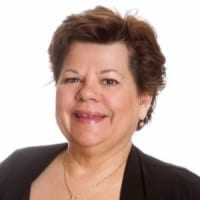
Lora Cecere, Founder and CEO of Supply Chain Insights, is widely recognized as a global supply chain thought leader and recently received the 2020 Women in Supply Chain Influencer Award. Today, Lora has nearly 320,000 Linkedin Followers and is known for her high-value point of view and research geared at helping early adopters seeking first mover advantages through innovative supply chain strategies and market execution.
Hosts
Additional Links & Resources
WEBINAR- State of the Supply Chain Report – Priorities for Building Resiliency in Your Supply Network
